#and when there’s three genders being thrown at you that change in various ways based on the sentence it’s very important
Explore tagged Tumblr posts
Text
So my sister at the begining of this year got me and my brothers to do Duolingo. Me, being an idiot chose to do four languages; one being Czech. I officially said screw it, I’m not learning this one Duolingo, I’ll learn it elsewhere. Why you may ask, because Czech is a gendered language with a declension system that Duolingo refuses to teach or have notes on any of it, nor even basic sound practices. So I’m trying to explain how stupid it is to not teach what each case is used for, but also how to make the words fit their proper case to make the sentence. My family, “No, Duolingo would teach it earlier if it was necessary.” Knowing cases to make sentences and how letters should be pronounced are a very basic function of learning a language.
#Duolingo#it’s not a bad practice tool#and as I have said before it’s the best free language learning app#but good lord I’m deep in the French lessons and they just started doing gender agreement which is not a hard concept#it’s just irritating getting told that case declensions aren’t that important when they are#and when there’s three genders being thrown at you that change in various ways based on the sentence it’s very important#and I’m still trying to keep my vowels shortened when I’m doing the Italian lessons causw my mouth is used to Spanish vowels in words
1 note
·
View note
Text
My System’s Experiences: switching hosts and a disconnected past
It took years before we realized that the complete personality shifts we experienced at various points in our life was us switching between hosts. Before I was host (or even existed at all), there was Lucas; a few years before him, Eren. The earliest host we know of is 4 years old and was the host during our preschool years. It seems inconceivable that we wouldn’t know - but as a system that has no amnesia, experiences the world as “different people sharing a single consciousness”, experiences switching less like “stepping back” and more like changing perspectives, and exists in a place between median and multiple, these changes disguised themselves as life phases.
It made sense to us that being 16 would feel different than being 12, and we were aware that changing over time was a normal experience for children and teenagers. Sure, it seemed weird that as a child we were definitely a girl, during our early teen years we were likely nonbinary and during our late teen years we were a trans man - it was never really clear to us WHY we changed so much.
That is, until I realized that we were plural, and that we have always been different people who simply passed the mantle of Host along like some kind of hereditary monarchy. It seems somewhat obvious now - the fact that I used to say things like “back when I was Lucas”, that I didn’t have childhood memories of being a therian, and that each “life phase” involved a completely different personality, set of interests, and sense of self were all signs. Even my dad is prone to saying things like “You’re a completely different person now than you were when you were 16″ (I really get a kick out of the double meaning). But it wasn’t until I started to consider that I (we!) might be plural that the truth about our past hosts came out into the open.
Our obliviousness can be accounted for by another issue: the specifics of how we switched hosts. I like to compare the scenario to mitosis - one member gradually becoming two. It would take months before the two people were distinct, at which time the new member would usurp as the new host and the previous one would go into dormancy. Because it’s so gradual we can't pinpoint an exact moment when each switch happened, and it's sometimes hard to clarify whether a past event happened to one member or another.
I’ve started to refer to the mid-mitosis host as “proto”, thqe in between of Lucas and me being “proto-Blue”. Lucas was a trans man and emo, and I’m a mascfem nonbinary person who isn’t particularly alt - our mid-self was still trans but more gender nonconforming and no longer 100% male, and they still listened to emo and rock music but had moved away from the clothing style. This "self" doesn't exist in our system as an actual person - it was simply an in-between stage. This host change (and all the others as far as we can tell) was fluid and not at all a sudden switch.
When Lucas returned from dormancy, it was chaos. He had been functionally asleep for three years - in the meantime, I had broken up on bad terms with his best friend/girlfriend, socially detransitioned (he had worked hard to come out as a trans man), and thrown away most of his old clothing and possessions. Trump had even become president, which was honestly one of the most overwhelming things. And he suddenly had to confront the fact that we were plural, that he had not always been host, and most of all that he had lost several years of (what he thought was) his life. I had to confront similar issues, but for me it was gradual while for him it was all at once.
Since then, several of our past hosts have reawakened - but not all. There are large unaccounted for periods of time, presumably involving still-dormant system members. It’s difficult to talk about our/”my” past, because when referring to things that occurred between the ages of 15 and 17 I can usually say “Lucas did X”, but how do I refer to the incidences that happened to unknown hosts? On top of that, due to years of assuming we were one person and each of us claiming past events as “my past”, it’s not that easy to say that X event belongs to one person and Y belongs to another. Things that happened to Eren while she was host often feel just as relevant to me, personally, as things that happened while I was host.
This all creates a confusing communication barrier, and risks creating conflicts between members - for example if I say “I got a perfect score on the reading portion of the SAT when I was 12!” would that be unfairly taking credit for Eren’s accomplishments, or simply describing an element of our shared narrative that feels relevant to me? There has been at least one conflict with another member where I was accused of selectively taking credit for their good deeds and accomplishments while disowning failures and negative actions - I believe that was a misunderstanding, but clearly it’s complicated.
I, as an individual, have only existed for four years. It sounds strange to say that as a 22 year old, but it’s true. This sometimes makes it alienating to spend time in identity-based communities like the therian, otherkin, transgender, and other LGBTQ communities. I once attempted to join a trans Amino, only to find that I was required to explain my “trans self discovery story” in an introduction post - it wasn’t even optional! How do I explain “In our teenage years, Eren felt disconnected from gender but couldn’t put it into words. Then we learned about trans people, and Lucas discovered over the course of a few months that he was a trans man. I knew I was nonbinary from day one (four years ago), though figuring out the details has taken a few years.” To someone who knows nothing about plurality, it’s incomprehensible.
Of course I could have made something up or oversimplified things, but at the time I was on Amino to discover my truth, not hide my truth. Due to the “born this way” narrative, saying something like “I identified as a trans man in my teen years, but later on identified as nonbinary” would imply that our experiences as a trans man were fake or the result of a confused misnomer, when they were very real. Directly undermining our experiences and our reality for the sake of community really sucks; I quickly left that Amino.
I’ve had similar issues in the therian community. I first realized I was a therian/nonhuman before realizing I was a member of a plural system, which caused all sorts of confusion for me. I joined the Therian Guide forums and learned from their posts and resources that “If you didn’t have therianthropy related experiences as a child, that means you’re just a confused human who’s been influenced by the internet and is having a wishkin phase." I wanted to believe that wasn’t the case, but the argument made sense and I had no counterargument to make against it and no way to explain why that rule wouldn’t apply to me.
Even now it sometimes feels alienating to encounter online threads and posts centered around the question “What signs did you experience as a child?”. I know that other people’s experience don’t invalidate mine, and vice versa, but it still sometimes makes me feel out of place. Rationally I understand that nonhuman experiences are highly varied and that's okay! - but insecurity isn't rational. I’m still acclimating to the idea that as a pluran my nonhuman experiences will probably never be the same as a “stereotypical” otherkin or therian (if such a thing exists).
I went into this essay expecting to write a short post about how my lack of childhood/teen years has sometimes caused me to feel alienated in the therian community. But as I was writing I realized I had a lot to say about my system, and felt compelled to change angles and truly discuss our host history. It might be a bit random, but I hope that at least some people will find it interesting.
30 notes
·
View notes
Text
Butch’, ‘dyke’, you name it… Why should female footballers face this ongoing derogatory labelling?
Women’s football is currently enjoying increased media coverage and an increase in wage for those playing in the blossoming professional Women’s Super League. But this hasn’t always been the case… Football for women was banished by the Football Association in 1921, deeming the game to be unsuitable for women. The Women’s Football Association was established in 1969 overturning the ban on women playing football. Now there being 1.2 million female football players in Europe. The question is, with this rise in popularity of women’s football and women’s sports now being described as a “safe sporting and social space for lesbians” by educators, why do results from a survey by Paddy Power and GAY TIMES suggest that 69% of participants believe that the FA should be doing more to prevent homophobia?
The image problem
Traditionally, females have been discouraged from participation in football by threats to their sense of themselves as ‘normal’ women, often protecting their identities. This idea of a normal woman was reinforced by Sepp Blatter in 2004 stating that women playing with a lighter ball creates a more “female aesthetic”. Does this signal the type of female footballer FIFA prefer? Femininity is foremost, often used as a code word for heterosexuality.
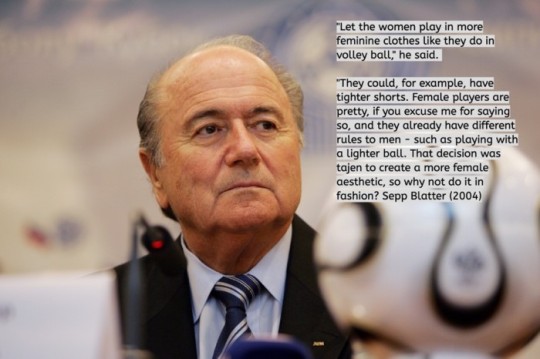
The emphasis on heterosexuality and femininity often perpetuates the myth that the LGBT community are dishonourable and that females should abide to Sepp Blatter by appearing and behaving in feminine ways. The Stonewall Chief Executive summarises the issue as “reverse homophobia” - “If a woman is unusually good at something [such as a sport] she must be a lesbian…if a man is gay, he can’t possibly be good at sport because he’s not masculine enough.”
Magdalena Eriksson, Chelsea and Sweden International describes her experience as coming out as accepting, but states “I wouldn’t have got the same reaction if I didn’t have long blonde hair”. Her fellow international teammate Nilla Fischer however had a harsh response, with attracting a large amount of abuse for being openly gay and having a more masculine presentation. Why should women have to protect and hide their lesbian image?
Commentators of women in sport have noted how various strategies are employed by female athletes to emphasize their heterosexuality and disassociate themselves from the lesbian label. Lou Englefield, director of Pride Sports and campaign director of FootballvHomophobia confirms this in her experience of coaching girls, “I saw on many occasions teenage girls being called names by teenage boys: ‘Oh you’re a man because you want to play football’. Words like manly and butch were thrown around. The policing of gender and policing of women happens from a really young age. And in reality, the reason girls gave up football was because of gender stereotypes. They didn’t want to be seen as butch or athletic or masculine because they wanted boys to fancy them.”
The Homophobia Problem
Homophobia is ultimately still thriving in society, especially on social media platforms. Andre Gray used the hashtags “burn”, “die” and “makes me sick” when addressing homosexuality. A Manchester United supporter claimed on twitter that Manchester United supporting stonewall, a charity to help tackle such issues that still exist within society and the LGBT community, “endorses immortality.”

Shockingly, at a Proud Canaries event which is an event held annually at Norwich City, when the LGBT Proud Canaries were doing a lap of honour a supporter exclaimed "don't clap them, shoot them".
Stonewall found that 43% of the LGBT community believe that public sporting events aren’t a welcoming space for themselves. New initiatives have been created to abolish this 43% figure such as the Stonewall Rainbow Laces campaign and the FootballvHomphobia Campaign. But most recently we have seen the Lesbian Visibility Week, a week targeted at LGBTQ+ women, to unite and support lesbians in all domains. The DIVA Media Group who created the national campaign, aim to “celebrate lesbians and show solidarity with all women in our community”. In April 2020, Sky Sports report on this fantastic campaign stating, “All this week, Sky Sports has been sharing stories to mark the first-ever Lesbian Visibility Week, a new awareness initiative celebrating women-loving women in the LGBT+ community.” Sounds great, finally a breakthrough to support females on their inclusion journey. But is this actually the first ever Lesbian Visibility Week?

Females in football are supposed to find their pride, but how is this possible when a British subscription television channel have missed this Lesbian Visibility day for the past 12 years?
Time for Change?
Pride in Football, an umbrella organisation that helps 46 affiliated groups focusing on improvements in areas, is helping to make a change. Aspects include Steward Training, Incident Reporting and Signage as well as generally promoting the visibility of their clubs’ LGBT fan-base via Banners displayed at grounds or club presence on Pride Parades.
Gilly Flaherty, West Ham Women’s Captain, stated on BBC Three documentary Britain’s Youngest Football Boss; “we get quite a lot of openly gay football players, but I think we get quite a lot of openly gay female fans as well, it's just seen as like... it's just very inclusive.” This adds to the 37% of heterosexual football fans think that football is becoming a safer social space for players to come out as LGBTQ+. Are times changing? Since 2014 when England female football captain Casey Stoney came out as lesbian stating that “being gay isn’t a choice, it’s something that just happens”. It was an ultimate moment for lesbians in football. Contrary to her being “frightened of being judged, frightened of what other people might say.”, this was soon diminished through the support of her team, but also the women’s football community.
youtube
The homophobia of football reinforces this homosociable functioning of the teams, promoting the meeting of potential partners in a ‘secure’ place. Danielle van de Donk and Beth Mead are a prime example of the meeting of potential partners with the two Arsenal teammates having chemistry both on and off the pitch since 2017. Love can also end up in yellow cards when it comes down to challenges, in 2019 Danielle drove at the referee after her girlfriend Beth was tackled hard by Stringer.
youtube
Stepping into the mainstream for lesbian women footballers can be increasingly dangerous with fears of women’s football mirroring that of the men’s game. Educating fans and generally just those involved in sport is what Eric Najib, a former player and now manager of Stonewall FC, stated to enable a change in people's perceptions. A starting point could begin by pointing out the homophobic behaviour that exists within women’s football, to demonstrate that this exists on many levels of the game from grassroots right through to the Women’s Super League. The Football Association needs to shift this atmosphere in a positive direction both on and off the field to raise visibility by publicising LGBTQ+ events, forming partnerships or providing funding for teams.
As stated by Aneesha Dewshi, founding member of Romance FC, “It’s really important to listen to the LGBTQIA+ community and let them share their experiences, so you can empathise and understand. Educate yourselves on the history of Pride, the marches, the movement, and the struggle for basic human rights. If you ever hear any homophobic abuse, stand up and call it out.”
N0779476
References
Crosset, T. W. (1995). Outsiders in the clubhouse: The world of women's professional golf. Sunday Press.
Halbert, C. (1997). Tough enough and woman enough: Stereotypes, discrimination, and impression management among women professional boxers. Journal of Sport and Social Issues, 21(1), 7-36. doi: 10.1177/019372397021001002
Hargreaves, J., & Females, S. (1994). Critical issues in the history and sociology of women’s sports.
Harris, J. (2005). The image problem in women’s football. Journal of Sport and Social Issues, 29(2), 184-197. doi: 10.1177/0193723504273120
Pfister, G. (2015). Assessing the sociology of sport: On women and football. International Review for the Sociology of Sport, 50(4-5), 563-569. doi: 10.1177/1012690214566646
7 notes
·
View notes
Text
I RISE FROM THE DEAD
Hey what’s up motherfuckers, believe it or not, I’m back with some actual new writing pieces! They’re all bits that have been sitting on my computer, waiting for me to publish them for months, and now I finally have! Two Camp Camp pieces, and one for Be More Chill. I’ll be making individual posts for each with the links to them on Ao3, but if you want to just look now, I’ve got the same username there as I do here. Also, if you reblog the posts I make on them, I will love you forever.
Onto other news, I’m working on a shit ton of stuff behind the scenes that might come out sometime in the vague future! For one, I’ve got two unfinished camp camp oneshots, all of which are pretty long so far. I’ve got a Sally Face oneshot that may become its own series in the works. Also, I have a Marvel and Camp Camp crossover multi-chapter, which I promise, isn’t as weird as it sounds, and I’m really excited to finish it. I’m editing one of the fics that is part of my “snapshots of three intertwining lives” series so that it is no longer terrible and in first person. No shade to anyone who does write in first person, it’s just something I used to do but now hate. Also for that series, I’ve got an idea for two prequel pieces, one of when David and Gwen first met, and another that’s just basically fluff about those two high school nerds being super emo in the late 2000′s with a splace of “what the fuck is gender” thrown in. I’ve got a vague idea about a CC mental hospital AU called “Campbell's Home For Unwell Children” though I’m not sure if that’s ever going to become a thing.
AND LASTLY BUT NOT NEARLY LEASTLY
A DEFINITE NEW CC SERIES IS COMING AND I AM SO EXCITED TO REVEAL IT TO YOU
The name is Heroes & Villains, and each multi-chaptered piece will be based on an album. The first one is called hopeless fountain kingdom and it’s going to have sixteen chapters! That will make it way longer than anything I’ve ever written! I’ve been on and off working on it since last summer. It’s... well, it’s hard to describe. I suppose it’s kind of dystopian AU? It’s not exactly a superhero thing because no one has powers, but, well, you’ll see. Here’s the summary, or at least what I have written, it might change.
“In a not entirely unrealistic dystopia far, far, away… the fight of good against evil rages on, like it does every day. Those who are good seek to keep things the way they are, to fight so that everything stays as perfect as it is. Those who are evil seek to change things for their own benefit. To overthrow those in power and put into place their own government, where they will rule over everyone and cause pain and suffering. Heroes and villains fight every day to keep the balance intact. Every young hero hopes to bring good to the world, and every hardened villain hopes to bring it down. Or at least, that’s what they say.
This is the story of a kind villain, an invaluable sidekick, a cruel hero, an obstinate apprentice, and various other contradictions.“
So that’s everything going on with me. Now that poetry slam season is over and I no longer have to go to workshops three times a week and practice on weekends, hopefully more writing will be done!
#life update#well more of a writing update#i'm seriously so excited about heroes & villains#come into my inbox and ask me shit about h&v and i will literally die for you#Camp Camp#camp camp fanfic#be more chill#sally face#fanfiction
2 notes
·
View notes
Text
ASOIAF Fic Recs
Had an anon ask for some recs and um... yeah, I decided to post it separately because, I may have, um, gone a little overboard. Lots of different pairings involved below.
Yeah.

Born-a-Girl Fics
I have an enormous love for these stories, as it's so much fun to see how the various dynamics of the Starks, and indeed, all of Westeros change when the one thing Rhaegar was wrong about in canon becomes something he was right about after all.
All of Madrigal-in-Training's stories on AO3, her profile being located here. I'd read a few born-a-girl!Jon stories before I started reading her work and had enjoyed the genre, but after I read her stuff, I damn near became obsessed. (Did I say ‘near’? I lied, there’s no ‘near’ about it - I did become obsessed. I admit it.) Most of her fics are WiPs, but she updates fairly frequently, so her stories are definitely worth following.
The Acquaint the Flesh series, by Author376. In a Westeros where Soulmates are bound and Marked by the Gods to bind Houses together and pay blood debts, Lyarra Snow and Oberyn Martell are about to get a shock. The born-a-girl!Jon story to end all born-a-girl!Jon stories. I have re-read this series at least a hundred times and I still squee my head off every single time. The gods throwing together two complete opposites, an OFC who is so much fun, a Frey we can actually like, and that's barely scratching the surface! The series is also a WiP, but don't let that put you off.
And I'm calling for my mother as I pull the pillars down, by dwellingondreams. Elia Martell becomes the Lady of Casterly Rock due to her mother's machinations. Robarra Baratheon becomes a princess due to the Mad King's obsession with finding a bride of Targaryen blood. The seeds of rebellion are planted all the same. JFC, who knew that Elia/Tywin could be possible? Well, in a world where Robert Baratheon is born Robarra Baratheon and is quickly snatched up to be Rhaegar's wife, it seems that it is. Of course, this switch up does not prevent Aerys and Rhaegar from setting the world on fire because they're either insane or obsessed with prophecy or both. Still, the affects of this change-up are really fun.
empire (i'm building it with all i know), by willowoftheriver. Fem!Jon Snow is discovered to be a Targaryen as a chld, triggering an unfortunate marriage. Femslash ahoy! Viserys is still a nutjob, though. Words cannot express how much I love this two-shot series.
Oh, mercy, I implore, by SecondStarOnTheLeft. She collects friends with the same ease she conceives healthy babes - so her goodmother tells her, something soft and wistful in her sad eyes, and Berta cannot disagree. A different crown princess, and a different world. Jeez, but I do love these gender-flipped fics. This one is fun too. Girl!Robert isn’t taking any crap from Rhaegar, no sir.
Time-Travel or Fix-It stories
Three Tully Daughters, by ProcrastinationIsMyCrime. Conflicts for the Iron Throne before the darkest hour led to the defeat of the living on Westeros. Jon must have known the fate of men for he’d drugged and snuck his sisters onto a ship set for Braavos. That had been the last time either Stark daughter had seen Jon. Upon Arya's death, Sansa encounters a Dornish bachelor in Braavos who by all rights should be dead. Armed with knowledge held by no other, she would sail for Westeros and save her home; for she was in the reign of Aerys II Targaryen. There would be less chaos for Littlefinger this time. Joffrey would never be born if she could help it. Cersei would never sit the Iron Throne. A time-travel story that actually doesn't solve the insertion process by having the character in question (Sansa, in this case) be reborn into a new family. A very ASOIAF twist! I was a bit wary of the Sansa/Jaime pairing at first, but in this story it works, OMG it works. Sheer brilliance. WiP.
Valar Botis (All Men Must Serve), by sanva. “But you, Lord Snow, you’ll be fighting their battles forever.” Ser Alliser Thorne Every time he died his last in that life he awoke again in another at the exact moment of Ghost's birth. Jon Snow is the King of Groundhog Day. What more needs to be said? ;)
Aegon the Unlikely-era Fics
You and I conspire and split the ground, by SecondStarOnTheLeft. Grandfather's boots are next, soft and worn where Father's are always polished to gleaming, and then Grandfather's hands, and then his face. He looks tired, under his beard, under his crown, but he is smiling when he reaches under the bed to her. "My sister Daella used hide under her bed with her dollies, when we were small," he says, his voice very quiet and very gentle. "Will you come out, poppet? Your grandmother and I would like to speak with you a little, if we may." Wherein Aegon the Unlikely actually doesn't wash his hands of his kids and their obsession with prophecies, wherein Rhaella Targaryen is the ultimate sweetheart who deserves Nice Things, and wherein Rhaelle Targaryen is a total badass. I have a huge love of the family of Aegon the Unlikely and their antics, and this fic is a favorite of mine.
Behind the Ballads, by Ramzes. Jenny of Oldstones and her prince were a favourite theme for singers, their romance making them larger than life. What were they like in life? I absolutely love this behind-the-songs look into the life of Duncan the Small, and seeing just WTF he was thinking. Utterly brilliant. I'd also recommend you look at Ramzes' other work. She has at least two series about Rhaelle Targaryen, one that covers the same time frame as this one (but is not connected to this story), and one that is a series of AUs featuring what might have happened if Rhaelle had lived to the era of Robert's Rebellion. Definitely worth a look.
Coins, by ariel2me. QUOTE SWAP: Rhaelle Targaryen + “What sort of father uses his own flesh and blood to pay his debts?” Oh, the heart. It breaks.
Crack Fics
Ned Stark Adopts His Way Through Westeros, by witchbreaker. "This isn't my fault." And other lies Eddard Stark tells himself. A short fic inspired in the comments of Acquaint the Flesh, it is probably one of the funniest stories ever, not to mention adorable. Also, read the comments, as there is a hysterical little extra piece in there dreamed up by a responder and the author. The best.
A Helpful FAQ, by Siamesa. In a world where Renly Baratheon accidentally spent the War of Four Kings on vacation in Dorne, surviving King Stannis's small council meetings takes a clear understanding of people and politics. Luckily, he's here to provide both... or so he thinks. Ohdearlord, this one still makes me LMAO, even after having practically memorized it. Hilarious.
The Dragon and the Maiden, by modbelle. Viserys brings the Stark girl Joffrey's head. He's surprised by her reaction to this. He'd expected her to be upset, but she seems quite delighted by this. What a strangely charming creature she is, even if she is a Stark. Yeah, this one came out of left field for me, but holy crap who knew such a thing could somehow work?
AU Fics
Desert Wolves, by bluegoldrose. "But Ashara’s daughter had been stillborn, and his fair lady had thrown herself from a tower soon after..." ~Ser Barristan Selmy What if Ashara's daughter lived? What if Ashara Dayne raised Jon Snow alongside her own bastard? What if Ned Stark never stopped loving Ashara even when he fell in love with Catelyn? The bastards of Lord Eddard Stark are the Desert Wolves. The true born children of Lord Eddard Stark are the Winter Wolves. Their lives are lived apart until the tides of war see fit to bring them together. Ashara/Ned is a ship that I cling to, and one that I am always on the lookout for in regards to fics. This one is one of my favorites, particularly since neither Catelyn nor Ashara is demonized. It's a WiP, and hasn't been updated in a while, but I'm still hopeful that the last few chapters will eventually be posted.
Winter's Crown, by orphan_account. What if Rickard Stark had other ambitions? Or, a history of the Starks, from Torrhen to Rickard, in a world where they spent two and a half centuries building up their wealth and waiting for the perfect moment to declare their independence. A twist/expansion on all that we learned from World of Ice and Fire. Very interesting.
Lightning (Struck Before Me), by sanva. “Send the letters,” her voice came out clear, unwavering, resolute, “request House Stark, Arryn, and Tully send representatives to treat and bend the knee.” Wherein Jon discovers something long hidden deep in the crypts of Winterfell and everything changes. This fic is part of a series, and I'm not sure if any more will be posted for it, but this is still fun to read on its own. A mix of book and show.
Dragonstone, by Danivat. After the death of his brother, Robert Baratheon needs a loyalist Lord on Dragonstone. He also really wants back in Ned's good graces. Or, the Game goes on after the Rebellions. The Starks still won't play, but everyone is playing the Game all around them, and Jon Sand has somehow become an important piece. Robert Baratheon, unknowingly, is the Targaryens' greatest asset. This one could fall under either the category of AU or Crack, or perhaps both. There are quite a few divergent points, and they are listed in the notes at the start of the story so you will not be hopelessly lost. Very fun.
One Day (Is Now and Forever), by SimplexityJane. Rhaegar takes Lyanna to Dragonstone, not Dorne. This story had the potential to be a complete and utter epic, but it also stands wonderfully as it is.
Kingdoms at War, by deathwalker. What if Ned Stark wasn't executed at the Great Sept of Baelor? Instead, what if, he had been removed from Kingslanding before Joffrey could give the order for his head? What impact would this have had on the Game of Thrones? I've called this fic a "small step to the left" in the past, and it is so much fun, particularly since it’s based on a question we have all asked ourselves. Though, be prepared - this is a long one.
The Duel, by Aiur. The duel between Robb and Joffrey goes differently than anyone predicts. Be prepared to shed a few tears here. That’s all I’m sayin’.
The Dragon’s Queen, by orphan_account. Aerys married his eldest son off to Elia Martell immediately after Viserys's birth instead of sending his cousin to Essos, and she bore Rhaegar three children before dying in labor with the last. Rhaegar is therefore a young widower when he crowns Lyanna Stark the Queen of Love and Beauty during the tourney at Harrenhal, and Aerys decides that his son will marry the lady. Here are seven letters Lyanna Stark sent in another world. I really love epistolary stories, and this one is so interesting. I wish there was more of it, because it hints at so much more. Very fun.
But you are of the North, by LuminaCarina. Ned Stark doesn’t visit from the Eyrie. Brandon, Lyanna and Benjen adjust. Very interesting idea.
The Squire of Dragonstone, by EmynIthilien. Instead of joining the Night's Watch, Jon travels south to squire for Stannis on Dragonstone. Roughly spanning the events of A Game of Thrones through A Storm of Swords, Stannis and Jon investigate the royal incest mess, fight battles in and out of the courtroom, attend a joyous wedding, and come to rely on each other more than they ever expected. I call this one “Sherlock!Stannis and Watson!Jon”. A great trilogy of stories where things are actually taken care of, and in a legal-ish way!
The Lady of Storm’s End, by Sarah_Black. Sansa was supposed to marry someone brave, gentle and strong. Lord Stannis Baratheon was not what she had in mind. Or: The one where Sansa is never betrothed to Joffrey, never loses Lady, and only comes to King's Landing to attend King Robert's wedding feast. The king is marrying Margaery Tyrell as Cersei's treason has been exposed and dealt with. But things are never simple when the Iron Throne is in desperate need of heirs and wildlings threaten the peace... Another pairing that is a bit weird, but the author makes it work beautifully! The story is also inspired by The Squire of Dragonstone listed above, though it is not necessary to read it. The author explains anything you need to know in the opening notes.
broken lovers series, by soapboxblues. wherein rhaegar wins the war, and jaime manages to keep his head by taking a stark for a wife I never knew Lyanna/Jaime could somehow be possible, but this series proved it to me. There are so many wonderful things about this series, I can’t even.
Kindness, Not Fear, by SecondStarOnTheLeft. In the wake of Daenerys' triumph, Sansa comes to King's Landing. Multi-POV post-series short fic. An older story, but one that I still love to pieces.
The Lion Queen, by Laine. I am the first of my kind, and the bards will sing of me for centuries after I'm gone. Ned Stark takes the Iron Throne, and he intends to share it with his Queen. Yeah, pretty sure I was going to hell for liking this pairing, but nonetheless, I do love it. Plus, a non-crazy Cersei. How often do we see her?
I Fear No Fate (For You Are My Fate, My Sweet), by vixleonard. Myrcella Baratheon always knew she would be married to a man for a political alliance. What she did not know was that she was going to be left in the North at 8-years-old to one day become the wife of Robb Stark and just how much it would change her life. I think this was one of the first ASOIAF fics that I bookmarked, and I still come back to it from time to time. A classic.
20 notes
·
View notes
Text
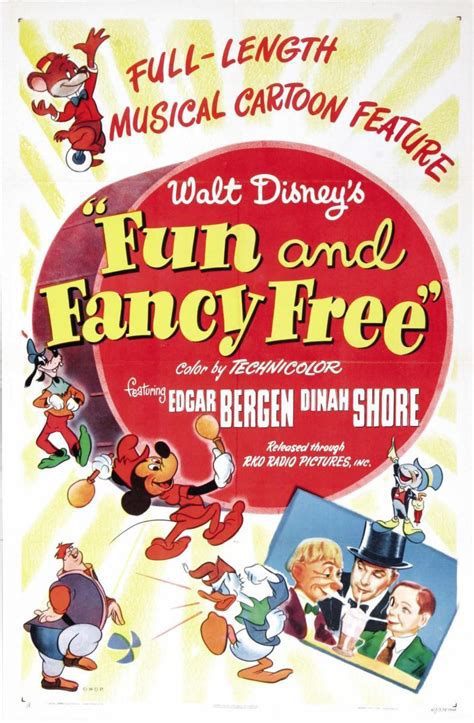
Sigh, poor package features, why does nobody like you? Why is it that internet reviewers and Disney critics and fans always seem to give you the shaft? Is it the minimized animation budget? The effort towards story and character that was forcibly driven towards wartime propaganda over actual films? The deviation of a traditional three-act structure in favor of a string of unrelated shorts woven together by a loosely connecting theme or narration? Well in a manner of speaking, it’s a combination of all three. For one thing most people I know prefer to sit down and enjoy a movie that has one uninterrupted story. And yes there are a good number of films, great ones, in fact, that play around with how the story is presented, but as of writing there’s yet to be an audience or even a filmmaker clamoring for an animated equivalent of something like Pulp Fiction.
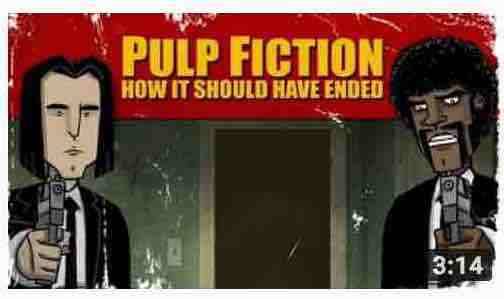
In theory.
And of course the major factor in all this is the time period in which these movies were made. I’ve already talked about this in my review of The Adventures of Ichabod and Mr. Toad but for those not on the uptake, THERE WAS A FREAKING WORLD WAR WHILE THIS WAS GOING ON. Disney couldn’t afford to do something on the scale of Pinocchio or Fantasia or even Dumbo because his best animators were A, drafted out to fight, B, struggling to work with what little resources they had when the government was also pushing them to remind the public to buy bonds, or C, kicked out because of the disastrous animators’ strike of the early ’40’s. Projects with linear narratives that were considered big scale like Alice in Wonderland, Peter Pan, and Lady and the Tramp were put on hold for virtually a decade. The best they could do was package a bunch of fun little shorts together because releasing them individually wouldn’t bring in as much desperately needed revenue as a full feature would.
And who says these shorts are bad? I don’t! At worst they’re fluffy little time fillers, but at their best they can hold their own with the big leagues of Disney animation. Again, going back to my Ichabod and Mr. Toad review, Disney’s Legend of Sleepy Hollow is the first thing I and a good many others think of when the story comes to mind. I also have the advantage that a lot of people today sadly don’t in that I grew up with virtually all of the package feature shorts in one way or another, either through individual VHS releases or on the Disney Channel as part of shows like Mouse Tracks, Donald’s Quack Attack, or the DTV music videos. It would be years until I saw them all as they were meant to in order as one full film, but blame Disney themselves for that. It’s a Catch-22 situation when it comes to their forgotten films; Disney sees there’s not much public interest in these old movies and so holds out on releasing them for as long as possible, while the public notices Disney never getting around to releasing these movies and think it must be because they’re not worth their time. So nobody wins and we all get smothered under another avalanche of Frozen dvds.
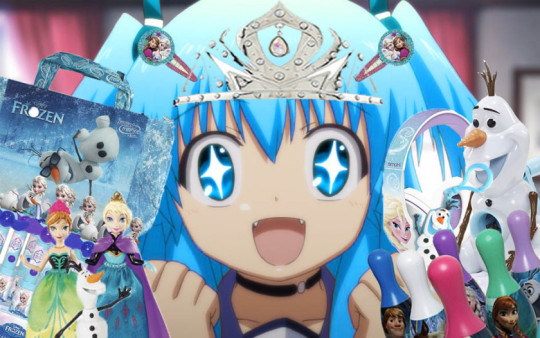
“FROZEN??!!! FROZEN FROZEN FROZEN!!!!!”
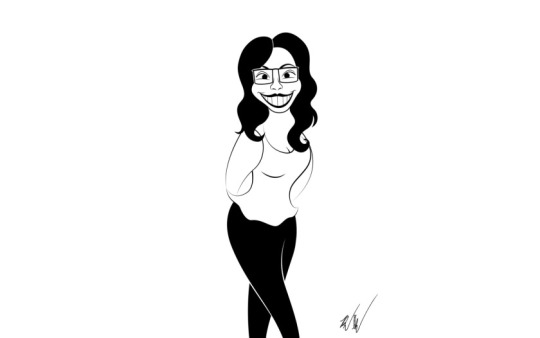
“No! Go home! You’re drunk!”
As of writing there’s only two – count ’em, TWO – Walt Disney Animated Classics that have yet to be released fully on Blu-Ray, and they’re, you guessed it, package features. “Make Mine Music” and “Melody Time” to be precise. You wanna know how old the dvds for them are? The advertisements that play before the main menu are for The Tigger Movie and The Little Mermaid 2. That’s THE YEAR 2000. NEARLY TWENTY YEARS AGO. And the only reason why today’s feature “Fun and Fancy Free” got on blu-ray is because the higher ups at Disney decided to combine it with Ichabod & Mr. Toad. So now we have a package blu-ray of two package features (three if you count The Reluctant Dragon which is also on there). It’s Package-ception, if you will. BWOMP.
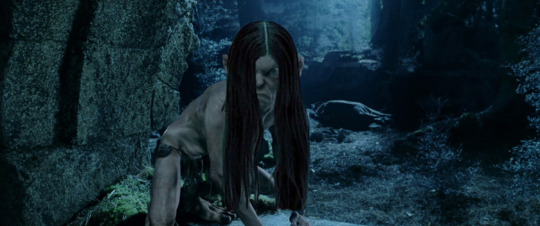
“She’ll get around to the actual review any minute now, folks.”
Back to the topic at hand, World War Two was finally winding down and the country was in a state of elation from having their boys return home after tearing the Axis powers a new one. Walt Disney had ideas for two full-length features, one inspired by a short story by Sinclair Lewis (I’d say based on but it barely resembles the tale that’s printed) and the other a take on Jack and the Beanstalk starring Mickey Mouse. Neither of them were able to get the treatment he wanted due to story issues and because the first thing to go during wars and Republican administrations is money for the arts. So he compromised by bringing them both into one movie with each of them sharing a half. Looking back I would have loved to have seen what an hour-length or even 75 minute version of Mickey and the Beanstalk would have been like because for all its flaws I enjoy it that much, and I’m tired of holding my breath waiting for Disney to do SOMETHING with “Gigantic”. Bongo on the other hand, I can’t see as anything other than a short, but that’s not a jab at its quality. Yet how do both stand up as a feature? Does it live up to what its title promises? Let’s find out.
After the main title song (which sounds like the opening theme of a variety show from that decade), we get Jiminy Cricket from Pinocchio going about his merry way in somebody’s house singing “I’m a Happy Go Lucky Fellow”. This was actually a deleted song from Pinocchio meant to be sung by Jiminy, so it’s good to hear it sung here. It proves the old adage about ideas at Disney is true; things are never thrown away, just put aside for someone to find and use later.
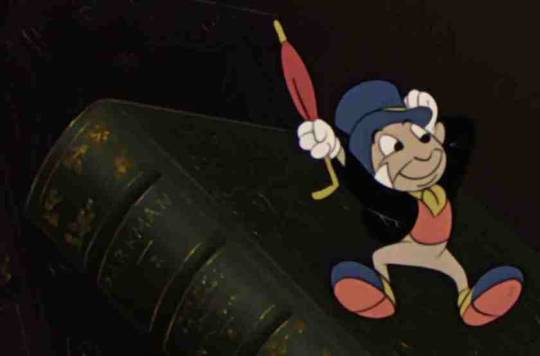
Wait, that book, is that…Darkman?! Whoever owns this library has good taste.
After startling a goldfish who resembles Cleo from Pinocchio, Jiminy concludes the fish suffers from too much anxiety and tries to reassure her by showing her a newspaper full of headlines that amount to “doom imminent, we’re all gonna die” (ah, the New York Post never changes). He explains that everyone’s been playing Nostradamus for years saying the world is going to end tomorrow but you can’t go around thinking like that. Que sera sera, whatever will be will be, you get the idea. I get where Jiminy’s coming from, I truly do, but it’s hard to back up his philosophy when he’s using real current problems as examples to ignore.
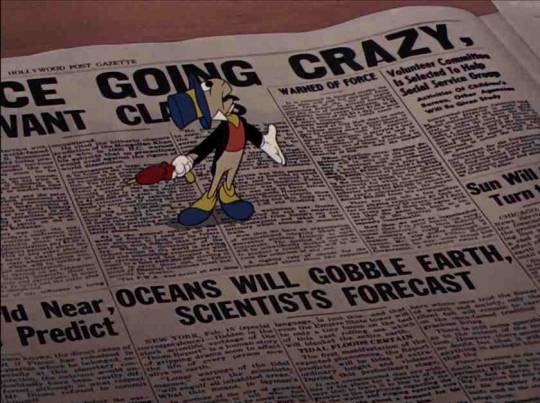
See what I mean?
Jiminy runs into a hungry cat and hides out in a child’s playroom where he bumps into a sad-looking doll and teddy bear. Assuming that all toys must be like his buddy Pinocchio he takes on the role of conscience yet again and tries to help them with their problems.
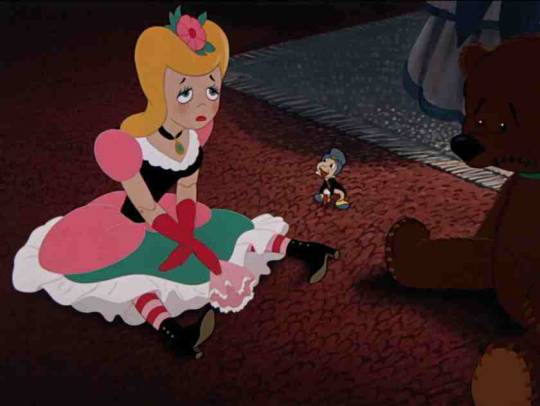
“Lemme guess, you’re wishing to become a real girl, right?” “No, I’m just disheartened by the extreme gender stereotyping that are enforced through children’s playthings and the psychological ramifications that are passed down with every generation.” “Swell!”
Jiminy’s prognosis is that these two depressed toys are in desperate need of some music and fun to cheer them up. So he whips out a record of Dinah Shore reading and singing the story of Bongo the Bear.
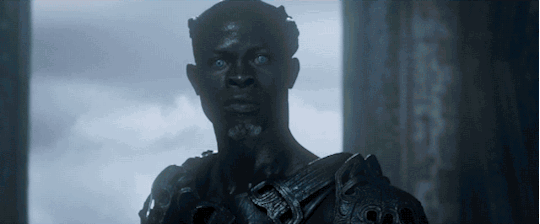

“The main character of the piece we’re about to watch, obviously.”
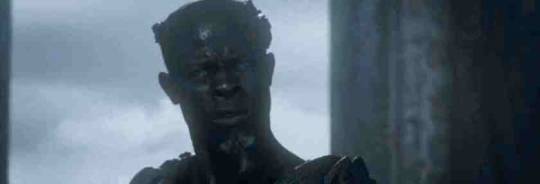
“No, I mean who the hell is Dinah Shore?”

“Ah. Gotcha.”
Dinah Shore was a popular big band singer of the 1940’s and one of the first female artists of her day to make a successful solo career for herself. She appeared on multiple popular radio shows, was a Chevrolet spokeswoman, won a total of nine Emmys for her various television shows and specials, and was romantically linked with stars ranging from Jimmy Stewart to Burt Reynolds. And remember Pee-Wee’s Christmas Special? She’s the woman who keeps popping in singing an endless rendition of The Twelve Days of Christmas that goes over the end credits.
This wasn’t Dinah’s first contribution to a Disney package film as she had lent her pipes to the titular song of the “Two Silhouettes” segment in Make Mine Music the year prior. She does fine as the narrator of this section, though there’s one teensy problem I have which I’ll get to eventually.
The record begins with Dinah Shore saying this is a story about three bears.

No, Ms. Shore spells it out for us – a girl bear, a big mean bear who wants to be her mate, but mostly of Bongo, a bear born and raised in the circus who’s the star of the show. Had this story turned out the way Walt originally envisioned, it would have been something of a crossover-sequel of Dumbo with the titular elephant and the catty matriarchal troupe of pachyderms providing cameos. I assume this fell through due to Dumbo’s salary demands being a little too far out of Walt’s price range.
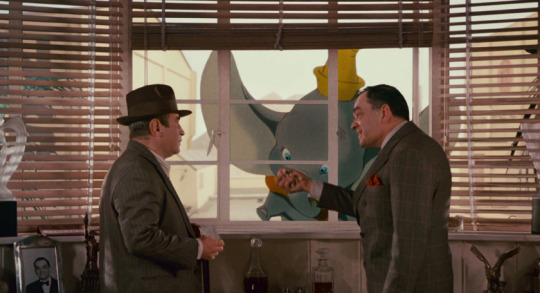
You know the war’s hit you hard when working for peanuts puts a crunch on your budget.
Bongo puts on his impressive act of juggling on a unicycle while on a high wire before making a spectacular dive. But we’re also privy to what happens when the show is over; no sooner does he back out of the tent from his curtain call than he’s manacled, hosed down, tossed into a cage and hauled off to the next state for a literal rinse and repeat. He’s the circus’ main draw, but he’s treated worse than, well, an animal.
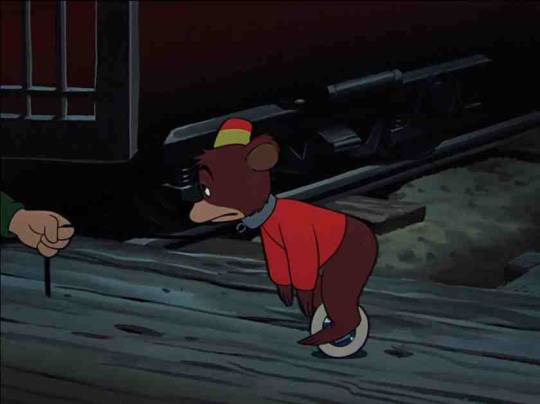
And people wonder why Ringling Bros. went out of business.
In between shows the miserable Bongo dreams of a life of freedom out in nature. We’re supposed to feel immediate sympathy for Bongo based on what we see and because Dinah Shore tells us to, but the abuse is edited so quickly and played off almost comically. They’re aiming for Dumbo’s level of emotion but we had time to get to know Dumbo and develop a connection with him. We saw him be happy, we saw him bond with his mother, we saw him befriend Timothy; almost all of that happened before he was thrust into heart wrenching drama. We barely know anything about Bongo apart from he’s a talented circus performer who’s more like a prisoner than a celebrity. Did he have a good childhood? Was his family in the same line of circus work? Does he have a favorite color?

One day the call of the wild is too loud to ignore. He escapes thanks to a very flimsy lock on the door of his train car (you think between that and how the staff treats him they’re purposefully setting up an opportunity for him to vamoose) and soon he’s zooming down the mountain on his unicycle. For the next several minutes Bongo explores his new forest surroundings and befriends the usual bevy of Disney fauna. Dinah Shore underscores Bongo’s laid back euphoria with “Lazy Countryside”, an easygoing and pleasant tune.
Unfortunately after night falls Bongo is quick to learn that the bare necessities of life will not come to you, at least not right away. Between the incessant chatter of nocturnal animals and insects keeping him awake and a storm threatening to cut his newfound life short, Bongo spends the night and most of the following morning cold, alone, and starving. His attempt at fishing like a bear should doesn’t go as hoped, but it does catch the eye of our story’s love interest, Lulabelle.
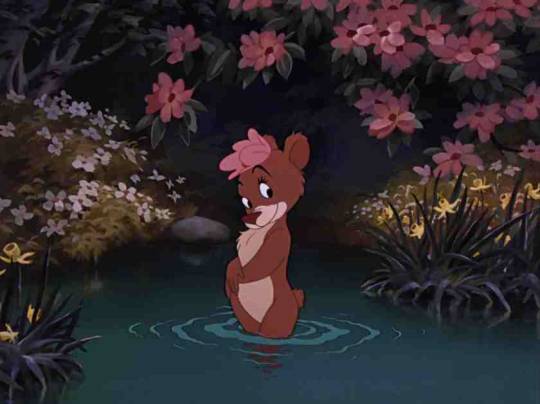
Voted “Most Likely to Awaken A New Generation of Furries” in the ’47 Disney yearbook.
I love Bongo’s reaction to seeing Lulabelle for the first time; an unmoving incredulous expression on his face as he tries to wake himself up from this vision, all the while Dinah Shore says “I must be dreaming! It’s too good to be true!” about three dozen times. The two flirt for a little while before we’re spun into the next musical number called, you guessed it, “Too Good To Be True”. It’s cute, but the floating on pink clouds, the hearts everywhere, the little cupid bears flying around, it all seems somehow familiar…
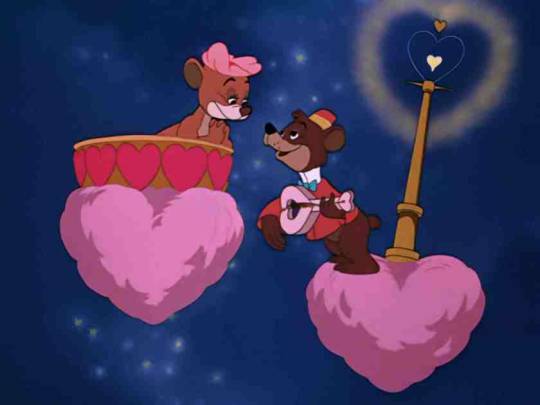
“Do the Care Bears countdown, and send a wish on to the aiiiiir…”
The song itself is nice, but there’s one that always springs to mind which I prefer. My introduction to the story of Bongo was not through a full viewing of Fun and Fancy Free or even a tape of this segment, but through DTV. See, the Disney Channel launched around the time MTV was a massive success, and wanting a little of that to rub off on them the company commissioned a series of interstitials comprised of clips from their shorts and animated films edited to classic pop, rock and blues hits and called it DTV. They basically predated the kind of fanmade music videos you see on YouTube. It was popular enough that there were even a few hour-long holiday specials built around them (mainly Valentine’s Day and Halloween). I bring this up because one of the first DTV videos I remember watching and am still fond of is Marvin Gaye and Tammi Terrell’s “Ain’t No Mountain High Enough” set to a few mountain-climbing themed shorts but primarily scenes from Bongo. And darn it, it cuts through the corniness and simply works. The imagery and overall sappiness of “Too Good To Be True” evokes every single vapid and thoroughly unsubtle Valentines Day product that is churned out en masse that time of year. No, wait, it’s not Valentines Day level of beating you over the head with glamorized romance. It’s Defcon 5, people – it’s LOVE DAY.
So Bongo and Lulabelle are happily in love, but it would make for a pretty dull short if it ended right here. Looks like we’re gonna need some more conflict to get the ball rolling. Enter our third bear, Lumpjaw, whom Dinah Shore describes as “the roughest, toughest, meanest bear with murder in his eyes”.
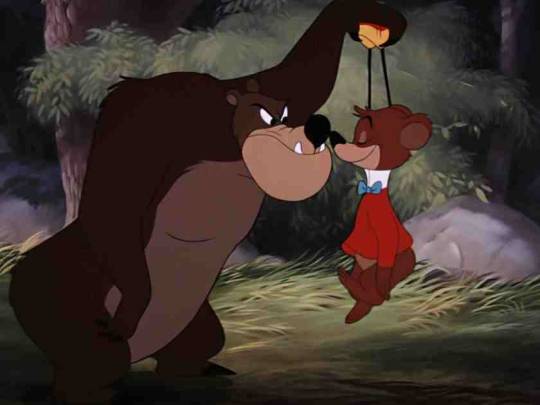
Meh, typical cartoon bear, he’s not so scar –
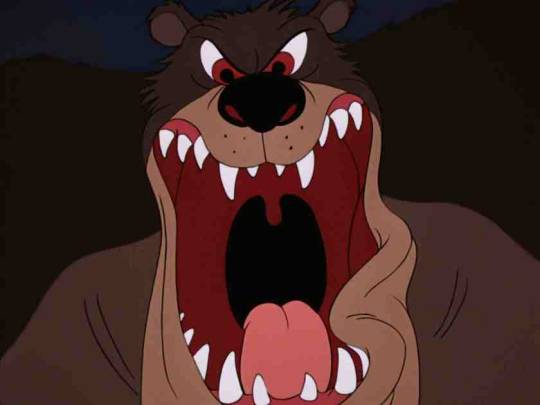
AHHHHH!! I TAKE IT BACK! I TAKE IT BACK!!
Lumpjaw is jealous that this newcomer is making moves on “his” girl, and since Bongo doesn’t know how to fight like an ordinary bear he starts getting the crud kicked out of him until Lulabelle intervenes – and slaps him silly herself.
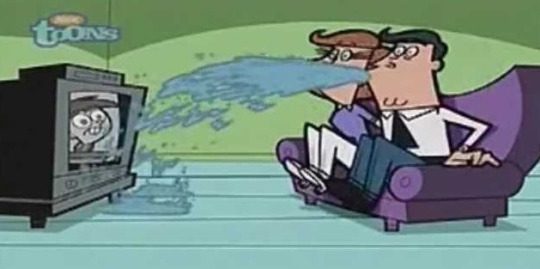
Bongo believes Lulabelle must hate him and is completely oblivious to her and the other bears watching the spectacle waiting for him to hit her back. You see in this movie, the law of the forest dictates that bears show love by hitting each other repeatedly.
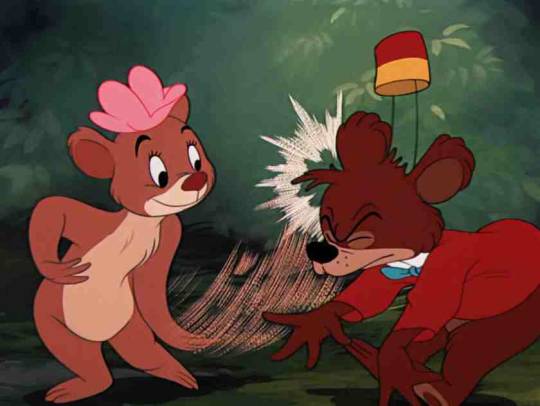
“She hit me…and it felt like a kiss…”
And oh I can already hear the wailing of “this promotes abusive relationships” through my computer screen. First off, I KNOW firsthand what an abusive relationship is, and it is more than just physical violence. That doesn’t condone violence, not one iota, but emotional/psychological abuse play a part in it as well, and Bongo is at least quick enough to recognize the smacking as what it should be, an unwarranted act of aggression that is entirely the slapper’s own fault. Second, give the kids you put this on for some fucking credit. Children’s entertainment is not one size fits all. Some might internalize this backwards logic of “hitting means love”, but others may ignore it completely. If you’re concerned that they might act out this kind of violence after watching this, just sit them down and talk to them about it instead of assuming the worst and convincing your neighborhood to toss their dvds into the nearest dumpster fire. Even if you tell them something as basic as “this is only how bears show they love each other but not how people do” they’ll be more apt to listen. Speaking of, there is some truth to this fact as bears in the mating season can get territorial and violent, hence all emphasis on the slapping. As ridiculous and horribly dated as this whole concept of this plot point is, I’ll give the story men credit that they didn’t pull it entirely from their asses.
Lulabelle doesn’t understand why Bongo isn’t hitting her back and since they can’t talk it out because the only method of communication is the narrator providing inner monologues, the usual romantic misunderstanding ensues. You know how I feel about this blasted cliche, so there’s no point dwelling on it. She tries to give Bongo one more chance with another slap, but he ducks and she hits an eager Lumpjaw instead. The other bears congratulate the two on their forthcoming nuptials while Bongo sulks off.
Then comes our next musical number performed for the half-happy couple by the tribe of bears, “Say It With a Slap”. It sounds like something you’d hear in the Country Bear Jamboree, from the background yodeling to the square dancing bridge to the subject matter being hilarious for the time and for Southerners but awkward and uncomfortable by today’s modern sensibilities. Also as far as ritualistic courtship dances go I’m more fond of the Finnish Fish Shlapping Dance myself.
Watching the festivities from afar Bongo finally puts two and two together and races back to Lulabelle. Since Bongo can’t fight Lumpjaw on the big guy’s terms he faces him like a smarter than the average circus bear and pummels him good with his unicycle. I’ll give the sequence this, it’s the most entertaining thing in this half of the picture. Maybe if this story had focused more on Bongo learning to adapt to the wild bear lifestyle and finding a middle ground between that and his circus upbringing rather than dawdle on love montages and countryside imagery this could have been a more interesting short.
The two wind up on a log on a river, and since this is an animated movie they quickly find themselves at the edge of a waterfall. Lumpjaw goes over but oh no, Bongo’s gone too – oh wait, no he isn’t, yaaaay. The bears celebrate, Bongo becomes a willing participant in Lulabelle’s masochism tango, and they live slappily ever after.
The record ends and Jiminy is pleased to see the toys are now smiling. Thrilled that he’s got two inanimate objects buying into his well-intentioned dime store philosophy, Jiminy is about to go on his way when he spies a birthday party invitation lying about and uses that as an excuse to invite himself. I’d make a complaint here about Jiminy being a gate crasher but it’s something he’s done since Pinocchio; hell, that movie kicked off with him hopping into Gepetto’s workshop uninvited looking to spend the night and messing with some of the toys there as well so nothing has changed between then and this movie.
At the house across the way is the party in question being held for Luana Patten, a Disney child star who’s also appeared in Melody Time, So Dear to My Heart, and Song of the South, usually alongside future Peter Pan Bobby Driscoll. The host is a popular ventriloquist of the day, Edgar Bergen, and his two dummies, little wiseacre Charlie McCarthy and bumbling bumpkin Mortimer Snerd. In fact, they’re the ONLY ones there. Just tell yourself Luana’s parents had to go out for the night and Bergen’s a family friend who’s babysitting and it makes this scene slightly less questionable. When Jiminy shows up, Bergen is doing one of his ventriloquism tricks for little Luana with a literal hand puppet.
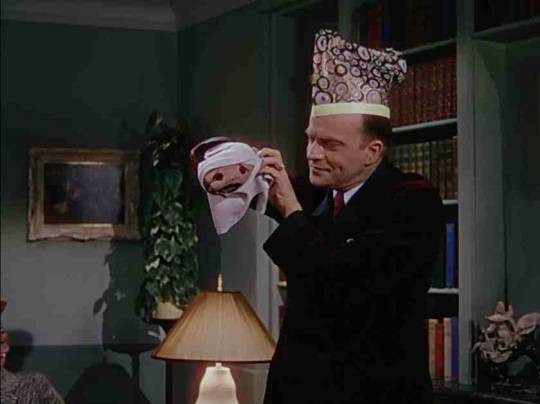
This early version of Lamb Chop’s Play Along is WEIRD.
Now this scene is something that irks a lot of people, and I understand why. Bergen is often touted as the man who popularized ventriloquism but here you see his lips constantly moving. In this kind of act what impresses people is that you’re making your puppet appear to be talking WITHOUT making it obvious that you’re the one who’s doing it. The fact that his popularity got started on the radio, where NOBODY could see him pulling this off is especially baffling. I suppose what Bergen lacked in innate talent he made up for with a good sense of comic timing and his fairly likable if simple characters. Speaking of, Charlie and Mortimer are odd to be sure, and I see why some find them off-putting with their big unblinking eyes and noticeable slits around their large mouths, but personally speaking I’ve found certain Muppets to be much creepier than these dummies. Despite all this, I can’t hate the guy or his weird looking puppets or their questionable placement in this movie.
And you wanna know why?
Because if it wasn’t for Edgar Bergen, we wouldn’t have Jim Henson.
I kid you not.
Henson was a huge fan of Bergen as a child, and it led to him wanting to become a puppeteer. I think we all know how that turned out. It’s enough that as a way of showing his appreciation to Bergen he gave him and Charlie McCarthy a cameo in The Muppet Movie and dedicated it to him after his passing.
Bergen decides to regale the company with the story of Jack and the Beanstalk. When you think about it, Jack and the Beanstalk is a hard tale to tell, not because it’s been done so many times before but because there’s so few good versions out there. Let’s get one fact straight, Jack is a TERRIBLE main character. He makes a stupid decision that nearly plunges his destitute family into further poverty, then cons and steals from an innocent housewife no less than three times and kills her husband in cold blood when he’s caught. It takes a lot to make you want to root for him, and lord knows people have tried. The Faerie Tale Theater version added a backstory where the giant was the one responsible for killing Jack’s father and stealing his family’s treasures in the first place. HBO’s Happily Ever After series and The Henson Company’s made for TV movie explored Jack’s morality by having him learn greed makes him as much of an all consuming monster as the giant. The Gene Kelly television special and the animated Japanese version both added a cursed princess in need of rescuing; the latter also went for straight out weirdness just for good measure. And then there’s the Sondheim musical Into The Woods, which told the story best by forcing Jack to face the consequences of his actions when the giant’s widow finds another beanstalk and climbs down for revenge.
So how does Disney make their version one with no questionable morals or character motives? By having their three main stars Mickey Mouse, Donald Duck and Goofy star in it, of course (if you haven’t already gotten that before). There were tons, and I mean TONS of story ideas that were tossed around when this was being developed as a full-length feature which I would have loved to have seen in the final product. One version would have had Honest John and Gideon from Pinocchio be the ones who swindle Mickey into buying the magic beans. Another one had Minnie be the queen of Happy Valley (proving that not all animated queens who don’t have ice powers have to be evil) and had her give the beans to Mickey as a way to return the dried up Happy Valley to its former glory. There were lots of gags and and creative visual concepts about the land of the giants and what would happen when the main trio got there. For a time the hen that laid golden eggs, a staple of the original story, was a part of it, and she would have been played by the now relatively obscure character of Clara Cluck! Unfortunately everything had to go when the war started and the budget got slashed. And that’s not the only thing that went with it. This short would be the last time Walt Disney would provide Mickey’s voice as his smoking habit was beginning to affect his performance. After this he would pass the torch to the studio’s sound effects wizard Jimmy McDonald.
Bergen opens the tale in the magical land of Happy Valley and we see Luana imagining it in her mind as he builds on details like babbling brooks, lush farms and a splendorous castle overlooking it all. And in that castle lives the key to Happy Valley’s success, a magical singing harp (Anita Gordon). She sings the lovely “My What a Happy Day”. I really like this song; some have told me it’s the sound of blandness, but I can’t hear them over the innocent joy it infuses me with. Maybe it’s the fact that I grew up with this particular short that makes me enjoy it so much. My VHS copy had the story narrated by beloved Wonderful World of Disney character Ludwig Von Drake with bookends featuring him and Herman the Bootle Beetle, and I watched it all the time. It was my childhood.
According to Bergen the song of the Harp casts a spell of prosperity and happiness over the land, which admittedly raises one potent question: The enchanted prosperity I can get but is the happiness a side effect, or is it enforced like that one Monty Python skit where everyone in that Happy Valley has to be happy all the time or else?
Of course the story would go nowhere if it was constantly this happy which leads into my favorite exchanges between Bergen and Charlie:
Bergen: It was too good to last – Charlie: I knew there was a catch. Bergen: For one day – Charlie: They built a schoolhouse.
Out of the blue an enormous shadow creeps over the valley like a storm cloud (complete with actual thunder and lightning too) and snatches the Harp from the castle. Without the Harp’s music Happy Valley decays into a barren wasteland that no amount of song can salvage.
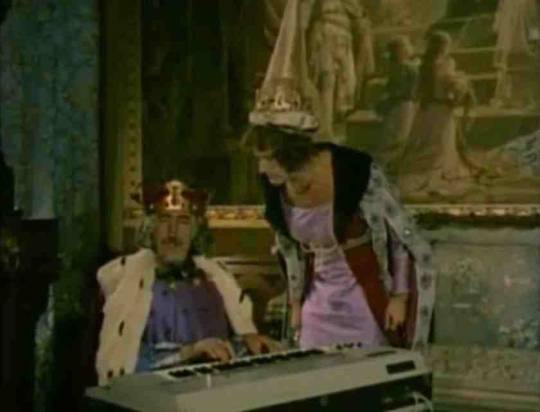
And Lord knows they’ve tried.
We check in on Mickey, Donald and Goofy, three starving farmers with nothing to their name but a dried up cow, a crust of bread they have to slice paper thin, and a solitary bean. It’s a darkly comic sight, one made even more tension-filled and humorous when it’s filtered through the narration…
…in the Von Drake version.
Yeah, while we’re on this topic I might as well go into why I prefer the one with Von Drake narrating over the original. The main problem I have with Bergen is the same I have with Dinah Shore’s voiceover in the Bongo section, yet by comparison Shore is barely a nuisance. You want to know what that is?
BERGEN.
NEVER.
SHUTS.
THE HELL.
UP.
Everything he adds to the proceedings is already plain to see before us, and when he isn’t talking about the current action on screen or trading barbs with Charlie McCarthy he’s going into what the characters must be thinking or feeling at that moment. It’s not like film is a visual medium where we can draw our own conclusions based on what we’re viewing and our prior knowledge of the characters, oh no, we have to be told everything like we’re children. Oh wait, we don’t, because I watched the Von Drake one when I was a child and I knew what was going on without him telling me every five seconds! The Von Drake edition knows when to clam up and let what’s happening speak for itself. It allows this half of the movie to breathe and lets us take in some good atmosphere and music where there was once constant voiceover. On top of that, Von Drake’s delivery hits all the comic beats while Bergen’s is rather dry. The original Mickey and the Beanstalk from Fun and Fancy Free has cleaner scene transitions as well as moments that were edited from the Von Drake edition since that was taken from television, but half the charm comes from Von Drake and Herman; that and the previously mentioned amount of narration makes their take the superior version.

“Wow…I never realized how much I needed to say all that.”
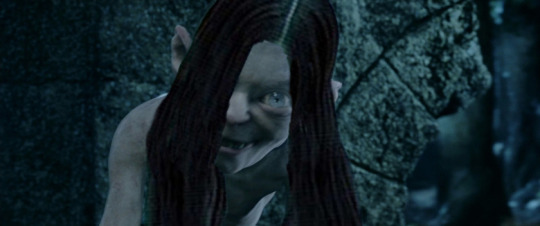
“Felt good, didn’t it?”

“You have no idea, Cynicism.”
Anyway, caught between starvation pangs and an omnipotent voice incessantly stating the obvious, Donald finally snaps and attempts to make a sandwich out of the plates and cutlery. Goofy and Mickey bring him back to his senses, or so it would seem.
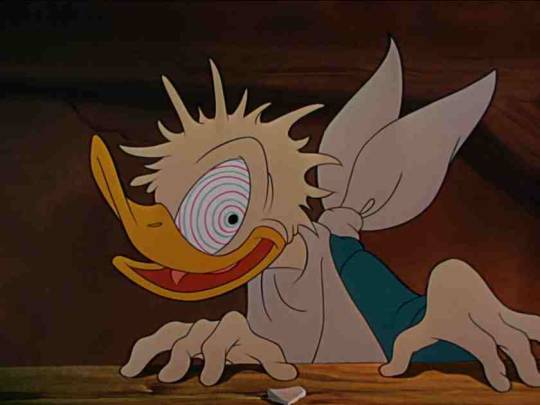
Ah, I knew this movie was lacking something – nightmare fuel!
Mickey spies the axe conveniently hanging on the wall has gone missing nearly too late. Outside Donald is making his moves on the cow.
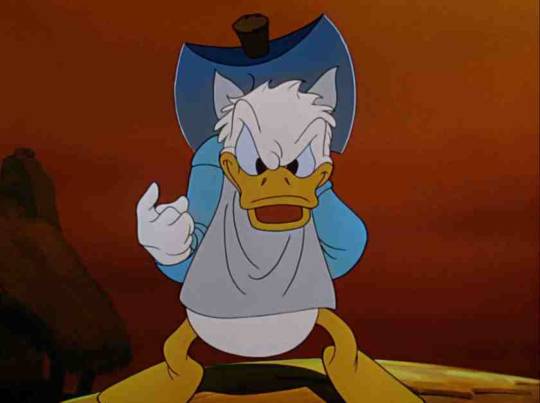
Heeeeeeere’s ducky!!
For many people this is one of the scariest moments in Disney cinema. While I’m not inclined to agree I can surely understand. His slow descent into madness is framed almost like a psychological thriller. Plus, we all know Donald’s had a temper before but we’ve never seen him flat-out attempt murder…almost.
I’d like to point out that in the picture on the left the gun is going off in a crowded theater. Unfortunately the timelessness of Disney’s films doesn’t always apply to their early shorts.
Mickey and Goofy intervene in the nick of time and the story fades back to the puppet party. Charlie is all up for Donald murdering the cow to survive and lists a number of increasingly gruesome ways to pull it off over Luana and Mortimer’s distressed protests. Ok, NOW I think I understand why everyone is terrified of Charlie McCarthy. The kid’s a little wooden sociopath.
After some more blathering, Bergen gets the story back on track and tells us Mickey went to go trade the cow for some much needed vittles. But Donald and Goofy’s dreams of a Be Our Guest style feast are dashed when he returns home with nothing but a handful of beans. Donald goes berserk even after Mickey says they’re supposed to be magic and smacks them out of his hand where they fall into a hole in the floor. Yet as everyone sleeps that night, light from the full moon shines into the house, which is the very thing needed for the beans to work their magic. The whole sequence where the beanstalk grows through the entire house and raises it up to the sky is a highlight. It begins with an almost sinister air, the beanstalk crawling its way upward and silently through the dark like a snake, and the wonder and music constantly builds as it climbs higher towards the heavens. Every action matches with the music, and the animation is the best in the whole movie. I must say it always amazed me that Mickey, Donald and Goofy are able to sleep as heavily as heavily as they do through the whole ordeal, especially since they get shaken around so much and come close to falling so many times. Were the hunger pains that bad that they took a heavy dose of Ambien before turning in?
The three wake up that morning in a land in the clouds where everything towers above them (and apparently they’re totally fine with their house being destroyed). They venture to a nearby castle where the only clue as to who lives there is a set of footprints each the size of a ditch. While crossing the moat Donald angers a formation of dragonflies and one dive bombs them. On the tape I had it was immediately swallowed by a jumping fish and the ensuing splash washed the friends to shore. So imagine my surprise the first time watching it in full and seeing this was a full-blown action sequence of sorts with the dragonfly going after them repeatedly and their little vessel nearly sinking. I’m guessing it was cut for time but it’s kind of a neat part.
Mickey and crew climb up the enormous stairs and sneak in the castle under the door, and all the while Bergen does not stop talking. I’m almost tempted to put it on mute when the animated characters aren’t the ones who are speaking. They come across a giant table laden with enormous food and gladly help themselves. Goofy in particular gets in plenty of shenanigans involving a bouncy jello mold. The gorging is cut short when they hear the voice of the Harp coming from a locked chest. She informs them that she was kidnapped by the giant Willie.
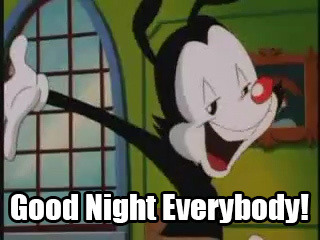
Twenty-eight years of watching this…how did I not realize… There is no way that name could have been chosen at random!
Bergen tells us Willie is “a heartless monster” who stole the Harp because “he was cruel and selfish and didn’t care what happened to Happy Valley”. And I…he…I…
No.
NO.
Screw you, Bergen.
Screw you, screw your horrible narration skills, and especially screw your picking on my Willie!


“Ugh, there’s no way around that phrasing, is there?”
Again, going back to the Von Drake edition, they painted Willie in a much kinder light, one that’s more true to his character. He’s not the crude, gluttonous, overly violent thug like past giants. He’s big enough to pose a threat but he’s silly and very endearing, almost childlike at times.
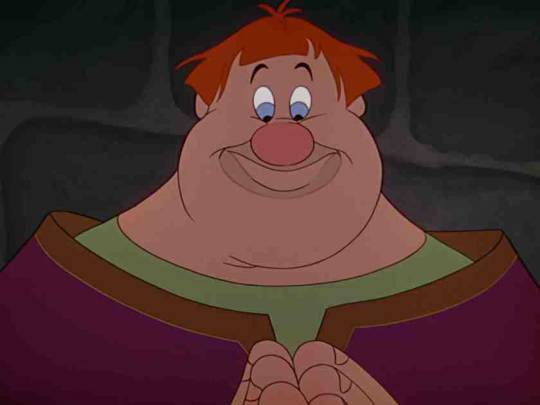
Come on, does this even look cruel, selfish and wicked to you?
His goofy voice plays a part in it as well thanks to Billy Gilbert, the same actor who voiced Sneezy in Snow White and the Seven Dwarfs. At one point he even gets to do his trademark over-the-top sneeze. Willie does not seem at all like a cold-hearted brute who would leave an entire kingdom to rot for his own selfish pleasures. It’s highly likely he didn’t even know the Harp was needed for the land to thrive and was completely ignorant to the fact that Happy Valley was turning into Death Valley without her. That’s why it bugs me when he’s lumped into the group of Disney villains. Nearly every bad guy in the canon either openly embraces how evil they are or do what they do because they believe it is the right thing. Willie falls into neither category; most of his maliciousness is incidental rather than intentional. If you don’t believe me that he isn’t evil, look at how he’s portrayed beyond this movie. In a bout of perfect casting, he plays the friendly and jovial Ghost of Christmas Present in Mickey’s Christmas Carol. He’s also made positive appearances in shows like House of Mouse and Mickey Mouse Clubhouse. Maybe it’s just because I’ve always had an affinity for big tough looking characters who are really enormous marshmallows (wait until you see who my favorite character is when we get around to reviewing the American Tail movies), but I can never see Willie as a true villain, and that’s a good thing. So back off, Bergen. He may be a big galoot, but he’s MY big galoot.
What also separates Willie from the giants in most other adaptations is that he has the ability to change himself into anything he wants provided he says or sings the magic words “Fee Fie Fo Fum”. A common complaint with this new feature is that it’s completely unnecessary; his superpower is that he’s already big and strong, so why give him magic? I disagree. I like his transformations and think it adds something special to him. Walt purposefully wanted to create a combination of the traditional beanstalk giant and the shape shifting ogre from the fairy tale Puss in Boots to add more danger and intrigue to the story (as well as eliminate the moral quandary of making a side character a widow). In fact one has to wonder if this means Walt ever planned on doing an animated take on Puss in Boots someday. My only wish is that Willie’s powers were utilized more as it was originally planned in both his song and the first draft of the ending, where he’s shrunk down to normal size and becomes a member of Queen Minnie’s court.
Willie discovers Mickey hiding out in his sandwich and snatches him. But clever Mickey has already seen Willie showcase his powers through his introductory number and pretends to learn and be impressed by that fact after reading Willie’s palm. Willie is eager to show off and Mickey, spying a flyswatter nearby, asks if he could transform himself into a housefly. Willie is of course suspicious and would rather be something like a pink bunny but goes along with it anyway. The friends prepare to attack, but Willie does the old switcheroo and exposes them.
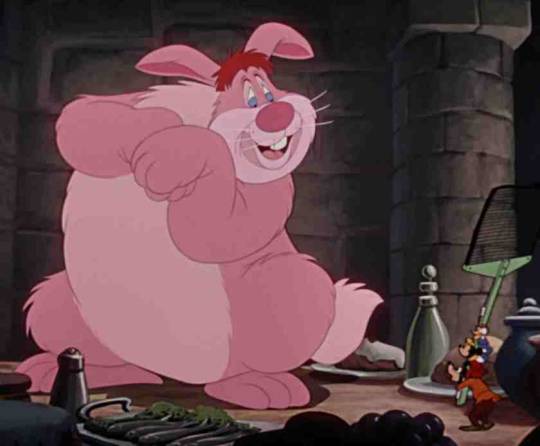

I’m guessing Mickey never bothered to actually read the original Puss in Boots story; there Puss convinces the shapeshifting ogre to turn into gradual bigger and fiercer creatures and then taunt him into becoming something small and helpless so he can dispose him. Sweat the small stuff immediately and the one you’re trying to trick will be on to you right away.
Willie captures his would-be murderers though Mickey escapes before he can get locked up with Donald and Goofy. Luckily they have an ally in the Harp, who sings Willie to sleep with the sweet lullaby “My Favorite Dream”. Mickey is able to sneak the key out of his pocket after almost waking him with an upturned box of snuff and rescues his friends. Donald and Goofy start making their way back to the beanstalk with the harp, but Mickey tries to buy them more time by tying up Willie’s shoelaces in case he wakes up. Unfortunately doing this does cause Willie to wake up and attack. There’s a surprised “Oh!” from Luana at this part that was left in on the Von Drake tape so for the longest time I assumed it was the Harp crying out in terror despite the fact that they sound nothing alike. Oops.
Mickey manages to outsmart Willie at every turn, mainly because the giant is so furious he conveniently forgot he can become anything and catch and crush Mickey like an insect at any second. The story abruptly ends with the three friends cutting down the beanstalk and Willie crashing to his death. We don’t even get to see the harp returned or Happy Valley restored or Mickey, Donald and Goofy sharing a victory high five. Mortimer’s not satisfied mainly because he’s saddened by Willie’s murder, and I don’t blame him. As if I need to repeat it, they do too good a job of making him likable that you don’t want to see him die. Bergen responds by reminding Mortimer that Willie is only a fictional character and gives him a crash course in fantasy vs. reality – one that is completely thrown out the window when the real Willie looks in on them.
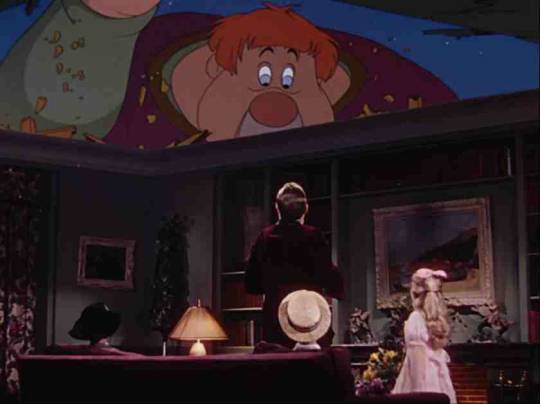

So, sentient crickets and puppets are accepted as normal as well as a living giant that everyone once believed to be fictional…
This whole movie took place near Gravity Falls.
There is no other possible explanation for this.
Bergen has the appropriate reaction and faints, Mortimer takes comfort in knowing reality is an illusion and the universe is a hologram, and Jiminy figures maybe now is a good time to get the heck out of dodge before this crossover gets any stranger. So our odd little film comes to a close as we follow Jiminy tailing Willie as he terrorizes the downtown Los Angeles area in search of the mouse who made him homeless.
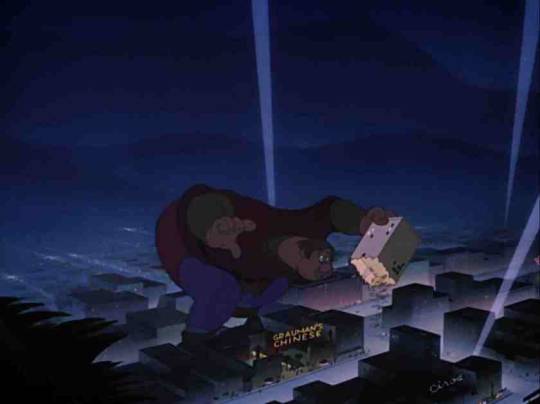
“Run!! It’s Godzilla!!” “It may look like Godzilla, but due to international copyright laws and the fact that this giant is so obviously a human whereas Godzilla is reptilian, it’s not.”
Well…that was something. Maybe not as spectacular or fully underrated as I remember, but it was something. The host parts are disjointed and don’t gel very well, even in comparison to the other package features. But the main draw at the time was less about the animation and characters and more about the celebrities that would be playing a part in it. Fun and Fancy Free basically predates the Dreamworks formula by about fifty years. Food for thought, huh?
As for my summary of the individual segments, Bongo is perfectly fine. Not amazingly humorous or gorgeously animated, but not poorly scribbled out or annoying, at least for the most part. It’s middle of the road entertainment that I don’t have much to complain about or praise. The worst I can say is that it’s as padded as my high school brassiere. Mickey and the Beanstalk, though? Never fails to give me the nostalgic warm and fuzzies. It’s a big adventure with a boatful of lovable characters and great songs. By all means though, seek out the version that has Ludwig Von Drake narrating. It’s available on dvd, and last time I checked it’s on Netflix too. It even comes with some of my favorite Mickey shorts like “Mr. Mouse Steps Out” and “Brave Little Tailor”. I know I’m not the only one who feels some connection to this part of film; whereas nobody remembers or bothers to reference Bongo, even in Disney media, there’s one or two mentions of Mickey and the Beanstalk in the Disney parks, primarily in Fantasyland. Also, take a look at these stills from the Animaniacs parody of the fairytale and tell me it wasn’t influenced by the Disney one in any way.
Fun And Fancy Free performed decently at the box office, though it was overshadowed at the time by Walt Disney’s infamous testimony at the House of Un-American Activities Committee. Now it’s merely a footnote in Disney’s history. When interviewed about the film years later, the animators openly admitted they didn’t want to work on it. Even Walt barely had anything to say about it in his interviews and biographies. It was merely an assignment they had to do in order to keep the studio afloat, hold on to their jobs, and get their mascot Mickey back in a starring role (the last one he’d really hold until Mickey’s Christmas Carol in 1983). Truth be told, the making of Fun And Fancy Free, which was included on the original VHS and DVD release, is more interesting than the film itself as a whole.
But at the end of the day, do I dislike this movie?
No, not really. I can’t call it one of my favorites, yet there are things I like about it that I wish they were allowed to expand upon. It’s an uneven film that does the best it can to be simply light and entertaining like its title. And I guess that’s why people are quick to harp (ahem) on it. Disney is capable of making great art. But just because it can doesn’t mean we should diss it when they to do something lighter and fluffier. Sometimes you need that shallow, pleasant bit of pure escapism to bolster your spirits. Do you think the animation team would have been able to get by after Walt if they didn’t make The Aristocats? Or begin recovering from the failure from The Black Cauldron without The Great Mouse Detective (which I don’t think is merely shallow filler at all, but I’m saving my thoughts for the actual review of it). I admire Disney for being able to shift gears and go from deeper subject material to goofy comic fun when need be.
In other words, when watching this particular film, just repeat to yourself “It’s just a Disney movie, I should really just relax”.
Thank you for reading. If you like what you see and want more reviews, vote for what movie you want me to look at next by leaving it in the comments or emailing me at [email protected]. Remember, you can only vote once a month. The list of movies available to vote for are under “What’s On the Shelf”.
If you want to support me and totally not get swindled into buying magic beans, please consider supporting my Patreon. It’s completely optional, you can back out any time you choose, and it comes with perks like extra votes and adding movies of your choice for future reviews. Special thanks to Amelia Jones for her contribution!
And a VERY special thank you to The Three CommentEARS for their insightful and entertaining commentary on this film which helped influence and inform this review. I’ve done some commentaries with them in the past for Pinocchio and the extended anniversary edition of Pocahontas, and they know their Disney stuff. Please go and check them out!
Caricature by Brian Slatky, 2017
June Review: Fun and Fancy Free (1947) Sigh, poor package features, why does nobody like you? Why is it that internet reviewers and Disney critics and fans always seem to give you the shaft?
#1940&039;s#Action-Adventure#adventure#animated#animated feature#animated movie#animated movie review#animated shorts#animation#beanstalk#bongo#Charlie McCarthy#Dinah Shore#Disney#disney animated#disney animated feature#disney animated movie#disney animation#disney review#Donald Duck#Edgar Bergen#Fantasy#fun and fancy free#goofy#Hollywood#Jack and the beanstalk#jiminy cricket#Luana Patten#Ludwig von drake#lulabelle
9 notes
·
View notes
Photo

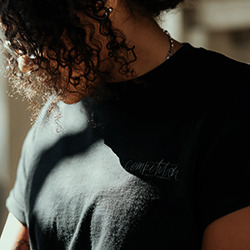



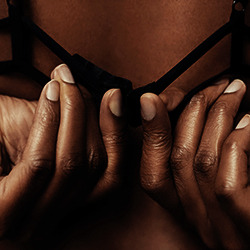



meet jasmin butler // welcome to new hope, kansas.
the basics //
full name : jasmin alicia butler birthdate & zodiac : december 16th, 1997 & sagittarius. gender & pronouns : woman & she/her sexuality : bisexual/fluid occupation : night shift waitress @ the grill hometown : new hope, kansas family : james butler ( father ), noah butler ( older brother )
deeper dive //
hobbies : SOCIAL MEDIA - a typical gen z’r, according to her father at least, jas has found her calling on the little phone she keeps on her at all times. she has a small following through her various accounts, usually by posting bored videos late night at the diner. she’s waiting for the chance to go viral just so she can say she has - she has no inclination to make a career out of it, and jumps around from platform to platform based on what she’s interested in at the time. VIDEO GAMES - most wouldn’t classify her as a ‘gamer’ - she sticks mostly to mario kart or mario party, with maybe some old school frogger thrown in. she made sure to bring her fathers original playstation with her when she moved into her own place with her friends, and you can find her on her off nights blasting shitty music and playing through crash bandicoot. SKATEBOARDING - while jas wouldn’t classify herself an active person ( she hates the ‘art of exercising’, refuses to work out on a routine ) she does love the outdoors, and skateboarding was how she got around town as a teen. she has her own car now, but if she isn’t leaving the city limits, she’ll still usually pull up on her board - it’s just easier. MECHANICS - her father runs the local mechanic shop, and taught both her and noah everything he ever knew - from spark plugs to battery changes to when to just give up on a car altogether. mostly, she tinkers with her old jeep which sits in the driveway of the shitty house she rents with a few of her friends - but she’ll hop down to the shop to help her dad out if he gets a sudden rush of customers.
favorites : food - cheetos. drink - dr. pepper. movie - anchorman. she unironically still quotes it on the regular. song - ‘if it makes you happy’ by sheryl crow. color - pink and blue. habits : smokes cigarettes / drinks alcohol fairly often / recreational drug use regularly nervous ticks include tugging on her hoodie / teeshirt, but she’ll deny that she’s ever been nervous in her life. loves : loud music, old tv shows, laundry day, knee high socks, her skateboard, late summer evenings, the smell of the diner, her brother ( don’t tell him ), her friends ( she’ll tell them herself ), being a pain in the ass, and losing hours of time on the internet. fears : she claims to be fearless ( ‘what’s the point of fear?’ ) but is absolutely terrified of ticks. talents : skateboarding, piano, ballet, social media, touching her nose with her tongue
appearance //
height : 5′8 tattoos : lizard on arch of left foot, small saturn/moon/star on right wrist, seashell on left hip, bumblebee on right shoulder blade, more coming. scars : no permeant scars, scratches and bruises from working in a diner and her side hustle of podcasting / being ‘internet famous’ ( she has 430 followers, thank you very much ) piercings : navel, nose, four on right ear, three on left ear - all different kinds of earrings, usually most mismatching, rarely changed unless she finds a new one she likes hair : natural most of the time - wild curls, long and dark. will get her hair relaxed if she has somewhere nice to attend, but hasn’t had to in years so rarely fucks with it much beyond daily care. fashion : personal - jeans, tees, hoodies, anything comfortable and casual. she’s not a ‘girly girl’ - she grew up very close to her dad and her brother, and spent a lot of time hanging out with the guys growing up. she’s a physical person, and skateboards or plays tackle football with her friends when she’s on her downtime. occasionally, if out with the girls or heading to kansas city for something ‘fancy’, she’ll don a skirt, but she hates dresses. big fan of overalls now that they’re coming back, and in summer lives in short rompers. shoes - usually her old skool styled vans - she has a few pairs in different colors; bright yellow, classic black, and a specialized pair with aliens on them for fun. in summer, she’ll wear flip flops or addidas slip ons to hang around. she loves mismatching socks - the wackier, the better.
bio //
Jasmin alicia butler was born eight days before christmas, her father’s ‘favorite christmas present’ according to him. it was the final straw on her mothers back, however - denise, whom jas knows by name alone, disappeared before she was even three months old - leaving james with a son, a daughter, and a mechanic shop to somehow run on his own. the town of new hope did what it did best, though - jas and noah were always looked after by someone, well fed if not well dressed, and smart as whips. the two were inseparable as kids - they’d walk to their fathers shop after school together, jas ignoring her homework while her father showed her how to fix a transmission or do an oil change. she couldn’t figure out the quadratic formula, but she damn sure knew how to replace an alternator - only one of them felt relevant in the real world. while some of her friends wanted to go out and see the rest of the world, jas was content to stay right at home. she lived in her childhood bedroom for a few extra years while some went to college, some disappeared entirely - left the new hope borders and then the kansas ones after that - but she worked late afternoons with her father, fixing up travelers and locals before heading over to the grill to serve up burgers and fries to those whose car she’d just fixed. it eventually got her enough money to decide to splurge - and splurge she did. her twenty first was spent in mexico, a couple of friends on her side, and though she doesn’t really have a lot of wanderlust, she has to admit the sand beneath her toes and the fish swimming alongside of her was an experience she’s glad to have had. even still - nearing three years later - she posts pictures on her instagram with captions like ‘take me back’ or ‘flashback friday!’. but she’s in no place to really go anywhere now; she’s living with two of her best friends, still serving the late night travelers who drive through new hope on their way to oklahoma or kansas city. it’s a quiet life, she knows, but it’s a happy one. as long as she gets her free fries, her dr. pepper, and the sunshine on her face when she needs it, she’s content.
#nohopeintro#mjb#finally see what it means to be living ( aes )#the last good thing about this part of town ( abt )#©
1 note
·
View note
Photo
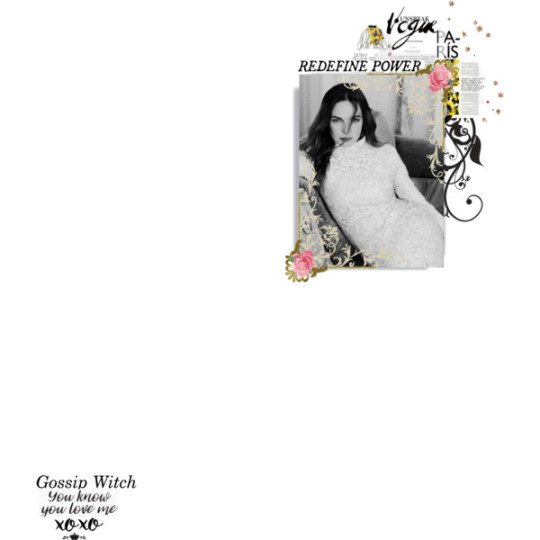
Nothing happened to me. I happened. || GW
☾♔; March 19, 2018 ☾♔; sotd: idk yet ☾♔; comedian otd: JOHN FU.CKING OLIVER ☾♔; GW NPC Audition II ☾♔; {G} https://goo.gl/XSTtMc ☾♔; mod(s): @themadmonarchist @maybones et moi
Preamble Ramble: finally an opportunity to write for my favourite psychopath (also probs my fave out of all the characters I've ever made. soz everyone else)
⠀⠀⠀⠀⠀⠀⠀⠀⠀⠀⠀ஜ۩۞۩ஜ ⠀⠀⠀⠀⠀⠀⠀⠀⠀⠀⠀⠀⠀⠀⠀⠀⠀⠀⠀⠀⠀⠀ ⠀⠀⠀Dominika Grigoryevna Vororina, (approx 460)
⠀⠀⠀⠀⠀⠀I'm a cool girl ⠀⠀⠀⠀⠀⠀I'm a, I'm a cool girl ⠀⠀⠀⠀⠀⠀Ice cold ⠀⠀⠀⠀⠀⠀I role my eyes at you, boy ⠀⠀⠀⠀⠀⠀⠀⠀⠀⠀⠀-⠀Cool Girl by Tove Lo
⠀⠀⠀⠀⠀⠀⠀⠀⠀⠀⠀ஜ۩۞۩ஜ
⠀⠀⠀⠀⠀⠀⠀⠀⠀⠀⠀⚜️ THE BASICS
Nickname: Nika, Professor Vororina (generally addressed as such, rather than as a nickname), Khalessi (self-applied), Professor Khaleesi (makes students call her that, mostly first and second years as a joke, somewhat, older students whom she is "fond" of may continue calling her that, or people trying to be a teacher's pet), Rurikovna (literally; "daughter of Rurik", it's a self-applied title as well) Gender: cis-female Date of Birth: Vaguely winter (it was a long time ago) Place of Birth: Moscow Kremlin Nationality: Russian (she's held a bunch of citizenships over the years, but she's gone back to Mother Russia recently) Ethnicity: Eastern Slav Accent: Russian Blood Status: muggle-born/half-breed (of sorts)
Profession: Potions Professor at Hogwarts (also Head of Slytherin House)
⠀⠀⠀⠀⠀⠀⠀⠀⠀⠀⠀⚜️ PHYSICAL APPEARANCE
Face Claim: Rebecca Ferguson
Hair: She's had an array of colours over the centuries, always long, but the styles have varied over the centuries. She currently favours fiery red or slivery-gold/platinum, changes it on a whim. Could be Russian witch stereotype red in the morning, and then Khaleesi coloured in the evening.
Eyes: Blue-green, occasionally they seem to flash red, though she claims that's just a trick of the light (or is it? tun, tun, tun!)
Height: 1.7m
Weight: idk, but also what does it matter, she's immortal and basically undead, her body doesn't change.
Body: lean, lithe, unnaturally attractive
Any Scars/ Marks?: none
Any Tattoos/ Piercings?: just her ears, triple pierced or whatever for ear cuffs.
Quirks/ Mannerisms: - eerily silent, she doesn't make any noise when she moves, no matter what she's wearing. - some may notice her smirking to herself in the corner now and again when chaos is erupting in the foreground (did she 'cause it, is she approving of it? Who knows)
Style: expensive. She likes wearing dark and/or vivid colours, as well as sharp and elegant clothing. Her style can best be described as "instilling fear in the hearts of men". Well, that's her wardrobe's goal, anyway.
Additional Information: - wears a f u c k ton of heels, like, always, and yet they never make any noise - always seems to have a little box (or whatever) of fries/chips (whatever you wanna call it, as a north american, I call 'em fries) in her hands - likes wearing crosses, mainly as an inside joke with herself
⠀⠀⠀⠀⠀⠀⠀⠀⠀⠀⠀⚜️ PERSONALITY:
Head cannon: Nika has a slightly complicated reputation, well, first off, she's a teacher, so she's not really involved with the hierarchy, she's outside of it. Her reputation, however, runs as either the coolest or scariest teacher. It really depends on how "interesting" she finds a student, she will spend time with them (positively or negatively), if she finds them to be "dull", however, they literally look like furniture to her, she will speak without ever hearing them. She's both a chill and strict teacher, if you get the work done, you can do whatever you want, if you're goofing off without doing anything or proving to be a nuisance whilst she's speaking, you may find your cauldron spontaneously exploding. She can also be chilling with the nuisances, if someone is speaking whilst she is, the cauldron will go "boom" whilst she continues on with the lesson as though nothing dramatic is happening. She's not an all together bad teacher though, if she finds people interesting, she'll spend time with them and actually attempt to pass on knowledge and throw questions at them during class, and even ask about their problems and whatnot if they're looking down (though it has been observed that her "advice" does not lead to the best result, and more often than not results in more difficult and complicated situations for the person). Additionally, whilst she does not actively hide that she's a vampire, she also does not go out of her way to confirm that. But does make nerdy "full moon tonight, don't be out too late" type jokes.
Theme Song: Khaleesi by Ramin Djawadi
Personality (+ 5, - 5): Psychopath. like, a real proper psychopath, not just as a word thrown around at homicidal maniacs or selfish dovchebags, she feels literally nothing, and not in a "cool girl" way, she can't feel anything, her brain's just not wired for it. She generally displays herself as a confident, intelligent, classy, and elegant, well-educated, proud European, and is seemingly easy to befriend and get along with so long as you like clever things and/or sarcasm. However, she's faking all of that. She doesn't really "feel" anything, and one could describe her as being "empty". Her entire personality has been meticulously built by herself over the centuries to best and most easily fit in with society and not draw unwanted attention to herself. All of her emotions and personality traits are things she's mimicking from people she's met, and she was doing so before she even became a vampire. Having been born a psychopath, she doesn't have the same emotional range that normal people do, she just can't feel anything, she's incapable of it. She has a complete lack of remorse and guilt, she doesn't even have the same "biological imperative" impulse that the rest of us have when it comes to blood relations and their safety. A majority of her relationships are superficial, based on physical attraction and/or mild amusement, but genuine and deep relationships is a struggle for her. Next to impossible, it's not that she doesn't want to care about pretty boy 57, it's just that she can't, also who cares about such disposable people anyway?. Having said that, it's not impossible for her to actually care, it's rare, extremely, but not impossible. In her entire life (which is nearing 500 years and including all potential plotting), she only formed a genuine bond with (up to) three people, and her own family is not on that list. So when she does genuinely care about a person, she's extremely protective of them, given how rare it is, and is excessively aggressive towards any she deems has or may harm them.
Nika is genuinely very logical and rational, and has a rather scientific mind. Or more one of a mad scientists'. She's extremely curious about the nature of humanity, and one can even say that she "enjoys" experimenting on them by forcing them into complex and difficult situations and observing how they react. She also has a tendency to experiment on herself, as a child she would harm herself, not out of a sui.cidal desire, but to see how much pain she could tolerate, if she would feel fear when she got close to death, if she would/could cry, etc. (she didn't cry, or get scared, but her heart rate went up sometimes, which was fascinating). When drugs became a thing, she took literally all of them at various doses and mixes just to see how it would affect her as a witch and a vampire. She also experimented on animals, she's stopped now, except with dogs, she kills them after the third annoying bark (I'm sorry, but she's a psychopath, that's what they do! TT_TT). She's never grossed out and probably too okay with blood and guts, and too good at dealing with it. Highly organized, and punctual, she displays a reckless and complete disregard for the safety of herself and others (with the exception of those whom she has a genuine bond with). She's a pervasive liar, deceptor, manipulator, and is quite narcissistic, and superficially charming. Whilst rage is not a common "emotion" she experiences, irritation is one that she can genuinely feel, and when genuinely irritated by something, she has a tendency to cause it immense physical pain before ultimately killing it.
Any mental health issues: she's a genuine psychopath, whilst she doesn't think there's anything wrong with her, according to society, she's messed up.
Favorite Quotes/ Sayings that your character would use: - "Nothing happened to me. I happened." - NBC's Hannibal, said by the titular character, and definitely something Nika would say because I'm a nerd who makes references. - "I have what used to be called an axis II personality disorder. So you can scream and cry, and beg all you want. You can tell me about your spouse and kids, all about your happy little life. When I kill you and them, I won't feel a thing." - okay, there isn't much context for her to use that now, but she totally used it before, or a version of it. - "It's amazing how easily the human brain can be manipulated." - "You think I was damaged? Some childhood trauma? That's so sweet." - said by Root from Person of Interest - "You should know torture almost never produces good information. Well, almost never." - also said by Root, she has the best quotes tbh - "I bleed like everyone else, but I don't feel. My heart rate won't even go up. Cut me open and let's see if I scream." - again, not something she has much opportunity to say now and days, but defs something she's said in the past. - "How arrogant of you to think that any of us are anything, but irrelevant." - said by greer, also from person of interest "You don't take over the world with gaudy displays of violence. Real control is surgical, invisible. It interferes only when necessary. " - also said by greer
Additional Information: - animals naturally fear her, some even go to extremes to avoid her, and dogs tend to bark at her whenever she passes by (part of why she hates them so much, also, should mention, they've been doing that since before she became a vampire. It's the psychopath they instinctively fear, well, now, the vampire too) - Seems to know every language there has ever been. - piano and violin (she had time to kill) - quite good at video games (where as I am trash), enjoys open-world/high fantasy games like The Witcher and Dragon Age
⠀⠀⠀⠀⠀⠀⠀⠀⠀⠀⠀⚜️ BIOGRAPHY
Relation to your OC: professor
♣️ Family Background
Nika is from a mainly muggle family, her father was Ivan IV aka Ivan the Terrible, first official Tsar of all the Russias (later Russian Empire) and her mother was Anastasia Romanova of the House of Romanov (later became Tsars themselves until the Bolshevik revolution and establishment of the Soviet Union). Her father had multiple wives and mistresses, resulting in numerous siblings and half-siblings.
Through the union of her father and mother she had 6 full-blooded siblings, many of whom died in infancy; Anna Ivanovna, Maria Ivanovna, Dmitri Ivanovich, Ivan Ivanovich, Eudoxia Ivanovna, and Feodor Ivanovich (later Feodor I). She had two half-siblings from her father's later marriages, Vasili Ivanovich, born to her father's second wife; Maria Temryukovna, and Dmitri Ivanovich, born to her father's seventh and final wife; Maria Nagaya.
Nika maintained a mostly positive relationship with her father's numerous wives. Her mother died less than two years after her birth, so she didn't know her well, but a maid later admitted to Nika that the Tsaritsa was somewhat off put by baby Nika's lack of crying. With her step-mothers, she was well-behaved and polite, but she never cared for them. They provided no interest to her, and by the fourth wife, she began viewing them the same as mistresses or as toys, to serve a purpose and be quickly replaced with they failed in their purpose. She found his fifth wife; Anna Vasilchikova, enjoyable and even endearing to an extent, however, she didn't remain long and was quickly forced into nunnery.
As for her father, they had a somewhat contentious relationship. It was the 1500's, so there was the whole "women are less than men" thing going on, something which Nika never understood as a logical concept. She was always smarter, stronger, and more able than Feodor (her elder brother by just a year)since infancy (oh, also, she didn't like Feodor. She considered him weak, and a pointless existence who would've been better off as furniture). Regardless of that, however, they did get along on certain things, especially when it came to the Oprichnina and Ivan's darker habits, which she shared and initially some would say she inherited from him, until later seeing acts that outweighed anything even Ivan would dare to do. Their relationship later completely deteriorated when he killed her brother, and his heir, Tsarevich Ivan.
Ivan was always her favourite sibling. Of all the Tsar's children (excluding Nika herself, or rather Vasilia as she was called then), Ivan was best able to handle the Tsar's moods and behaviours, and similarly best able to handle Nika's psychopathy (the Tsar wasn't a psychopath, fyi, from what I've read, he was definitely paranoid, I would say paranoid schizophrenic, but they're not usually violent, and Ivan IV was super violent. It could've been due to the time period and the power he had, but meh. I'm not a professional, just a bad student). Anyway, back to little Vasilia and big brother Ivan. Out of all the others, he was the only one not immediately terrified by her darker tendencies, and even convinced their father to allow 11 year old Vasilia to join them during the Massacre of Novgorod, thinking (correctly), that she would enjoy it (she loathed when they retired to church for prayer though). Although he never fully realized how different she truly was, Ivan was the one who taught Nika to mimic her emotions and behave as a proper Tsarevna, and allowed her to express her displeasure and dislike, and every other "abnormal" emotion she experienced in private with him (some stuff which did freak the fu.ck out, especially, what she admitted to doing to the pet dog of a courtier she found annoying). Following Ivan's death and an argument with her father, she left Russia, but not before taking the cane Ivan IV used to kill Ivan with and burying it in the latter's tomb with him.
♣️ Family Affiliation: Hogwarts School of Witchcraft and Wizardry, Slytherin House, Russian Ministry of Magic, Rurik Dynasty, House of Romanov, Russian Throne, Koldovstoretz, The Bolsheviks, The Society for the Tolerance of Vampires in London (she joined jokingly, but they still haven't grasped that),
♣️ Socio-economic status: confusing. She seems to have a lot of money, but her pay from Hogwarts is not enough to cover all her tastes and material objects. Few dare to question her, but for those few who do, her answer for where her money comes from is simply "history"
Quick facts:
Born in 1558 (February 3, though she claims she's forgotten the exact date), she is the last daughter of Tsar Ivan IV with his first wife; Anastasia Romanovna. At birth, she was given the name Vasilisa Ivanovna, and was an odd infant from the get go. Whereas her numerous other siblings cried, she never did, even as an infant, which unsettled her mother, though her father was pleased by it. As she aged, she began to realize she was different than her peers, and not just because of her position. She was indifferent to their fears about wars, and was not easily distracted by shiny things or "cute" animals as they always were. Some maids would joke behind her back that she was "undead" child, as she never displayed any joy or interest, or any emotion really. She would only animatedly chat with her elder brother, Ivan. However, Vasilia truly came alive upon her father's creation of the Oprichnina. She was only a child when it was formed, less than 10 (between 6-7), but would attend every execution, and was noted to have had a chilling grin on her face as the "traitors" (as labelled by her father) were killed one by one.
Nika discovered magical abilities at age 5, when a playmate brought over her new puppy to show Nika and the other royal/noble children. It's barking was driving Nika mad, and it suddenly lost it's voice. She later developed more control over her abilities, using them to slow down blades as it moved through someone's neck, framing annoying maids and servants for theft, sometimes setting them on fire. Ivan was the first to find out about her magic, and out of fear that she may be burned, did his best to hide her magic. They were found out by their father's third wife; Marfa Sobakina, whose mother was a witch (making her a squib). Instead of being ratted out, however, Marfa was able to convince the Tsar to send Nika to a far away boarding school, excellent for girls of "her" nature, and refining her into a lovely young woman, instead of the oddly, blood thirsty child people feared her to be.
Although beginning at Koldovstortez, she flourished there, particularly when it came to the dark arts and dueling, she had an uncanny knack for using any potion and/or spell to cause harm to others, both physical and emotional. After completing her education, she never pursued a career in the magical world, she was a vital piece on the chessboard of royal problems, and instead fell in line with her siblings, marrying a muggle boyar of her father's choosing (she has forgotten his name at this point though. Nikolay? Dmitri? Viktor? She can't recall), however, she was simultaneously engaging in an affair with a woman named Maria Dolgorukaya (regarded by history as an entirely fictitious wife of Ivan IV), who was secretly a vampire, drawn to muggle court games. Together they disgraced and ruined many nobles, a number of whom lost their heads to her paranoid father. Whilst their relationship was passionate and explosive (especially for other people), the true extent of Nika's care for Maria remains unknown, she was more than expendable to her, but she certainly did not "care" for her in the way that she did for her brother. They engaged in an argument, which eventually grew physical and resulted in Nika's turn into a vampire and Maria's corpse floating in the river (it's unclear how she died though). About a year later, her brother died too and she left Russia.
Before 1692, Nika spent a lot of time in the muggle world, particularly in royal courts, and "played" various roles, including; advisor, mistress, royal mistress, seductress, assassin, tutor, governess, maid, agente provocatrice (a female who entices one to act criminally and/or against their best interest), noblewoman, damsel in distress, and damsel doing damage. After the International Statute of Secrecy became law, she left the muggle world for a while, engaging with the newly cut off wizarding world, and she found real joy in settling into their small tight-knit communities and stirring up drama (ala desperate housewives). However, that thrill only last for so long, and she turned her attention back to the muggles. In 1888, she ran about Whitechapel, in London, England, as the infamous and still unidentified (to the rest of the world) muggle serial killer; Jack the Ripper. Masquerading as a nurse at the time, she killed only the canonical five, and her spree was initiated by interest in police procedure and behaviour. Following the thrill of the chase, she ended up back in Mother Russia, where she took part in Bloody Sunday, also known as Red Sunday, Jan. 22, 1905, and fired upon the unarmed demonstrators as a member of the Imperial Guard. She later changed her identity and became a member of the Bolsheviks, and took an active role in the Revolution of 1917. She became an informal member of Lenin's cabinet, and was the original person to set the Romanov execution into motion, though, it was never traced back to her, and they were also distant cousins of hers.
During Soviet Russia, she based herself in Sverdlovsk (present day Yekaterinburg), where she created a sort of cult of vampires, dark magic, and murder. Whilst the humans made Sverdlovsk an economical powerhouse, she made the city a hub of supernatural superiority, deviance, and debauchery. It was impossible to walk two steps without running into one supernatural being or another, most of whom were vampires and/or dark wizards. She spent the longest amount of time in Sverdlovsk, as compared to the rest of her vampire life, living there from 1925 - 1989. Having grown bored, she allowed hunters and whatnot to enter the city and "cleanse" it, whilst she escaped and moved elsewhere in Europe. After acquiring the identity of "Dominika Vororina", she accepted the offer of a position as a professor at Hogwarts, mostly of out renewed boredom with the muggle world.
Additional Information: - despite having lived for nearly 500 years, she's never stepped foot in the united states. - most of Nika's life is defined by involvement with muggles, she's never really had any close ties to the magical world, which also allows her to more easily hide the nations worth of bodies and mayhem in her past
⠀⠀⠀⠀⠀⠀⠀⠀⚜️ HOGWARTS INFORMATION
Hogwarts school stats: n/a She never attended Hogwarts as a student, however, Nika is an alumni of Koldovstoretz, where she held a dark reputation, even as a Russian in the late 1500's. She was rumoured to practise dark magic (of the illegal and murderous variety) and consort with a displaced group of dark wizards from the recently sacked Novgorod Republic (ironically, it was her father that sacked them anyway). Largely, she was a solitary student, though in later life she would claim that's because they were scared of her station (whether or not this is true is up for debate, as she uses a wistful tone and has an expression of "struggling to hold back laughter" on her face).
Any Pets?: none, animals fear her. Especially dogs. And she in turn loathes those grimy mutts. She does like dragons though, and they're the only known creatures not to instinctively fear her or attack on instinct.
Reputation at Hogwarts: (mixed in with the headcanon part, meh, she's a teacher and not a student anyway, so her "rep" doesn't really matter)
Additional Information: n/a
⠀⠀⠀⠀⠀⠀⠀⠀⠀⠀⠀⚜️ INDIVIDUAL MAGIC
Wand: Vine Wand Core: Thestral tail hair Wand Length: 11 ¾" Wand Flexibility: swishy
Patronus: Dementor
Boggart: it appears in it's true form before her or simply takes her shape, as she is a genuine psychopath who does not feel real fear. She's never disclosed it's appearance to anyone though, originally it was out of a need to keep her psychopathy hidden, later, simply "just 'cause", and a desire to forever leave the suckers (everyone else) guessing.
Amortentia: Amortentia potions don't emit any scent for her, as a psychopath, she is incapable of emotions like love. Whilst it's not completely impossible for her to form a genuine bond with someone, a lot of that is dependent on what that person does for her, like an uncle teaching her to hone her abilities or explore her psychopathy. Those genuine bonds are always selfish on her part, and exceedingly rare. She can't feel love the same way as normal people, she didn't even form a bond with her parents, and doesn't experience attraction (of the romantic and/or sexual kind) in the same way that regular people do.
Affinity to any particular magic? - wandless magic (she's quite proficient with it, and rarely uses a wand at all) - nonverbal spells - whilst talented with dark magic in general (she's a psychopath, how else will she magically experiment on living things), the cruciatus curse is probably her favourite, and she can perform it both nonverbally and wandlessly.
Additional Information: - although many things about Nika have changed over the centuries, including her name, her wand is the only thing that remains unchanged from when she first obtained it in 1571
⠀⠀⠀⠀⠀⠀⠀⠀⠀⠀⠀⚜️ USER INFORMATION
Username: @drownedinmoonlight Activity Level (Scale 1-10): 8
⠀⠀⠀⠀⠀⠀⠀⠀⠀⠀⠀⚜️ OPTIONAL Playlist: https://goo.gl/hgLGub Moodboard: https://goo.gl/CVY1pY Social Media (instagram, facebook, snapchat, twitter, etc) : Storyboard: Aesthetic Collection: https://goo.gl/8qDwce Wardrobe/Style Collection: Plotting Set: Story:
⠀⠀⠀⠀⠀⠀⠀⠀⠀⠀⠀ ஜ۩۞۩ஜ
When you have completed the audition, please tag the mods: @drownedinmoonlight @themadmonarchist and @maybones and use the hashtag #GWnpc
0 notes
Text
Of Queens and Drum Majors: Prologue
~~~0~~~

I felt my body freeze as I took in the sight of what had happened a few feet away from me.
I had never felt a deep attachment to my parents but I would never ask for this. I would never wish for them to be killed right in front of me.
“Get that brat!”
Those three words was all it took for me to bolt back out of the doorway as fast as I could through the dead halls of the castle.
‘Where is everyone?’ I thought to myself as I weaved through my home, doing my best to avoid the people after me.
I had just caught sight of one of the guards in the distance but was quickly halted by a blast of light that was too quick for me to avoid.
When I opened my eyes I was lying on my back in the throne room before the stained glass mural of the Moon Goddess Mayari and the mace each ruler of Ibadora would hold.
It hurt for me to even move at this point and I could feel the blood running down my face and pooling at my back.
“Man, I almost feel sorry for this worthless kingdom,” laughed a foreign man as he walked closer, “This was almost too easy.”
I closed my eyes, letting the tears fall freely as they came closer with their swords drawn.
“Anak,” spoke a smooth, almost distorted voice, “Papayagan mo bang mangyari nito? Na pinatay ng mama et papa mo. Ano sila ma gawa sa tao mo?”
I opened my eyes and turned to the mural of our deity to see the full moon glowing brightly through the glass.
“Ikaw ng Ibadora, ano ikaw ma dawa na?”
I slowly stood up on shaky legs as my charred robes swayed with my movement, earning chuckles from the men behind me.
‘They sure are cocky for low lifes that couldn’t even face my parents face to face,’ I thought bitterly as I limped over to the stand holding up the mace, ‘Cowards is all they are.’
I could still hear their laughter even as I grasped onto the black staff, even as I felt a surge of energy flow through me as I turned to them with a glare.
They only stopped laughing when the energy had finally died down leaving me in a purple outfit with a light purple obi decorated with white peacocks and gold outlines as well as black fox ears a top my head with nine matching fox tails flicking angrily behind me.
“Do you wish to continue mocking this ‘worthless kingdom’?” I growled, gripping tightly onto the mace, stepping closer as I could hear the distant sound of the guards coming, “Your country must not have tried to invade before.”
“Sige, Anak, ipakita sa kanila ng lakas mo.”
“Do you understand the mistake you’ve just made?” I asked as the doors burst open to allow my guards to surround them, “Now I have one question for you which will decide your punishment.”
I could see the fear in their eyes as I stepped closer, the only sound being the click of my heels on the stone floors.
“Are you sorry for what you’ve just done?” I asked as I knelt to keep them focused on my gold splattered, brown irises.
I could practically hear their increased heartbeats before one answered.
“No.”
My ears twitched atop my head before I slowly stood back up with a frown and let out a deep sigh.
“Shame,” I said taking the mace in my right hand, “You would have lived if you had told the truth.”
My hair began to float around me as I spoke my command.
“Residing spirits of sorrow, malice, and revenge, I call upon you to heed my orders,” I said, tapping the bottom of the mace on the floor.
Even the guards faltered as before them two shadows rose from the ground before solidifying into two humanoid figures kneeling before me.
The pair were very similar in looks, the only differences I could find were their genders and length of hair.
“We have answered your call, My Queen,” both spoke in unison, “What do you ask of us?”
“Punish the murderers,” I ordered, pointing the ball of my mace past the pair at the three males looking up at me with wide eyes.
“As you wish, My Queen,” they both answered with a smirk before standing and turning to the three males.
“Well done, Anak.”
Three weeks later I was dressed in the same pink robes my mother wore just weeks ago as I was prepped for my coronation, the only difference was the light purple obi tied around my waist.
As I stood in front of my kingdom, waiting for the priest to place the crown on my head I noticed many representatives from our allied countries.
“Ingat ka, Anak, baka ma pagmamanipula ka.”
‘Alam ko yun,’ I thought bowing my head as the golden circlet was placed upon my brown.
To seal my status as the new Queen of Ibadora I was once again given the mace and as soon as it came into my hands it’s form changed slightly.
The once silver ball had turned gold and gold chains were wrapped tightly around the black staff claiming it as my own.
“Long live Queen Kitsami Verum Princeps Ibadora!”
As the festivities went on I interacted with many of my people and some of those visiting from neighboring countries to witness this.
It was quite overwhelming so I decided to step out to my garden in order to get some fresh air; however, that was quickly interrupted as two shadows dashed behind me and a yelp was heard.
“Kalungkutan, Malisya,” I called with a sigh before turning around to see the two spirits looming over a man from Espagne, “Calm thyselves.”
“My Queen,” the female called as her bright yellow irises turned down to meet my own, “Meron ng ahas sa hardin mo.”
“Alam ko yun pero hindi ko kayang magsimula ng isang digmaan ngayon,” I replied as the two backed off the foreign man.
“We just want to keep you safe, My Queen,” the deep voice of Kalungkutan responded as the spirits stood on either side of me.
I nodded before turning to the man and asked, “What can I help you with?”
“I would just like to know who your regent would be so I can report it back to my King,” the man spoke with a smile as the two spirits glared daggers at the man.
“Are you shitting me?” Malisya asked through gritted teeth.
“You do realize that question is extremely rude considering the fact Her Highness has just ascended to the throne, correct?” Kalungkutan asked.
“I mean no offence to Her Highness in anyway, it’s just that she is but a child,” the man tried to explain as my eyes narrowed.
“I am not a complete child,” she replied with a frown, “I have been through schooling all of my life in order to rule and I have various assistants and secretaries to help me if there is confusion.”
“I know that; however, you have a life ahead of you and you should live it through while you still can,” the man explained, chuckling nervously.
“Are you suggesting that instead of learning how to rule my country I stay ignorant and vulnerable?” I asked with a small grin, “That I leave decisions up to someone else who will most likely do things vaguely just because I’m young instead of seeing the situation myself and making decisions based on the evidence I have collected myself? Are you saying that I should stay weak and let another nation walk all over me?”
The man’s eyes widened as he heard my last statement and I couldn’t help but think, ‘Checkmate.’
“Right on the nose aren’t I?” I chuckled as I began to walk back into the crowded ballroom before pausing, “Just know if I catch anyone trying something like that there will be consequences.”
A few weeks later I was out with the two spirits checking on the nearby ports when I heard a fight.
Much to the irritation of my companions I got closer to find a man beating and screaming at a teenage boy.
Both seemed to be foreigners but I couldn’t place where they were from.
“Excuse me,” I called somehow loud enough for everyone nearby to turn their heads.
“Y-Your Highness!” the man exclaimed with wide eyes before bowing and forcing the teenager to bow his head as well, “How can I help you?”
“Why were you beating that boy?” I questioned tilting my head to the side as I held my mace in my left hand.
“W-well, Your Highness, this rat stowed away on my ship and we just found him today,” the man explained as the teen tilted his head up to look at me.
“Might I ask where your ship is from?”
“Gallia, Your Highness.”
“I see,” I nodded, “Well, last question, what will happen to him?”
“He’ll either be locked in the brig, thrown overboard once we set sail again, or forced to work off the journey,” the man explained, “But considering his attitude I doubt it’ll be the latter.”
“Well,” I chirped, “I can take him off of your hands… If he’d like me to that is.”
“There is no-” “I don’t believe the offer was extended to you,” I spoke in a low tone.
“So?” I asked turning to the older male, “Would you like to join me?”
He simply nodded and I extended a hand to him as I felt the surprise from my companions.
“My Queen, are you sure about this?” Malisya asked looking over my shoulder as I helped the boy to his feet.
“You don’t know what his intentions are, My Queen,” Kalungkutan added as I turned to walk back to the carriage with the boy following me.
“And waste his potential?” I asked with a wide grin, gripping my mace with both hands as I felt a surge of energy run through me, “I don’t think so!”
On the way back to the castle the boy sat across from me when I realized something.
“Hey, what’s your name?” I asked looking up at him with a small smile.
“Kagami, Your Highness,” he answered moving his hair out of the way allowing me to see how bad he actually was hurt.
“You don’t need to call me that,” I chirped as my eyes drifted over the rest of him and his injuries, “You can just call me, Kitsami!”
“Alright,” he said before giving a small smirk, “Your Highness.”
I let out a huff before taking his left hand, seeing that his wrist was quite swollen.
He didn’t say anything but watched with interest as I hovered my right hand over it and felt the energy return as a soft blue light came from my palms.
After a few moments I let the energy leave me and moved my hands away rubbing them together to regain some warmth.
“Any better?” I asked as he touched the now cold surface of his skin, “I can’t do anything about your other injuries sadly but I’m sure Kelxi can.”
A few months later I stood before three men who were sent to assassinate me with Kagami by my side glaring down at them.
“I’m assuming you’re from Espagne?” I asked boredly as I lazily held my mace with the ball pointed down.
They were silent as they only glared up at me and I turned to walk off.
“This kingdom will fall,” one spoke as I turned my head, expression not changing, this was the third set of assassins they had sent since I cut off trade with them, “And you shall with it.”
“You little-” I held my hand in front of Kagami, keeping him from ripping the heads off of the three foreign men.
“No kingdom lasts forever,” I spoke calmly, now facing them fully, “and the point of a leader is to try and make it last as long as it can, eventually dying with it. Just know that even if a kingdom is wiped off the map, a good ruler will make sure her people can escape the carnage and live on.”
“As queen I have accepted that role and I know I will eventually die with Ibadora,” I continued, crouching down to meet their height, “and I know my people will live on as long as I have anything to do with it.”
“Your Highness, there’s an emergency!” a maid exclaimed running into the room, “soldiers from Espagne have invaded Queson and taken all of the females!”
“When?” I asked through gritted teeth as my face contorted into an expression of anger as I turned to the doorway.
“Last night, Your Highness!”
I gripped onto my mace harder as I felt a rush of energy flow through me once again and ice began to climb up my hands and feet as my anger built up.
Taking a deep breath I tapped the end of my mace on the ground, summoning Malisya and Kalungkutan to my side.
“Yes, My Queen?” they asked kneeling at my right.
“So you’re using those demons of yours to solve your problems again?” scoffed one of the assassins.
“No, they’re here for you,” I chipped turning back to them with pinned pupils, “I’m going out to respond to your king’s declaration of war.”
Two years later, I stood before the king of Espange in my magical form at age fifteen, bloodied and face void of any expression as I held my mace in my right hand.
My army stood behind me, tired but still strong as we stood surrounding the bodies of the enemies.
“You really are stupid aren’t you?” I growled walking closer to the frightened male, “None of this needed to happen.”
“I gave you so many chances for peace,” I continued feeling tears start to form at the corners of my eyes, “and you ignored all of them all for the sake of your pettiness.”
“No one needed to die!” I screeched as tears began to stream down my face and as spikes of ice came dangerously close to the king’s face, “None of my people! None of your people! No one!”
“Before I end this once and for all I must ask, are you sorry for what you’ve done?” I asked, taking a breath.
The man stayed silent before an evil smile spread across his face and he began cackling.
“You’re still only a child!” he spat with a grin, “You cannot see that death is needed to advance your status. You have a powerful army and outrageous powers at your disposal yet you do nothing with them! It is not I who is stupid, Wench.”
The Ibadoran soldiers pointed their weapons at the fallen king as soon as the insult left his mouth but all the female did was glare before saying, “I may be the stupid; however, I still have morals and I can see this power has you consumed by greed. Your people will be better off without you.”
The last thing he did was cackle once more before large spires of ice impaled him.
I did my best to ignore the feeling of warm blood splattering on my face as my soldiers began to cheer.
The war was over.
I kept my people safe.
I did my job, so why don’t I feel any joy? Any relief?
Why do I feel so… hurt?
Another two years passed before I jolted up from my bed grasping at my chest, afraid my heart would leap right out, and gasping for breath as if I was a fish out of water.
Those images never failed to haunt me, I could never forget that laugh, and now I could never stop seeing how others would try to use me but not everyone is like that right?
I’m doing the right thing by being alive, right?
I have a purpose here, right?
I slipped a robe on and grabbed my mace before walking outside my room.
“It's like we're a bunch of lonely people, testing the limit to see how much pain we can bear,” I sung as I made my way through the empty halls, “Honestly I don't know how I got so far.”
“I did this to me, I did this to me, There is no one else to blame, I did it myself, I did this to me, I did this to me, I did this to me, I did this to me,” I continued as I came into the throne room, “I wish it was your fault, I wish it was your fault, but how could it be, oh, but how could it be, oh. I did this to me.”
“Sometimes I can't move at all, unless I'm certain that I'm following the right path, the right path,” I sang looking up to the painting of my mother in the pink robes of the queen, “In my dreams, you praised me and clapped. Then mommy said, ‘It's alright, there's always next time.’ ‘You did your best.’”
“It's like we're a bunch of lonely people testing the limit to see how much pain we can bear. Not too much and not too little,” I sang quickly leaving, walking down another hallway, “So the world feels much more familiar.”
“And the only reason I could carry on is thanks to my imaginary children, great-great-grandchildren singing in front of my 100th birthday cake saying they are glad, saying they are proud of what I've accomplished in my time,” I continued as I began to walk up a set of stone stairs, “It's all but a dream. It's all but a dream.”
“It's all but a dream,” I sang as the breeze from the roof met my skin.
“I did this to me, I did this to me, I did this to me, I did this to me,” I continued looking over the edge of the railing, out at my kingdom, “There is no more mommy, there is no more daddy.”
“I'll take it head on. Yeah I'll take it head on,” I sang swinging my legs over the railing, “Cause I did this to me.”
Then my world faded to black.
~~~Fin. Prologue~~~
~~~~~~~~~~~~~~~~~~~~~~~~~~~~~~~~~~~~~~~~~~~~~~~~~~~~~~~~~~~~~
Picture: https://www.pinterest.com/pin/436497388884726973/
Song Used: “Birthday Kid” by Mili
~~~~~~~~~~~~~~~~~~~~~~~~~~~~~~~~~~~~~~~~~~~~~~~~~~~~~~~~~~~~~
0 notes
Text
Gender Issues, Why are they Informed?
I want to discuss how and why other social/cultural identities inform the gender issues presented in texts we have engaged in within the course. Gender issues, first and foremost, are still very present today. Gender issues are present within both genders. But, I want to focus on different topics that show some form of gender issues like, feminism, intersectionality, the LGBTQ+ community, roles within the home, workforce, Islamic feminism, pressures that women face, male abuse, and traditional gender roles. I think other social/cultural identities inform gender issues because the more people are aware of these issues, the more likely they will help in doing something about it. Throughout the text we have read, many address gender issues based on their personal experiences or experiences of some people very close to them. The authors of these are informing the gender issues by writing about them and publishing them for the world to see. Getting the gender issues out there about other social/cultural identities allows outsiders to become educated on something before judging them. It also allows people to be more open-minded regarding gender and things related to this topic. This CP book reflects some of the gender issues that authors have addressed in their writing. The first gender issue that was addressed is the whole reason why feminism is even a thing. Feminism is a movement fighting for gender equality. Women are seen as powerless and unelidable for dominant male roles when, in reality, they are strong and are capable of anything. Feminist goals are focused on gender and how it relates to the oppression of women and non-binary genders and identities. Another major issue presented was feminism and intersectionality. Intersectionality is the effects of multiple forms of discrimination (like racism, sexism, and classism) overlap or combines, especially within the marginalized groups or individuals. Many claim that to be feminist, you have to fight for ALL women, including all cultural, social, gender identities, etc. not just a select few. I agree entirely, and I will get into this more later on because it strikes me, especially after what I have read and learned within this class. Some other major gender issues are people within the LGBTQ+ community. All I can say is that love is love, and loving someone of the same sex is just like loving someone of the opposite. Many people within this community are exploited from employment, family, and friends, etc. EVERYDAY. For this project, I want to focus on one of my posts on third-world women of the LGBTQ+ community. They are thrown from there homes, parents throwing their children out because of who they love. Thinking that they are "sick" or "are possessed by a demon." We read a lovely book called Under the Udala Trees, which tells a story about a Nigerian woman who falls in love with another woman and tells a story of their forbidden love. It is very eye-opening about how these women, specifically, are treated based on their gender and sexuality. I think another issue is gender roles within the home. We have read countless articles, and TED talks about how women are treated within the homes by men. It is crazy how women are abused, treated, and controlled in such a harsh and disgusting way. It is eye-opening to learn about other cultures and how women are treated within their own homes, as my dad has always told me, "you never know what happens behind closed doors." Which is right, you don't, and that is the scary part. But, these authors write and talk about it to bring awareness to sexual abuse, physical, and mental abuse, which can allow other women who are afraid to speak of their stories come forward and put an END to violence altogether. Gender roles have also been a significant issue in the workforce for years. Many women are refused dominant positions within the workplace every day because some see that they are women and don't need to be above males in the workplace. We have read and watched many videos that discuss women in the workplace like "Girl" and "Mapping the Margins." Gender roles within the workplace have been that way for years, many people say. I think women are just as capable of any job a man does. Like women today are already proving people wrong, that they can and are fit to do any job. These authors present many different identities and backgrounds, showing various issues in the workplace and what needs to change still. We focused our attention one week on Islamic feminism. This discussed Muslim women, and we read articles called "What it's Like to be a Muslim in America" and "Do Muslim Women Really Need Saving." It discussed how difficult it is to be a Muslim in America but a woman on top of that. These authors are speaking about their cultures mixing with the American culture to prove that not all Muslims, in general, are bad. Many think that Muslims are all bad because of 9/11 and other terrorist attacks. These authors are proving that not all Muslims, especially Muslim women, are bad. They are here to live the same American Dream that the rest of us are. I think we should also be thankful for all of the different cultures migrating and moving to America because it makes America so unique and diverse with all the different cultures and backgrounds to explore and educate oneself on. We focused on another novel called "Three Daughters of Eve." It showed a specific theme towards gender issues that stood out and was an eye-opener for me. Women are not only forced to wear certain things; it made me relate to our society and how the dress code for women is much more strict than the male dress code. People freak out if women even show their shoulders. It turns into a very sexist topic because women who wear outfits that show a little more skin are labeled sluts, whores, etc. It is not right, and I feel that this author was trying to bring awareness to the idea that it happens everywhere. Some are abused and even sexually assaulted for wearing certain things that are a little more "showy" than usual. Some gender issues that we have discussed are the pressures that women face. For example, in the reading "The Treatment of Bibi Harber," she was pressured into marriage because, to her, it seemed not normal not to be married by a particular time in her life. Women are forced to have babies, like Ijeoma was in Under the Udala Trees, and forced into marriage when it should be up to them when they have a baby, and when they want and who they want to marry. These authors identify these gender issues using this story because it is very eye-opening, and educating people about what happens to other women of other cultures and how not all women have the right and will to choose who they marry. I think these authors are doing this because it helps everyone understand these gender issues and how women are treated all the time. Something that needs to be touched on that usually people don't think about that is a gender issue is that men are abused and controlled too. It is just more rare for this occurrence, but it is still a thing even today. I think it is essential to understand that it's not always a woman who is the victim; sometimes, they're in the wrong. We didn't touch base on this subject, but I think it is relevant to the gender issues, and I think more people need to normalize that men are abused, neglected, and turned down too. Just not as much as women are. That is why women are fighting for equality within genders because it will help both sides of the spectrum not face neglect, abuse, and toxic traits as much as they do now. Lastly, I wanted to touch on the idea of traditional gender roles. We have read many articles and watched videos about how traditional gender roles need to be demolished because these are roles in which a man is dominant and are over women and can do more than women. We read an article called "Girl," which explained what was expected of a woman when it came to women's traditional roles. They weren't allowed to have a job; they were required to do all of this stuff like cooking, cleaning, sewing, etc. They were constantly controlled by men and never had a say so in anything. I think the author is putting this idea of traditional gender roles out there because they still occur, and they need to be stopped. Women shouldn't be controlled; they should be allowed to have a say so and be in dominant roles in the workforce just like men. The author is spreading the issue to show that change is still needed; women are still talked down to and taken advantage of in their homes, workplaces, and just in general. It needs to be normalizing equality and feminism, not old traditional ways, because that is only setting the world back, not moving forward. I think all of these articles, novels, and videos we have watched are all speaking upon these gender issues from different cultures and social identities because it lets people know that it not only happens in your own culture, but it happens in other cultures as well. Sometimes worse than others. It brings awareness to the inequality, oppression, and violence against women must be stopped. It allows them to try and speak from their point of view on their own culture and backgrounds to educate others from different perceptions about what happens to women like themselves. They are doing it by writing these novels, articles, and speaking at TED talks. They are doing it because they want to normalize the idea of feminism, equality, and the idea of women being equal to men and a good thing, not a bad thing. This book reflects on some of the different gender issues that authors from other social/cultural identities have identified, and that needs to change immediately. The only way to do that is to TALK and use YOUR voice!
0 notes
Text
Capers Review
If you are like me, you have probably shot straight up in the middle of the night, sweating, thinking, “what if Johnny Dangerously or Crimewave happened in the same universe as the X-Men? What if anyone other than me had actually seen Crimewave?”
If you aren’t like me, this has never happened to you, so please disregard. However, since I am me, I actually received a response to my fever dream in the form of Capers — a 1920s based roleplaying game about the clash between law enforcement and organized crime, with superpowers thrown in for good measure.
What Kind of Glad Rags Are These?
This review is based on the PDF of the product. The game comes in at 165 pages, including a one-page rules summary, an 8-page appendix, and two pages of Kickstarter backers at the beginning.
The book is full color, with various headers and sidebars to call out new sections and to highlight optional rules and intent. The chapter heading and sidebars use lettering and flourishes that are reminiscent of the time period, and do a good job of setting the mood for the material in the book. There is also a four-page inset between the Player and GM sections, with a full-color comic depicting a typical sequence of events in the setting, which is a nice nod both to the time period and the comic book inspirations of the game.
A Word About Setting
Capers is set in a world where many NPCs are a different gender or ethnicity than the historical figure that inspired that character. Given the world of 1920s organized crime and law enforcement, you aren’t going to see much in the way of diversity without taking a step like this. Despite these changes, the only real historical divergence is the emergence of super-powered individuals after World War I, and many references are made to the existing tensions of the time regarding race, ethnicity, and religious intolerance.
As a cis white male that cares about diversity, I like this on the surface, but I also worry that just because it makes me “comfortable” with the era as a setting, that may be allowing me to live in a comfort zone that I should instead be examining. I’m not saying this is a good or a bad thing, just that it’s a complicated issue that I don’t have an answer for, and I’m not factoring in this choice as a good or a bad thing overall. It is something I want to spend more time exploring and discussing in the future.
Player Section
The Player Section is broken up into smaller chapters that cover The Game, Character Creation, Rules System, Perks, Powers, Goods and Services, and Trembium.
The Game
The Game is really a section on what the game is about. What is the setting, and what are characters expected to do? In this case, the focus of the game is on the Prohibition Era, and playing either law enforcement officials or criminals in this time period. There is a nice bullet-pointed list spelling out the kinds of actions that PCs may take, as well as how the core mechanic, which is resolved with cards instead of dice, plays into the feel of the game.
I really like that the game is deliberate about its scope, explaining that it’s very focused on 1920s “Cops and Crooks” gameplay. I also really appreciate that this section introduces a sidebar on safety very early on. It’s easy to fall into the over the top action of the setting and then trip over concepts like gang violence, racial tensions, and addiction. The sidebar doesn’t dive deeply into any one of these topics, but does make it clear that difficult topics should not be introduced if those topics push anyone’s boundaries at the table, and it mentions the importance of having discussions and safety tools available.
Character Creation
Character creation is the next chapter, and the process is one that should feel familiar if you have played any traditional roleplaying games. Characters are either Regulars, Exceptionals, or Capers, although PCs are most likely Exceptionals or Capers. Exceptionals can pick up perks that aren’t available to Capers, but they fall short of being superhuman abilities. Capers don’t get access to perks, but they get to choose powers.
Characters pick three anchors — an identity, a virtue, and a vice. These all have triggers written into their descriptions for gaining moxie, a currency in the game that has multiple effects. If you don’t have anything in mind, there are card values assigned to these anchors to allow for random draws. Characters then pick traits and skills, which are added together to determine the number of cards a character can draw when they attempt an action. The next step is picking perks and powers (and with the GM’s permission, access to special gear that simulates powers).
Characters are assigned a level, but the main function of level is to summarize how many advancement points the character has. After spending initial advancement points, each time a character levels up, they gain two more advancement points.
The Rules System
The Rules System chapter delves into how to make those things you picked in the last chapter work during the game. Character creation feels a lot like what you might do in a dice pool style game, adding skills to traits to determine how many randomizers are used in a pool for that action. The difference is, instead of using all of your randomizers, you choose how many of your card draws to use, one at a time. The value of the card will determine the success or failure, but the suit of the card will determine if there is an ancillary good or bad side effect to that success or failure. You might draw a high-value card that is likely to give you a success, but you may still be tempted to draw another card to attempt a success without a complication.
Some powers are passive effects that modify other aspects of the character (like having superhuman strength, bypassing the normal limit on the trait), while others have their own power level that determines the number of cards a player can draw when attempting to activate or use the power.
Moxie can be spent to increase card counts, reduce damage taken, use a previously drawn card, add an element to the narrative, reshuffle the deck (normally done at the end of a scene), or to take damage for another character.
Initiative is a fairly standard skill test, with ranked results determining order, and held actions triggering a change in the order. There is also a special section on how to resolve a standoff, that uses a three-round game of “keep or draw” with the cards to simulate a tense situation before the action breaks out.
Perks and Powers
The next two chapters are on Perks and Powers, but the Perks chapter is only a single page. Perks are simple mechanics that let a non-powered character be a little tougher, more skillful, or resistant to superpowers, without being super-powered themselves.
If you have seen a wide variety of games with superpowers, you may have seen that some games favor discreet rules packets similar to spells in a game like D&D to describe powers in the game, while others, like Champions or Mutants and Masterminds, include game effects that can be slotted together to assemble a recognizable superpower. Capers leans towards the former, with subsections explaining powers like “Cold Beam” having its own set of rules, as well as some upgrades that can be purchased later. Some have persistent maintainable effects that cause a character to reduce their card count while the effect is active.
The powers touch on a lot of comic book staples, but definitely stay grounded in what sometimes gets categorized as “street level” powers. Picking up a car is impressive for super strength, and mental powers lean more towards “super short term hypnotism” rather than a deep exploration of telepathic abilities.
Goods and Services
Goods and Services is another short chapter, coming in at two pages. It gives the most common prices for 1920s goods that would matter to a game centered around law enforcement and organized crime, and gives stats for items like explosives or weapons. It also covers the price of real estate, for when you need options for a new safehouse or expanding your business holdings.
Trembium
Trembium is the final chapter in this section, and it’s about three pages long. Trembium is the element that has caused the upswing in superpowers. It can be used to create gear that mimics superpowers, and can be used in experiments to make super soldiers. While it is the default origin of superpowers in the setting, the rules surrounding it are optional, so it feels a little odd to have it in the Player’s Section. It’s an understandable compromise, however, since if it is allowed in the game, a lot of player options need to reference the rules.
In particular, the idea of nullifying or granting powers via direct injection of Trembium got a lot of creative juices flowing in my mind, and Trembium in general has a lot of potential if the Capers world opens up to other historical periods.
GM Section
The GM Section contains chapters on GM Guidelines, Backdrops, Law Enforcement, Friends and Enemies, and a GM Toolbox.
GM Guidelines
The GM Guidelines section has advice on how to structure adventures and encounters, player agency, and examples of encounter difficulty. There are also rules for advancing NPCs, statting out animals, designing your own powers, and a whole host of other eclectic, GM specific items that might come up in a campaign.
What I like best about this section is that encounter and adventure building is very much focused on having an idea of why you want to include something, and the structure for how to move from point A to point B. It’s not deeply philosophical, as games go, but it is very functional, and a clear indication of how the game is expected to run.
Backdrops
The Backdrops section is one of my favorites in the book, because it does what I wish a lot more books that include a setting would do. It gives you the basics of what makes an area unique, summarizes the important people and things, and then gives you sample adventure starters and rumors that are in line with the setting that has just been presented. It is very focused on how to use the information at the table.
Atlantic City, Chicago, and New York get the deepest treatment, with several pages of setting information and adventure ideas, city maps, and a few pages for stats of unique NPCs. Atlanta, Boston, Cincinnati, Detroit, Kansas City, Louisville, Miami, Milwaukee, New Orleans, and Philadelphia all get single page treatments, which save space by cutting out maps and suggesting “generic” NPC stat blocks for notable NPCs that are mentioned.
I like the degree to which all of the backdrops are “table ready,” and I enjoy seeing the subtle differences in the interplay between law enforcement and criminal elements in all of these mini-settings. Knowing how it works in one place helps to reinforce an intentional tone for other settings. If anything, it feels like more of the larger setting NPCs could have been summarized in a similar manner to the smaller setting characters, but that’s a minor quibble.
Law Enforcement
The Law Enforcement chapter goes into about two pages of details about how federal and local law enforcement is organized in the 1920s, then presents some NPC Feds for use in the game. Friends and Enemies follows, and presents a stat block and a descriptive paragraph for various NPCs that the PCs may encounter in the game. For the most part, there are about four stat blocks to a page, starting with unique NPCs that can be inserted anywhere, then moving to more general stat blocks like “Cop” or “Gambler.”
GM Toolbox
The GM Toolbox has a lot of wide-ranging material that might be of use to a GM that is looking to throw another curve into the standard campaign expectations. There are guidelines for alternate Earths, super-powered animals, and “events” where the number of people with superpowers around the world spikes, shifting the assumptions of the setting for a period of time.
I’m a comic book geek, and I love alternate reality tropes, so that’s my favorite section in this chapter. There are outlines for a world where robots are commonplace, a “mirror universe” style Earth, and one where Earth has suffered from an alien invasion, with stat blocks of example NPCs, and even some guidelines on playing characters native to those worlds.
Reference Section
The Reference Section includes appendices that cover a wide range of materials. This includes 1920s slang, a power index, common names in the 1920s, an NPC index, a list of inspirational material, a full index, and a one-page rules summary as well as a character sheet.
Like much of the rest of the book, this material is very functional. Having slang and names handy for improvisation is great, and I really like the one-page rules summary, as it manages to hit on some of the biggest items that would normally tempt players and GMs to halt the game and look up how a given rule works.
It takes a fairly standard structure for how to resolve actions, and swaps in the card-based resolution that shifts expectations of how and when you should keep pushing your luck.
Share4
Tweet1
+11
Reddit1
Email
Successful Delivery
The card-based mechanics add an element of gambling to a character’s actions that trigger a different risk versus reward evaluation than simple numbers can evoke. Using the suit to add dimensionality to success or failure is a great use of cards as a randomizer. The various settings for the game are summarized in a manner that makes them very useable at the table, and manages to bring out some of the differences between these regions as settings for different ongoing games.
It’s a Raid!
In a game where the actions flow freely without a lot of granular tactical movement or tracking, listing movement rates and ranges of powers in absolute feet feels strange to me. Initiative order and how readied actions work also feel like holdovers from older game design that doesn’t highlight the best aspects of the system. I like the anchors, but some of the items that trigger gaining moxie feel a little soft — I personally like more pointed, yes or no questions when it comes to awards based on character traits.
Recommended — If the product fits in your broad area of gaming interests, you are likely to be happy with this purchase.
The strength of Capers is that it pushes just enough to make something familiar into something fun and new. It takes a known time period and genre, Prohibition-era cops and crooks, and adds in superpowers. It takes a fairly standard structure for how to resolve actions, and swaps in the card-based resolution that shifts expectations of how and when you should keep pushing your luck.
In a few places, I feel like it played the traditional structure a little too safe, but overall, it has a great dynamic energy that is engaging. Not only am I interested in this particular implementation, I want to see how this world develops, and how these rules can be used to express other genres in other points in history.
Have you been a fan of Prohibition-era gaming in the past? Are you a fan of adding superpowers to different time periods? What are your favorite games that have done this? We would love to hear from you, so please leave a comment below. Thanks!
Capers Review published first on https://medium.com/@ReloadedPCGames
0 notes
Text
My Favorite Reads of 2017
I outdid myself reading in 2017. Not only did I complete the PopSugar 2017 Reading Challenge in September, but I’ve read 70 books as of press time, well beyond the standard book per week!
I also bought my apartment’s first bookshelf at the beginning of the year. At the time I had only three books to put on it (I’ve been doing the Kindle thing for years). Less than a year later, it’s nearly full. Good thing I’m moving to a new apartment with a lot of space for more bookshelves…
This was also my first year enjoying new reads from Book of the Month, a US-based service that allows you to choose a new hardcover book each month for far less than what you’d pay retail. As a result, I read more current books than I ever have before!
The big theme in the books I read this year was the relationship between children and their parents. Joy and love. Abuse and neglect. Death and grief. Wanting to spread your wings and wanting to honor your heritage. This year had all of those topics in abundance.
For 2017, I’ve decided to put my favorite reads of 2017 into two categories: books published in 2017 and books published prior to 2017. It’s important to note that it was SO hard to narrow down 70 books to a top 16 or so, and this list omits several books that I enjoyed wholeheartedly but didn’t make the top tier. Here we go!
My Favorite Book of 2017: Pachinko by Min Jin Lee
This sweeping saga tells the story of several generations of Koreans living in Japan. A young girl named Sunja becomes pregnant by her older married lover; a tuberculosis-stricken minister offers to marry her and bring her to Japan with him. So begins the saga of the Baek family, who, like all Koreans in Japan, were treated as second-class citizens in various ways through the present day. Sunja’s sons and their families try to build better lives for themselves, but they can’t outrun the prejudices that run deep throughout Japan.
“Sunja-ya, a woman’s life is endless work and suffering. There is suffering and then more suffering. It’s better to expect it, you know. You’re becoming a woman now, so you should be told this. For a woman, the man you marry will determine the quality of your life completely. A good man is a decent life, and a bad man is a cursed life—but no matter what, always expect suffering, and just keep working hard. No one will take care of a poor woman—just ourselves.”
What I loved so much about Pachinko is that it introduced me to a world I know nothing about. I had no idea that Koreans were treated so poorly — it so closely mirrors the treatment of African-Americans over history, with the big difference being that it was often impossible for Japanese and Koreans to be differentiated. I loved the themes; I loved how it explored family and duty and the things you can’t change. Beyond that, I loved how cinematic the book was — some of the scenes are etched across my mind, like when Sunja unsteadily began selling kimchee in the market for the first time.
Why is Pachinko at the top of my list? It was so layered and detailed, telling a beautiful and original story in a beautiful and original way, yet universal enough that we can all relate to it. I can’t recommend it more highly.
My Runner-Up Favorite Book of 2017: The Hate U Give by Angie Thomas
Starr is a teenage girl living in two worlds: her home with her family in the inner city, and the elite private school in a wealthy suburb where she is one of few black students. It’s difficult enough that she is constantly weighing different personalities and actions depending on who she’s with, but then the worst happens: she is driving home from a party with her friend Khalil and he is shot to death by a police officer for no reason. Her life is thrown into turmoil as she and the nation try to navigate this senseless killing.
“I’ve seen it happen over and over again: a black person gets killed just for being black, and all hell breaks loose. I’ve Tweeted RIP hashtags, reblogged pictures on Tumblr, and signed every petition out there. I always said that if I saw it happen to somebody, I would have the loudest voice, making sure the world knew what went down. Now I am that person, and I’m too afraid to speak.”
I have no words for how much I fiercely loved this book. The characters are fantastic and Starr’s family is probably my favorite family I’ve ever read in literature. It’s being turned into a film and I cannot wait to see it. And it’s an incredibly important subject.
But more than that, every American needs to read this book. I fully believe that literature can teach compassion, and this is just the kind of book that can change opinions and lives, particularly those of children growing up in racist environments. I’m trying to put it into as many hands as possible, and it made me so happy when a friend who teaches high school English decided to assign it to her students! Please, read this book and pass it on to everyone you know.
Lillian Boxfish Takes a Walk by Kathleen Rooney (2017)
This delicious novel is a love letter to an amazing woman who climbed to the top of her field and made New York her home. Lillian Boxfish is based on Margaret Fishback, the Macy’s employee who at her heyday in the 1930s was the highest paid female copywriter in America. The book takes place on the last night of 1984, when 85-year-old Lillian goes for a solo walk around her beloved New York at a time when the city was gripped by crime and the AIDS crisis. The book flashes back from 1984 to other parts of her life, chronicling her professional and personal moments.
“We had one of those Friday dates that turned into an entire weekend, and by the end of it, I loved him so much my larynx ached. Vulnerable love, incorrigible love. Love in which he was both the nausea and the sodium bicarbonate.”
This book is a treat if you’re an independent woman, a writer, a walker, a New Yorker, or a lover of words. I identify as all five of those things, so you can see why I liked it so much! But beyond that, I fell in love with the language of this book. I think it’s absolutely remarkable and that’s what really elevated the book to the next level.
The Seven Husbands of Evelyn Hugo by Taylor Jennings Reid (2017)
In the hands of a lesser author, this would have been a forgettable read about a faux movie star’s exploits; in the hands of Taylor Jenkins Reid, this novel is a starling examination of humanity behind the celebrity. In the book, Evelyn Hugo, legendary movie star of the 1960s, tells an unknown magazine writer that she’s chosen her to write her authorized biography after her death; throughout the book, she chronicles the secrets surrounding her seven husbands and answers the question: who was the love of her life?
“People think that intimacy is about sex. But intimacy is about truth. When you realize you can tell someone your truth, when you can show yourself to them, when you stand in front of them bare and their response is ‘you’re safe with me’- that’s intimacy.”
I actually read this book in a single day — I could not put it down. I’m not going to give anything away, but this book goes in a very different direction than what you’d expect, especially for a character with many parallels to Elizabeth Taylor. Each husband was unique and had a specific purpose. I finished the book feeling grateful for the world we live in today.
The Power by Naomi Alderman (2017)
Taking place in the present day, this dystopian novel examines what would happen if gender dynamics were suddenly, abruptly switched. Teenage girls suddenly realize they have the power to send electrical shocks from their fingers and inflict pain. They also have the ability to wake up this ability in adult women. Over the course of a decade, the world changes: boys dress like girls to appear tougher, Americans vote a violent woman for governor because they��re afraid of her male rival’s weakness, and men no longer feel safe walking the streets at night.
“It doesn’t matter that she shouldn’t, that she never would. What matters is that she could, if she wanted. The power to hurt is a kind of wealth.”
This is one of the best dystopian novel concepts I’ve read in a long time. It really makes you think critically about gender dynamics. If women had this power, would we really say things like, “Of course women are naturally more violent than men, they had to protect their babies”? On top of that, it’s an entertaining novel. I especially liked that it focused on several different points of view, similarly to World War Z.
Little Fires Everywhere by Celeste Ng (2017)
This novel tells the story of two families in Shaker Heights, Ohio — a well-to-do family with teenage kids, and a mother and teen daughter to whom they rent an apartment. The mother and daughter have lived a bohemian, transitory lifestyle and are now looking to settle down. Almost everyone in the other family becomes fascinated with them. Then when a white couple tries to adopt a Chinese-American baby under controversial circumstances, the town and families go to war with each other.
“Sometimes you need to scorch everything to the ground, and start over. After the burning the soil is richer, and new things can grow. People are like that, too. They start over. They find a way.”
This is the second book of Ng’s that I’ve read — the first was Everything I Never Told You — and while I liked her first novel, I adored this one. The character dynamics were so interesting (though I did think one relationship was unrealistic) and I loved the unraveling of the mystery surrounding the mother and daughter. I also have to say that this book was biting in its portrayal of a white woman who thinks she’s doing everything she can to fight racism and inequality, then doesn’t stand up when it actually counts.
Sing, Unburied, Sing by Jesmyn Ward (2017)
Jojo is a kid growing up poor in Mississippi with his beloved grandfather, dying grandmother, baby sister, and drug-addicted mother. His mother, who is black, takes him on a road trip to get his father, who is white, out of prison upstate. While at the prison, where his grandfather was once incarcerated, Jojo meets the ghost of an imprisoned child who follows him home.
“Growing up out here in the country taught me things. Taught me that after the first fat flush of life, time eats away at things: it rusts machinery, it matures animals to become hairless and featherless, and it withers plants…since Mama got sick, I learned pain can do that too. Can eat a person until there’s nothing but bone and skin and a thin layer of blood left. How it can eat your insides and swell you in wrong ways.”
Sing, Unburied, Sing won the National Book Award for fiction this year, and even though I was rooting for Pachinko in the competition, Jesmyn Ward definitely deserved it (her second National Book Award!). This book blends themes of family, race, poverty, and addiction with mysticism and magic, creating a novel unlike anything I’ve ever read. I love what she said at the awards ceremony: “I wanted to write about the experiences of the poor and the black and the rural people of the South so that the culture that marginalized us for so long would see that our stories were as universal, our lives as fraught and lovely and important as theirs.”
Bleaker House: Chasing My Novel to the End of the World by Nell Stevens (2017)
Nell Stevens got her MFA at Boston University, which gives their students a three-month writing fellowship anywhere in the world. A lot of students go to Europe or Southeast Asia, but Stevens was determined to write in a distraction-free environment. So where did she choose to go? The Falkland Islands. In winter. In fact, she was alone on her very own island. She chose to go there because she thought she’d be able to write in that environment; however, things did not go to plan. Instead of a novel, she wrote a memoir about how she failed at writing a novel.
“If I can teach myself the art of loneliness, then perhaps the art of writing will come more easily to me.”
I love reading memoirs about work, whether that work is being a chef, farmer, personal stylist, or something else altogether. And this book doesn’t shy away from the grind of trying to crank out a novel, particularly when living on only 1100 calories per day. I thought it was self-deprecating in all the right ways; in fact, this should be required reading for anyone about to undertake a major writing project.
Priestdaddy by Patricia Lockwood (2017)
To say Patricia Lockwood had an unusual upbringing would be a massive understatement: her father was a Catholic priest, a priest who loved jamming out on the guitar, being naked, and protesting abortion. He was a character and a half, and her other family members were nearly as crazy as him. The memoir takes place in the present day, when Lockwood and her husband moved in with her parents for several months to save money, but it’s sprinkled with anecdotes from her childhood.
“When we came home later, my father was wearing his most transparent pair of boxer shorts, to show us he was angry, and drinking Baileys Irish Cream liqueur out of a miniature crystal glass, to show us his heart was broken.”
I actually read several books of poetry and novels by poets this year, and what I love about poets like Lockwood is that they infuse such beauty and care into their prose as well. As a result, Priestdaddy is dense and requires a long time to read properly; I promise you it’s worth it. I guarantee another family like this does not exist in the country, and even if they did, they wouldn’t have a writer like Lockwood writing about them.
Lincoln in the Bardo by George Saunders (2017)
The year is 1862 and America is weary, a year into the Civil War. Abraham Lincoln is shouldering the burden of the nation and mourning the death of his young son Willie. Over the course of one night, Lincoln returns to the family tomb several times to hold his son’s body. The tomb, however, is filled with spirits who have refused to cross on to the next world. The book is written like a play — the spirits argue, bicker, and spout gibberish, but all they know is that children are not supposed to stay there for long and the boy’s soul could end up trapped forever.
“What I mean to say is, we had been considerable. Had been loved. Not lonely, not lost, not freakish, but wise, each in his or her own way. Our departures caused pain. Those who had loved us sat upon their beds, heads in hand; lowered their faces to tabletops, making animal noises. We had been loved, I say, and remembering us, even many years later, people would smile, briefly gladdened at the memory.”
This is perhaps the most original concept of a book I’ve ever read. Who would ever dream of combining the tragedy of Lincoln’s family with the Tibetan concept of the holding place for souls in waiting? And who would fill it with crude and hilarious characters? This was a book that I had been looking forward to reading ever since I first heard of it, and to be honest, it took me a while to really get into it. But I will say this — without giving away any spoilers, this book has a great ending. It’s beautiful, it’s life-affirming, and it was the ending more than anything else that put the book on my best of 2017 list.
And now, my favorite books published prior to 2017:
Evicted: Poverty and Profit in the American City by Matthew Desmond (2016)
This is another book that every American needs to read. I think it’s the most important book about poverty in America that I’ve ever read. Desmond’s book is set in Milwaukee, the most racially segregated major city in America. It tells the stories of two landlords, one black and one white, and their low-income tenants. Through their stories, supplemented by factual information about poverty in America, it paints a portrait of how eviction and lack of affordable housing perpetuate poverty today.
“But equal treatment in an unequal society could still foster inequality. Because black men were disproportionately incarcerated and black women disproportionately evicted, uniformly denying housing to applicants with recent criminal or eviction records still had an incommensurate impact on African Americans.”
I learned so much from this book, and it’s a shame that our country is this way. For example, rents have been steadily rising over time, but benefits and the minimum wage have not, which has made it even more difficult for low-income Americans to find affordable housing. This often subjects them to unsafe living conditions. Something else I learned is that calling 911 can often be cause for eviction, so many victims of domestic violence often choose between their housing and their safety. It’s a horrible cycle and there’s so much that needs to be done in this country to remedy this terrible reality.
Born a Crime: Stories of a South African Childhood by Trevor Noah (2016)
Trevor Noah, host of The Daily Show, has arguably one of the most interesting backgrounds you could dream up. He was born in South Africa to a black mother and a white father during Apartheid, which made his very existence illegal. Trevor grew up in the shadows, always having to hide from authorities. But beyond that, his life was an incredible search for identity, touching on themes of growth through creativity, entrepreneurship, and protecting his mother in the face of domestic violence.
“The hood made me realise that crime succeeds because crime does the one thing the government doesn’t do: crime cares. Crime is grassroots. Crime looks for the young kids who need support and a lifting hand. Crime offers internship programmes and part-time jobs and opportunities for advancement. Crime gets involved in the community. Crime doesn’t discriminate.”
It’s an utterly fascinating read and it proves that Trevor Noah is no lightweight. If you’re one of the Daily Show fans who wishes Jon Stewart were still around, I think you should pick up this book and gain a new respect for Trevor Noah. And while there are a lot of dark times in the book, there’s also a lot of humor as well.
I listened to this book as an audiobook and I highly recommend you do the same. Trevor is a polyglot and he speaks so many languages, does so many accents, and imitates so many characters that the audiobook is a joy to hear.
Bad Feminist by Roxane Gay (2014)
It might seem a bit strange to pick Bad Feminist over Gay’s memoir Hunger, which was released this year to great acclaim. I did read and enjoy Hunger, but I don’t think it belonged on my list of favorite reads. Bad Feminist, though? I feel like this book was written for me. Roxane Gay is easily my favorite new author of 2017, and I adore her voice as she covered so many topics: from the problematic films of The Help and Django Unchained to the world of competitive Scrabble to her own failures at being a “good feminist.”
“Don’t flirt, have sex, or engage in emotional affairs with your friends’ significant others. This shouldn’t need to be said, but it needs to be said. That significant other is an asshole, and you don’t want to be involved with an asshole who’s used goods. If you want to be with an asshole, get a fresh asshole of your very own. They are abundant.”
What I love so much about Gay’s writing is that she’s able to put into words different issues with which I struggle. Like her column on HBO’s Confederate, which couldn’t have done better at explaining why this show is a really bad idea. All I can tell you is that I love her voice and I especially love when she’s able to cover so many different topics, which makes this essay collection the ideal introduction to her writing. (Also worth adding: Gay’s favorite book of the year was Pachinko, too!)
A Gentleman in Moscow by Amor Towles (2016)
How do you make a beautiful life out of the most extenuating circumstances? That’s what the protagonist is forced to do in A Gentleman in Moscow. Count Alexander Rostov is sentenced to house arrest for the rest of his life in Moscow’s luxurious Metropol Hotel. How would you create a routine? How would you build relationships with people? And how would you weather the ensuing decades when tremendous changes are going on beyond your front door?
“After all, what can a first impression tell us about someone we’ve just met for a minute in the lobby of a hotel? For that matter, what can a first impression tell us about anyone? Why, no more than a chord can tell us about Beethoven, or a brushstroke about Botticelli. By their very nature, human beings are so capricious, so complex, so delightfully contradictory, that they deserve not only our consideration, but our reconsideration—and our unwavering determination to withhold our opinion until we have engaged with them in every possible setting at every possible hour.”
This book is so lush, and detailed, and cinematic. It feels like a Wes Anderson film, complete with the ornate surroundings and eccentric characters. The moment that made me fall in love was a scene when he and the restaurant staff miraculously procure all of the ingredients for bouillabaisse and make a meal for the ages. I think it’s impossible to read this book without falling in love with the Count a little bit. He’s a charmer, but there’s intelligence and kindness behind the facade.
The Mothers by Brit Bennett (2016)
When Nadia Turner is 17 years old, her mother’s suicide sets off a chain of events that impact her and her friends’ lives for years to come. There’s a relationship, a pregnancy, an abortion, breakups, engagements, affairs, and the domineering voices of “The Mothers,” the elderly parishioners of their black church in Southern California.
“Oh girl, we have known littlebit love. That littlebit of honey left in an empty jar that traps the sweetness in your mouth long enough to mask your hunger. We have run tongues over teeth to savor that last littlebit as long as we could, and in all our living, nothing has starved us more.”
What made this book among the most exceptional ones I read in 2017 was the cast of characters. I felt like a bit of a voyeur reading this book — I wanted to hold all the characters and stop them from making bad decisions! This book, more than anything, is about finding compassion and forgiveness. It’s about the ability to move on from your own past mistakes, to continue to live life in spite of people dragging you down, to rise above your worst impulses, and to forgive yourself and all those who hurt you in the end.
Tiny Beautiful Things by Cheryl Strayed (2012)
Cheryl Strayed is the author behind the Dear Sugar column, and I think she’s the greatest advice columnist of all time. Personally, I read her The Truth That Lives There column daily for months while getting up the nerve to leave an abusive partner. It’s still saved on my phone today. This book is a collection of Stayed’s columns, touching on everything from relationships and regrets to abuse and addiction.
“You cannot convince people to love you. This is an absolute rule. No one will ever give you love because you want him or her to give it. Real love moves freely in both directions. Don’t waste your time on anything else.”
Like The Mothers, this book is about compassion — and Strayed has infinite compassion for the readers who find themselves writing to her. Everyone is “Sweet Pea.” But beyond that, Strayed has had a wild life filled with a lot of pain and heartache, and she uses those experiences to tell stories that are secretly full of advice. Beyond that, she has such a gift with language. The concept of wondering whether your life would be better or worse if you didn’t have children, for example, is called “The Ghost Ship That Didn’t Carry Us.” How beautiful is that?
Takeaways from 2017’s Best Books
I really enjoyed focusing on the best books of 2017. I liked feeling current and knowing at least half the books that ended up on “Best of 2017” lists. However, there was also a lot of pressure to keep up, and I didn’t enjoy that part. If I couldn’t keep up with all of them, there’s no way anyone who has to make a living and/or shower regularly can keep up with all of them.
I am dumbfounded at some books that get sweeping praise. None more so than Gabriel Tallent’s My Absolute Darling, which I thought was grossly unrealistic, gratuitously graphic, and tremendously overrated. Yet people like Stephen King were calling it the book of the year. I’m still wondering if we read the same book.
It is possible to read far too much. Around July or so, I devoured four complete books in four days. My brain was fuzzy for the next week. Reading is great, but make sure it’s not the only thing in your life…
I can only do the PopSugar Reading Challenge every other year — but that doesn’t mean I can’t do a shorter challenge. Stay tuned for the beginning of 2016 for a much shorter, easier reading challenge that we can all do together!
What was your favorite book of 2017? Share away!
The post My Favorite Reads of 2017 appeared first on Adventurous Kate.
via Travel Blogs http://ift.tt/2oLxpnD
0 notes
Text
New Post has been published on Buzz News from Monkey & Elf |
New Post has been published on https://www.monkeyandelf.com/my-favorite-reads-of-2017/
My Favorite Reads of 2017
I outdid myself reading in 2017. Not only did I complete the PopSugar 2017 Reading Challenge in September, but I’ve read 70 books as of press time, well beyond the standard book per week!
I also bought my apartment’s first bookshelf at the beginning of the year. At the time I had only three books to put on it (I’ve been doing the Kindle thing for years). Less than a year later, it’s nearly full. Good thing I’m moving to a new apartment with a lot of space for more bookshelves…
This was also my first year enjoying new reads from Book of the Month, a US-based service that allows you to choose a new hardcover book each month for far less than what you’d pay retail. As a result, I read more current books than I ever have before!
The big theme in the books I read this year was the relationship between children and their parents. Joy and love. Abuse and neglect. Death and grief. Wanting to spread your wings and wanting to honor your heritage. This year had all of those topics in abundance.
For 2017, I’ve decided to put my favorite reads of 2017 into two categories: books published in 2017 and books published prior to 2017. It’s important to note that it was SO hard to narrow down 70 books to a top 16 or so, and this list omits several books that I enjoyed wholeheartedly but didn’t make the top tier. Here we go!
My Favorite Book of 2017: Pachinko by Min Jin Lee
This sweeping saga tells the story of several generations of Koreans living in Japan. A young girl named Sunja becomes pregnant by her older married lover; a tuberculosis-stricken minister offers to marry her and bring her to Japan with him. So begins the saga of the Baek family, who, like all Koreans in Japan, were treated as second-class citizens in various ways through the present day. Sunja’s sons and their families try to build better lives for themselves, but they can’t outrun the prejudices that run deep throughout Japan.
“Sunja-ya, a woman’s life is endless work and suffering. There is suffering and then more suffering. It’s better to expect it, you know. You’re becoming a woman now, so you should be told this. For a woman, the man you marry will determine the quality of your life completely. A good man is a decent life, and a bad man is a cursed life—but no matter what, always expect suffering, and just keep working hard. No one will take care of a poor woman—just ourselves.”
What I loved so much about Pachinko is that it introduced me to a world I know nothing about. I had no idea that Koreans were treated so poorly — it so closely mirrors the treatment of African-Americans over history, with the big difference being that it was often impossible for Japanese and Koreans to be differentiated. I loved the themes; I loved how it explored family and duty and the things you can’t change. Beyond that, I loved how cinematic the book was — some of the scenes are etched across my mind, like when Sunja unsteadily began selling kimchee in the market for the first time.
Why is Pachinko at the top of my list? It was so layered and detailed, telling a beautiful and original story in a beautiful and original way, yet universal enough that we can all relate to it. I can’t recommend it more highly.
My Runner-Up Favorite Book of 2017: The Hate U Give by Angie Thomas
Starr is a teenage girl living in two worlds: her home with her family in the inner city, and the elite private school in a wealthy suburb where she is one of few black students. It’s difficult enough that she is constantly weighing different personalities and actions depending on who she’s with, but then the worst happens: she is driving home from a party with her friend Khalil and he is shot to death by a police officer for no reason. Her life is thrown into turmoil as she and the nation try to navigate this senseless killing.
“I’ve seen it happen over and over again: a black person gets killed just for being black, and all hell breaks loose. I’ve Tweeted RIP hashtags, reblogged pictures on Tumblr, and signed every petition out there. I always said that if I saw it happen to somebody, I would have the loudest voice, making sure the world knew what went down. Now I am that person, and I’m too afraid to speak.”
I have no words for how much I fiercely loved this book. The characters are fantastic and Starr’s family is probably my favorite family I’ve ever read in literature. It’s being turned into a film and I cannot wait to see it. And it’s an incredibly important subject.
But more than that, every American needs to read this book. I fully believe that literature can teach compassion, and this is just the kind of book that can change opinions and lives, particularly those of children growing up in racist environments. I’m trying to put it into as many hands as possible, and it made me so happy when a friend who teaches high school English decided to assign it to her students! Please, read this book and pass it on to everyone you know.
Lillian Boxfish Takes a Walk by Kathleen Rooney (2017)
This delicious novel is a love letter to an amazing woman who climbed to the top of her field and made New York her home. Lillian Boxfish is based on Margaret Fishback, the Macy’s employee who at her heyday in the 1930s was the highest paid female copywriter in America. The book takes place on the last night of 1984, when 85-year-old Lillian goes for a solo walk around her beloved New York at a time when the city was gripped by crime and the AIDS crisis. The book flashes back from 1984 to other parts of her life, chronicling her professional and personal moments.
“We had one of those Friday dates that turned into an entire weekend, and by the end of it, I loved him so much my larynx ached. Vulnerable love, incorrigible love. Love in which he was both the nausea and the sodium bicarbonate.”
This book is a treat if you’re an independent woman, a writer, a walker, a New Yorker, or a lover of words. I identify as all five of those things, so you can see why I liked it so much! But beyond that, I fell in love with the language of this book. I think it’s absolutely remarkable and that’s what really elevated the book to the next level.
The Seven Husbands of Evelyn Hugo by Taylor Jennings Reid (2017)
In the hands of a lesser author, this would have been a forgettable read about a faux movie star’s exploits; in the hands of Taylor Jenkins Reid, this novel is a starling examination of humanity behind the celebrity. In the book, Evelyn Hugo, legendary movie star of the 1960s, tells an unknown magazine writer that she’s chosen her to write her authorized biography after her death; throughout the book, she chronicles the secrets surrounding her seven husbands and answers the question: who was the love of her life?
“People think that intimacy is about sex. But intimacy is about truth. When you realize you can tell someone your truth, when you can show yourself to them, when you stand in front of them bare and their response is ‘you’re safe with me’- that’s intimacy.”
I actually read this book in a single day — I could not put it down. I’m not going to give anything away, but this book goes in a very different direction than what you’d expect, especially for a character with many parallels to Elizabeth Taylor. Each husband was unique and had a specific purpose. I finished the book feeling grateful for the world we live in today.
The Power by Naomi Alderman (2017)
Taking place in the present day, this dystopian novel examines what would happen if gender dynamics were suddenly, abruptly switched. Teenage girls suddenly realize they have the power to send electrical shocks from their fingers and inflict pain. They also have the ability to wake up this ability in adult women. Over the course of a decade, the world changes: boys dress like girls to appear tougher, Americans vote a violent woman for governor because they’re afraid of her male rival’s weakness, and men no longer feel safe walking the streets at night.
“It doesn’t matter that she shouldn’t, that she never would. What matters is that she could, if she wanted. The power to hurt is a kind of wealth.”
This is one of the best dystopian novel concepts I’ve read in a long time. It really makes you think critically about gender dynamics. If women had this power, would we really say things like, “Of course women are naturally more violent than men, they had to protect their babies”? On top of that, it’s an entertaining novel. I especially liked that it focused on several different points of view, similarly to World War Z.
Little Fires Everywhere by Celeste Ng (2017)
This novel tells the story of two families in Shaker Heights, Ohio — a well-to-do family with teenage kids, and a mother and teen daughter to whom they rent an apartment. The mother and daughter have lived a bohemian, transitory lifestyle and are now looking to settle down. Almost everyone in the other family becomes fascinated with them. Then when a white couple tries to adopt a Chinese-American baby under controversial circumstances, the town and families go to war with each other.
“Sometimes you need to scorch everything to the ground, and start over. After the burning the soil is richer, and new things can grow. People are like that, too. They start over. They find a way.”
This is the second book of Ng’s that I’ve read — the first was Everything I Never Told You — and while I liked her first novel, I adored this one. The character dynamics were so interesting (though I did think one relationship was unrealistic) and I loved the unraveling of the mystery surrounding the mother and daughter. I also have to say that this book was biting in its portrayal of a white woman who thinks she’s doing everything she can to fight racism and inequality, then doesn’t stand up when it actually counts.
Sing, Unburied, Sing by Jesmyn Ward (2017)
Jojo is a kid growing up poor in Mississippi with his beloved grandfather, dying grandmother, baby sister, and drug-addicted mother. His mother, who is black, takes him on a road trip to get his father, who is white, out of prison upstate. While at the prison, where his grandfather was once incarcerated, Jojo meets the ghost of an imprisoned child who follows him home.
“Growing up out here in the country taught me things. Taught me that after the first fat flush of life, time eats away at things: it rusts machinery, it matures animals to become hairless and featherless, and it withers plants…since Mama got sick, I learned pain can do that too. Can eat a person until there’s nothing but bone and skin and a thin layer of blood left. How it can eat your insides and swell you in wrong ways.”
Sing, Unburied, Sing won the National Book Award for fiction this year, and even though I was rooting for Pachinko in the competition, Jesmyn Ward definitely deserved it (her second National Book Award!). This book blends themes of family, race, poverty, and addiction with mysticism and magic, creating a novel unlike anything I’ve ever read. I love what she said at the awards ceremony: “I wanted to write about the experiences of the poor and the black and the rural people of the South so that the culture that marginalized us for so long would see that our stories were as universal, our lives as fraught and lovely and important as theirs.”
Bleaker House: Chasing My Novel to the End of the World by Nell Stevens (2017)
Nell Stevens got her MFA at Boston University, which gives their students a three-month writing fellowship anywhere in the world. A lot of students go to Europe or Southeast Asia, but Stevens was determined to write in a distraction-free environment. So where did she choose to go? The Falkland Islands. In winter. In fact, she was alone on her very own island. She chose to go there because she thought she’d be able to write in that environment; however, things did not go to plan. Instead of a novel, she wrote a memoir about how she failed at writing a novel.
“If I can teach myself the art of loneliness, then perhaps the art of writing will come more easily to me.”
I love reading memoirs about work, whether that work is being a chef, farmer, personal stylist, or something else altogether. And this book doesn’t shy away from the grind of trying to crank out a novel, particularly when living on only 1100 calories per day. I thought it was self-deprecating in all the right ways; in fact, this should be required reading for anyone about to undertake a major writing project.
Priestdaddy by Patricia Lockwood (2017)
To say Patricia Lockwood had an unusual upbringing would be a massive understatement: her father was a Catholic priest, a priest who loved jamming out on the guitar, being naked, and protesting abortion. He was a character and a half, and her other family members were nearly as crazy as him. The memoir takes place in the present day, when Lockwood and her husband moved in with her parents for several months to save money, but it’s sprinkled with anecdotes from her childhood.
“When we came home later, my father was wearing his most transparent pair of boxer shorts, to show us he was angry, and drinking Baileys Irish Cream liqueur out of a miniature crystal glass, to show us his heart was broken.”
I actually read several books of poetry and novels by poets this year, and what I love about poets like Lockwood is that they infuse such beauty and care into their prose as well. As a result, Priestdaddy is dense and requires a long time to read properly; I promise you it’s worth it. I guarantee another family like this does not exist in the country, and even if they did, they wouldn’t have a writer like Lockwood writing about them.
Lincoln in the Bardo by George Saunders (2017)
The year is 1862 and America is weary, a year into the Civil War. Abraham Lincoln is shouldering the burden of the nation and mourning the death of his young son Willie. Over the course of one night, Lincoln returns to the family tomb several times to hold his son’s body. The tomb, however, is filled with spirits who have refused to cross on to the next world. The book is written like a play — the spirits argue, bicker, and spout gibberish, but all they know is that children are not supposed to stay there for long and the boy’s soul could end up trapped forever.
“What I mean to say is, we had been considerable. Had been loved. Not lonely, not lost, not freakish, but wise, each in his or her own way. Our departures caused pain. Those who had loved us sat upon their beds, heads in hand; lowered their faces to tabletops, making animal noises. We had been loved, I say, and remembering us, even many years later, people would smile, briefly gladdened at the memory.”
This is perhaps the most original concept of a book I’ve ever read. Who would ever dream of combining the tragedy of Lincoln’s family with the Tibetan concept of the holding place for souls in waiting? And who would fill it with crude and hilarious characters? This was a book that I had been looking forward to reading ever since I first heard of it, and to be honest, it took me a while to really get into it. But I will say this — without giving away any spoilers, this book has a great ending. It’s beautiful, it’s life-affirming, and it was the ending more than anything else that put the book on my best of 2017 list.
And now, my favorite books published prior to 2017:
Evicted: Poverty and Profit in the American City by Matthew Desmond (2016)
This is another book that every American needs to read. I think it’s the most important book about poverty in America that I’ve ever read. Desmond’s book is set in Milwaukee, the most racially segregated major city in America. It tells the stories of two landlords, one black and one white, and their low-income tenants. Through their stories, supplemented by factual information about poverty in America, it paints a portrait of how eviction and lack of affordable housing perpetuate poverty today.
“But equal treatment in an unequal society could still foster inequality. Because black men were disproportionately incarcerated and black women disproportionately evicted, uniformly denying housing to applicants with recent criminal or eviction records still had an incommensurate impact on African Americans.”
I learned so much from this book, and it’s a shame that our country is this way. For example, rents have been steadily rising over time, but benefits and the minimum wage have not, which has made it even more difficult for low-income Americans to find affordable housing. This often subjects them to unsafe living conditions. Something else I learned is that calling 911 can often be cause for eviction, so many victims of domestic violence often choose between their housing and their safety. It’s a horrible cycle and there’s so much that needs to be done in this country to remedy this terrible reality.
Born a Crime: Stories of a South African Childhood by Trevor Noah (2016)
Trevor Noah, host of The Daily Show, has arguably one of the most interesting backgrounds you could dream up. He was born in South Africa to a black mother and a white father during Apartheid, which made his very existence illegal. Trevor grew up in the shadows, always having to hide from authorities. But beyond that, his life was an incredible search for identity, touching on themes of growth through creativity, entrepreneurship, and protecting his mother in the face of domestic violence.
“The hood made me realise that crime succeeds because crime does the one thing the government doesn’t do: crime cares. Crime is grassroots. Crime looks for the young kids who need support and a lifting hand. Crime offers internship programmes and part-time jobs and opportunities for advancement. Crime gets involved in the community. Crime doesn’t discriminate.”
It’s an utterly fascinating read and it proves that Trevor Noah is no lightweight. If you’re one of the Daily Show fans who wishes Jon Stewart were still around, I think you should pick up this book and gain a new respect for Trevor Noah. And while there are a lot of dark times in the book, there’s also a lot of humor as well.
I listened to this book as an audiobook and I highly recommend you do the same. Trevor is a polyglot and he speaks so many languages, does so many accents, and imitates so many characters that the audiobook is a joy to hear.
Bad Feminist by Roxane Gay (2014)
It might seem a bit strange to pick Bad Feminist over Gay’s memoir Hunger, which was released this year to great acclaim. I did read and enjoy Hunger, but I don’t think it belonged on my list of favorite reads. Bad Feminist, though? I feel like this book was written for me. Roxane Gay is easily my favorite new author of 2017, and I adore her voice as she covered so many topics: from the problematic films of The Help and Django Unchained to the world of competitive Scrabble to her own failures at being a “good feminist.”
“Don’t flirt, have sex, or engage in emotional affairs with your friends’ significant others. This shouldn’t need to be said, but it needs to be said. That significant other is an asshole, and you don’t want to be involved with an asshole who’s used goods. If you want to be with an asshole, get a fresh asshole of your very own. They are abundant.”
What I love so much about Gay’s writing is that she’s able to put into words different issues with which I struggle. Like her column on HBO’s Confederate, which couldn’t have done better at explaining why this show is a really bad idea. All I can tell you is that I love her voice and I especially love when she’s able to cover so many different topics, which makes this essay collection the ideal introduction to her writing. (Also worth adding: Gay’s favorite book of the year was Pachinko, too!)
A Gentleman in Moscow by Amor Towles (2016)
How do you make a beautiful life out of the most extenuating circumstances? That’s what the protagonist is forced to do in A Gentleman in Moscow. Count Alexander Rostov is sentenced to house arrest for the rest of his life in Moscow’s luxurious Metropol Hotel. How would you create a routine? How would you build relationships with people? And how would you weather the ensuing decades when tremendous changes are going on beyond your front door?
“After all, what can a first impression tell us about someone we’ve just met for a minute in the lobby of a hotel? For that matter, what can a first impression tell us about anyone? Why, no more than a chord can tell us about Beethoven, or a brushstroke about Botticelli. By their very nature, human beings are so capricious, so complex, so delightfully contradictory, that they deserve not only our consideration, but our reconsideration—and our unwavering determination to withhold our opinion until we have engaged with them in every possible setting at every possible hour.”
This book is so lush, and detailed, and cinematic. It feels like a Wes Anderson film, complete with the ornate surroundings and eccentric characters. The moment that made me fall in love was a scene when he and the restaurant staff miraculously procure all of the ingredients for bouillabaisse and make a meal for the ages. I think it’s impossible to read this book without falling in love with the Count a little bit. He’s a charmer, but there’s intelligence and kindness behind the facade.
The Mothers by Brit Bennett (2016)
When Nadia Turner is 17 years old, her mother’s suicide sets off a chain of events that impact her and her friends’ lives for years to come. There’s a relationship, a pregnancy, an abortion, breakups, engagements, affairs, and the domineering voices of “The Mothers,” the elderly parishioners of their black church in Southern California.
“Oh girl, we have known littlebit love. That littlebit of honey left in an empty jar that traps the sweetness in your mouth long enough to mask your hunger. We have run tongues over teeth to savor that last littlebit as long as we could, and in all our living, nothing has starved us more.”
What made this book among the most exceptional ones I read in 2017 was the cast of characters. I felt like a bit of a voyeur reading this book — I wanted to hold all the characters and stop them from making bad decisions! This book, more than anything, is about finding compassion and forgiveness. It’s about the ability to move on from your own past mistakes, to continue to live life in spite of people dragging you down, to rise above your worst impulses, and to forgive yourself and all those who hurt you in the end.
Tiny Beautiful Things by Cheryl Strayed (2012)
Cheryl Strayed is the author behind the Dear Sugar column, and I think she’s the greatest advice columnist of all time. Personally, I read her The Truth That Lives There column daily for months while getting up the nerve to leave an abusive partner. It’s still saved on my phone today. This book is a collection of Stayed’s columns, touching on everything from relationships and regrets to abuse and addiction.
“You cannot convince people to love you. This is an absolute rule. No one will ever give you love because you want him or her to give it. Real love moves freely in both directions. Don’t waste your time on anything else.”
Like The Mothers, this book is about compassion — and Strayed has infinite compassion for the readers who find themselves writing to her. Everyone is “Sweet Pea.” But beyond that, Strayed has had a wild life filled with a lot of pain and heartache, and she uses those experiences to tell stories that are secretly full of advice. Beyond that, she has such a gift with language. The concept of wondering whether your life would be better or worse if you didn’t have children, for example, is called “The Ghost Ship That Didn’t Carry Us.” How beautiful is that?
Takeaways from 2017’s Best Books
I really enjoyed focusing on the best books of 2017. I liked feeling current and knowing at least half the books that ended up on “Best of 2017” lists. However, there was also a lot of pressure to keep up, and I didn’t enjoy that part. If I couldn’t keep up with all of them, there’s no way anyone who has to make a living and/or shower regularly can keep up with all of them.
I am dumbfounded at some books that get sweeping praise. None more so than Gabriel Tallent’s My Absolute Darling, which I thought was grossly unrealistic, gratuitously graphic, and tremendously overrated. Yet people like Stephen King were calling it the book of the year. I’m still wondering if we read the same book.
It is possible to read far too much. Around July or so, I devoured four complete books in four days. My brain was fuzzy for the next week. Reading is great, but make sure it’s not the only thing in your life…
I can only do the PopSugar Reading Challenge every other year — but that doesn’t mean I can’t do a shorter challenge. Stay tuned for the beginning of 2016 for a much shorter, easier reading challenge that we can all do together!
What was your favorite book of 2017? Share away!
The post My Favorite Reads of 2017 appeared first on Adventurous Kate.
Source link
0 notes
Text
My Favorite Reads of 2017
New Post has been published on https://www.furilia.com/my-favorite-reads-of-2017/
My Favorite Reads of 2017
I outdid myself reading in 2017. Not only did I complete the PopSugar 2017 Reading Challenge in September, but I’ve read 70 books as of press time, well beyond the standard book per week!
I also bought my apartment’s first bookshelf at the beginning of the year. At the time I had only three books to put on it (I’ve been doing the Kindle thing for years). Less than a year later, it’s nearly full. Good thing I’m moving to a new apartment with a lot of space for more bookshelves…
This was also my first year enjoying new reads from Book of the Month, a US-based service that allows you to choose a new hardcover book each month for far less than what you’d pay retail. As a result, I read more current books than I ever have before!
The big theme in the books I read this year was the relationship between children and their parents. Joy and love. Abuse and neglect. Death and grief. Wanting to spread your wings and wanting to honor your heritage. This year had all of those topics in abundance.
For 2017, I’ve decided to put my favorite reads of 2017 into two categories: books published in 2017 and books published prior to 2017. It’s important to note that it was SO hard to narrow down 70 books to a top 16 or so, and this list omits several books that I enjoyed wholeheartedly but didn’t make the top tier. Here we go!
My Favorite Book of 2017: Pachinko by Min Jin Lee
This sweeping saga tells the story of several generations of Koreans living in Japan. A young girl named Sunja becomes pregnant by her older married lover; a tuberculosis-stricken minister offers to marry her and bring her to Japan with him. So begins the saga of the Baek family, who, like all Koreans in Japan, were treated as second-class citizens in various ways through the present day. Sunja’s sons and their families try to build better lives for themselves, but they can’t outrun the prejudices that run deep throughout Japan.
“Sunja-ya, a woman’s life is endless work and suffering. There is suffering and then more suffering. It’s better to expect it, you know. You’re becoming a woman now, so you should be told this. For a woman, the man you marry will determine the quality of your life completely. A good man is a decent life, and a bad man is a cursed life—but no matter what, always expect suffering, and just keep working hard. No one will take care of a poor woman—just ourselves.”
What I loved so much about Pachinko is that it introduced me to a world I know nothing about. I had no idea that Koreans were treated so poorly — it so closely mirrors the treatment of African-Americans over history, with the big difference being that it was often impossible for Japanese and Koreans to be differentiated. I loved the themes; I loved how it explored family and duty and the things you can’t change. Beyond that, I loved how cinematic the book was — some of the scenes are etched across my mind, like when Sunja unsteadily began selling kimchee in the market for the first time.
Why is Pachinko at the top of my list? It was so layered and detailed, telling a beautiful and original story in a beautiful and original way, yet universal enough that we can all relate to it. I can’t recommend it more highly.
My Runner-Up Favorite Book of 2017: The Hate U Give by Angie Thomas
Starr is a teenage girl living in two worlds: her home with her family in the inner city, and the elite private school in a wealthy suburb where she is one of few black students. It’s difficult enough that she is constantly weighing different personalities and actions depending on who she’s with, but then the worst happens: she is driving home from a party with her friend Khalil and he is shot to death by a police officer for no reason. Her life is thrown into turmoil as she and the nation try to navigate this senseless killing.
“I’ve seen it happen over and over again: a black person gets killed just for being black, and all hell breaks loose. I’ve Tweeted RIP hashtags, reblogged pictures on Tumblr, and signed every petition out there. I always said that if I saw it happen to somebody, I would have the loudest voice, making sure the world knew what went down. Now I am that person, and I’m too afraid to speak.”
I have no words for how much I fiercely loved this book. The characters are fantastic and Starr’s family is probably my favorite family I’ve ever read in literature. It’s being turned into a film and I cannot wait to see it. And it’s an incredibly important subject.
But more than that, every American needs to read this book. I fully believe that literature can teach compassion, and this is just the kind of book that can change opinions and lives, particularly those of children growing up in racist environments. I’m trying to put it into as many hands as possible, and it made me so happy when a friend who teaches high school English decided to assign it to her students! Please, read this book and pass it on to everyone you know.
Lillian Boxfish Takes a Walk by Kathleen Rooney (2017)
This delicious novel is a love letter to an amazing woman who climbed to the top of her field and made New York her home. Lillian Boxfish is based on Margaret Fishback, the Macy’s employee who at her heyday in the 1930s was the highest paid female copywriter in America. The book takes place on the last night of 1984, when 85-year-old Lillian goes for a solo walk around her beloved New York at a time when the city was gripped by crime and the AIDS crisis. The book flashes back from 1984 to other parts of her life, chronicling her professional and personal moments.
“We had one of those Friday dates that turned into an entire weekend, and by the end of it, I loved him so much my larynx ached. Vulnerable love, incorrigible love. Love in which he was both the nausea and the sodium bicarbonate.”
This book is a treat if you’re an independent woman, a writer, a walker, a New Yorker, or a lover of words. I identify as all five of those things, so you can see why I liked it so much! But beyond that, I fell in love with the language of this book. I think it’s absolutely remarkable and that’s what really elevated the book to the next level.
The Seven Husbands of Evelyn Hugo by Taylor Jennings Reid (2017)
In the hands of a lesser author, this would have been a forgettable read about a faux movie star’s exploits; in the hands of Taylor Jenkins Reid, this novel is a starling examination of humanity behind the celebrity. In the book, Evelyn Hugo, legendary movie star of the 1960s, tells an unknown magazine writer that she’s chosen her to write her authorized biography after her death; throughout the book, she chronicles the secrets surrounding her seven husbands and answers the question: who was the love of her life?
“People think that intimacy is about sex. But intimacy is about truth. When you realize you can tell someone your truth, when you can show yourself to them, when you stand in front of them bare and their response is ‘you’re safe with me’- that’s intimacy.”
I actually read this book in a single day — I could not put it down. I’m not going to give anything away, but this book goes in a very different direction than what you’d expect, especially for a character with many parallels to Elizabeth Taylor. Each husband was unique and had a specific purpose. I finished the book feeling grateful for the world we live in today.
The Power by Naomi Alderman (2017)
Taking place in the present day, this dystopian novel examines what would happen if gender dynamics were suddenly, abruptly switched. Teenage girls suddenly realize they have the power to send electrical shocks from their fingers and inflict pain. They also have the ability to wake up this ability in adult women. Over the course of a decade, the world changes: boys dress like girls to appear tougher, Americans vote a violent woman for governor because they’re afraid of her male rival’s weakness, and men no longer feel safe walking the streets at night.
“It doesn’t matter that she shouldn’t, that she never would. What matters is that she could, if she wanted. The power to hurt is a kind of wealth.”
This is one of the best dystopian novel concepts I’ve read in a long time. It really makes you think critically about gender dynamics. If women had this power, would we really say things like, “Of course women are naturally more violent than men, they had to protect their babies”? On top of that, it’s an entertaining novel. I especially liked that it focused on several different points of view, similarly to World War Z.
Little Fires Everywhere by Celeste Ng (2017)
This novel tells the story of two families in Shaker Heights, Ohio — a well-to-do family with teenage kids, and a mother and teen daughter to whom they rent an apartment. The mother and daughter have lived a bohemian, transitory lifestyle and are now looking to settle down. Almost everyone in the other family becomes fascinated with them. Then when a white couple tries to adopt a Chinese-American baby under controversial circumstances, the town and families go to war with each other.
“Sometimes you need to scorch everything to the ground, and start over. After the burning the soil is richer, and new things can grow. People are like that, too. They start over. They find a way.”
This is the second book of Ng’s that I’ve read — the first was Everything I Never Told You — and while I liked her first novel, I adored this one. The character dynamics were so interesting (though I did think one relationship was unrealistic) and I loved the unraveling of the mystery surrounding the mother and daughter. I also have to say that this book was biting in its portrayal of a white woman who thinks she’s doing everything she can to fight racism and inequality, then doesn’t stand up when it actually counts.
Sing, Unburied, Sing by Jesmyn Ward (2017)
Jojo is a kid growing up poor in Mississippi with his beloved grandfather, dying grandmother, baby sister, and drug-addicted mother. His mother, who is black, takes him on a road trip to get his father, who is white, out of prison upstate. While at the prison, where his grandfather was once incarcerated, Jojo meets the ghost of an imprisoned child who follows him home.
“Growing up out here in the country taught me things. Taught me that after the first fat flush of life, time eats away at things: it rusts machinery, it matures animals to become hairless and featherless, and it withers plants…since Mama got sick, I learned pain can do that too. Can eat a person until there’s nothing but bone and skin and a thin layer of blood left. How it can eat your insides and swell you in wrong ways.”
Sing, Unburied, Sing won the National Book Award for fiction this year, and even though I was rooting for Pachinko in the competition, Jesmyn Ward definitely deserved it (her second National Book Award!). This book blends themes of family, race, poverty, and addiction with mysticism and magic, creating a novel unlike anything I’ve ever read. I love what she said at the awards ceremony: “I wanted to write about the experiences of the poor and the black and the rural people of the South so that the culture that marginalized us for so long would see that our stories were as universal, our lives as fraught and lovely and important as theirs.”
Bleaker House: Chasing My Novel to the End of the World by Nell Stevens (2017)
Nell Stevens got her MFA at Boston University, which gives their students a three-month writing fellowship anywhere in the world. A lot of students go to Europe or Southeast Asia, but Stevens was determined to write in a distraction-free environment. So where did she choose to go? The Falkland Islands. In winter. In fact, she was alone on her very own island. She chose to go there because she thought she’d be able to write in that environment; however, things did not go to plan. Instead of a novel, she wrote a memoir about how she failed at writing a novel.
“If I can teach myself the art of loneliness, then perhaps the art of writing will come more easily to me.”
I love reading memoirs about work, whether that work is being a chef, farmer, personal stylist, or something else altogether. And this book doesn’t shy away from the grind of trying to crank out a novel, particularly when living on only 1100 calories per day. I thought it was self-deprecating in all the right ways; in fact, this should be required reading for anyone about to undertake a major writing project.
Priestdaddy by Patricia Lockwood (2017)
To say Patricia Lockwood had an unusual upbringing would be a massive understatement: her father was a Catholic priest, a priest who loved jamming out on the guitar, being naked, and protesting abortion. He was a character and a half, and her other family members were nearly as crazy as him. The memoir takes place in the present day, when Lockwood and her husband moved in with her parents for several months to save money, but it’s sprinkled with anecdotes from her childhood.
“When we came home later, my father was wearing his most transparent pair of boxer shorts, to show us he was angry, and drinking Baileys Irish Cream liqueur out of a miniature crystal glass, to show us his heart was broken.”
I actually read several books of poetry and novels by poets this year, and what I love about poets like Lockwood is that they infuse such beauty and care into their prose as well. As a result, Priestdaddy is dense and requires a long time to read properly; I promise you it’s worth it. I guarantee another family like this does not exist in the country, and even if they did, they wouldn’t have a writer like Lockwood writing about them.
Lincoln in the Bardo by George Saunders (2017)
The year is 1862 and America is weary, a year into the Civil War. Abraham Lincoln is shouldering the burden of the nation and mourning the death of his young son Willie. Over the course of one night, Lincoln returns to the family tomb several times to hold his son’s body. The tomb, however, is filled with spirits who have refused to cross on to the next world. The book is written like a play — the spirits argue, bicker, and spout gibberish, but all they know is that children are not supposed to stay there for long and the boy’s soul could end up trapped forever.
“What I mean to say is, we had been considerable. Had been loved. Not lonely, not lost, not freakish, but wise, each in his or her own way. Our departures caused pain. Those who had loved us sat upon their beds, heads in hand; lowered their faces to tabletops, making animal noises. We had been loved, I say, and remembering us, even many years later, people would smile, briefly gladdened at the memory.”
This is perhaps the most original concept of a book I’ve ever read. Who would ever dream of combining the tragedy of Lincoln’s family with the Tibetan concept of the holding place for souls in waiting? And who would fill it with crude and hilarious characters? This was a book that I had been looking forward to reading ever since I first heard of it, and to be honest, it took me a while to really get into it. But I will say this — without giving away any spoilers, this book has a great ending. It’s beautiful, it’s life-affirming, and it was the ending more than anything else that put the book on my best of 2017 list.
And now, my favorite books published prior to 2017:
Evicted: Poverty and Profit in the American City by Matthew Desmond (2016)
This is another book that every American needs to read. I think it’s the most important book about poverty in America that I’ve ever read. Desmond’s book is set in Milwaukee, the most racially segregated major city in America. It tells the stories of two landlords, one black and one white, and their low-income tenants. Through their stories, supplemented by factual information about poverty in America, it paints a portrait of how eviction and lack of affordable housing perpetuate poverty today.
“But equal treatment in an unequal society could still foster inequality. Because black men were disproportionately incarcerated and black women disproportionately evicted, uniformly denying housing to applicants with recent criminal or eviction records still had an incommensurate impact on African Americans.”
I learned so much from this book, and it’s a shame that our country is this way. For example, rents have been steadily rising over time, but benefits and the minimum wage have not, which has made it even more difficult for low-income Americans to find affordable housing. This often subjects them to unsafe living conditions. Something else I learned is that calling 911 can often be cause for eviction, so many victims of domestic violence often choose between their housing and their safety. It’s a horrible cycle and there’s so much that needs to be done in this country to remedy this terrible reality.
Born a Crime: Stories of a South African Childhood by Trevor Noah (2016)
Trevor Noah, host of The Daily Show, has arguably one of the most interesting backgrounds you could dream up. He was born in South Africa to a black mother and a white father during Apartheid, which made his very existence illegal. Trevor grew up in the shadows, always having to hide from authorities. But beyond that, his life was an incredible search for identity, touching on themes of growth through creativity, entrepreneurship, and protecting his mother in the face of domestic violence.
“The hood made me realise that crime succeeds because crime does the one thing the government doesn’t do: crime cares. Crime is grassroots. Crime looks for the young kids who need support and a lifting hand. Crime offers internship programmes and part-time jobs and opportunities for advancement. Crime gets involved in the community. Crime doesn’t discriminate.”
It’s an utterly fascinating read and it proves that Trevor Noah is no lightweight. If you’re one of the Daily Show fans who wishes Jon Stewart were still around, I think you should pick up this book and gain a new respect for Trevor Noah. And while there are a lot of dark times in the book, there’s also a lot of humor as well.
I listened to this book as an audiobook and I highly recommend you do the same. Trevor is a polyglot and he speaks so many languages, does so many accents, and imitates so many characters that the audiobook is a joy to hear.
Bad Feminist by Roxane Gay (2014)
It might seem a bit strange to pick Bad Feminist over Gay’s memoir Hunger, which was released this year to great acclaim. I did read and enjoy Hunger, but I don’t think it belonged on my list of favorite reads. Bad Feminist, though? I feel like this book was written for me. Roxane Gay is easily my favorite new author of 2017, and I adore her voice as she covered so many topics: from the problematic films of The Help and Django Unchained to the world of competitive Scrabble to her own failures at being a “good feminist.”
“Don’t flirt, have sex, or engage in emotional affairs with your friends’ significant others. This shouldn’t need to be said, but it needs to be said. That significant other is an asshole, and you don’t want to be involved with an asshole who’s used goods. If you want to be with an asshole, get a fresh asshole of your very own. They are abundant.”
What I love so much about Gay’s writing is that she’s able to put into words different issues with which I struggle. Like her column on HBO’s Confederate, which couldn’t have done better at explaining why this show is a really bad idea. All I can tell you is that I love her voice and I especially love when she’s able to cover so many different topics, which makes this essay collection the ideal introduction to her writing. (Also worth adding: Gay’s favorite book of the year was Pachinko, too!)
A Gentleman in Moscow by Amor Towles (2016)
How do you make a beautiful life out of the most extenuating circumstances? That’s what the protagonist is forced to do in A Gentleman in Moscow. Count Alexander Rostov is sentenced to house arrest for the rest of his life in Moscow’s luxurious Metropol Hotel. How would you create a routine? How would you build relationships with people? And how would you weather the ensuing decades when tremendous changes are going on beyond your front door?
“After all, what can a first impression tell us about someone we’ve just met for a minute in the lobby of a hotel? For that matter, what can a first impression tell us about anyone? Why, no more than a chord can tell us about Beethoven, or a brushstroke about Botticelli. By their very nature, human beings are so capricious, so complex, so delightfully contradictory, that they deserve not only our consideration, but our reconsideration—and our unwavering determination to withhold our opinion until we have engaged with them in every possible setting at every possible hour.”
This book is so lush, and detailed, and cinematic. It feels like a Wes Anderson film, complete with the ornate surroundings and eccentric characters. The moment that made me fall in love was a scene when he and the restaurant staff miraculously procure all of the ingredients for bouillabaisse and make a meal for the ages. I think it’s impossible to read this book without falling in love with the Count a little bit. He’s a charmer, but there’s intelligence and kindness behind the facade.
The Mothers by Brit Bennett (2016)
When Nadia Turner is 17 years old, her mother’s suicide sets off a chain of events that impact her and her friends’ lives for years to come. There’s a relationship, a pregnancy, an abortion, breakups, engagements, affairs, and the domineering voices of “The Mothers,” the elderly parishioners of their black church in Southern California.
“Oh girl, we have known littlebit love. That littlebit of honey left in an empty jar that traps the sweetness in your mouth long enough to mask your hunger. We have run tongues over teeth to savor that last littlebit as long as we could, and in all our living, nothing has starved us more.”
What made this book among the most exceptional ones I read in 2017 was the cast of characters. I felt like a bit of a voyeur reading this book — I wanted to hold all the characters and stop them from making bad decisions! This book, more than anything, is about finding compassion and forgiveness. It’s about the ability to move on from your own past mistakes, to continue to live life in spite of people dragging you down, to rise above your worst impulses, and to forgive yourself and all those who hurt you in the end.
Tiny Beautiful Things by Cheryl Strayed (2012)
Cheryl Strayed is the author behind the Dear Sugar column, and I think she’s the greatest advice columnist of all time. Personally, I read her The Truth That Lives There column daily for months while getting up the nerve to leave an abusive partner. It’s still saved on my phone today. This book is a collection of Stayed’s columns, touching on everything from relationships and regrets to abuse and addiction.
“You cannot convince people to love you. This is an absolute rule. No one will ever give you love because you want him or her to give it. Real love moves freely in both directions. Don’t waste your time on anything else.”
Like The Mothers, this book is about compassion — and Strayed has infinite compassion for the readers who find themselves writing to her. Everyone is “Sweet Pea.” But beyond that, Strayed has had a wild life filled with a lot of pain and heartache, and she uses those experiences to tell stories that are secretly full of advice. Beyond that, she has such a gift with language. The concept of wondering whether your life would be better or worse if you didn’t have children, for example, is called “The Ghost Ship That Didn’t Carry Us.” How beautiful is that?
Takeaways from 2017’s Best Books
I really enjoyed focusing on the best books of 2017. I liked feeling current and knowing at least half the books that ended up on “Best of 2017” lists. However, there was also a lot of pressure to keep up, and I didn’t enjoy that part. If I couldn’t keep up with all of them, there’s no way anyone who has to make a living and/or shower regularly can keep up with all of them.
I am dumbfounded at some books that get sweeping praise. None more so than Gabriel Tallent’s My Absolute Darling, which I thought was grossly unrealistic, gratuitously graphic, and tremendously overrated. Yet people like Stephen King were calling it the book of the year. I’m still wondering if we read the same book.
It is possible to read far too much. Around July or so, I devoured four complete books in four days. My brain was fuzzy for the next week. Reading is great, but make sure it’s not the only thing in your life…
I can only do the PopSugar Reading Challenge every other year — but that doesn’t mean I can’t do a shorter challenge. Stay tuned for the beginning of 2018 for a much shorter, easier reading challenge that we can all do together!
What was your favorite book of 2017? Share away!
The post My Favorite Reads of 2017 appeared first on Adventurous Kate.
Source link
0 notes
Text
Coming out in a ‘Rainbow Nation’
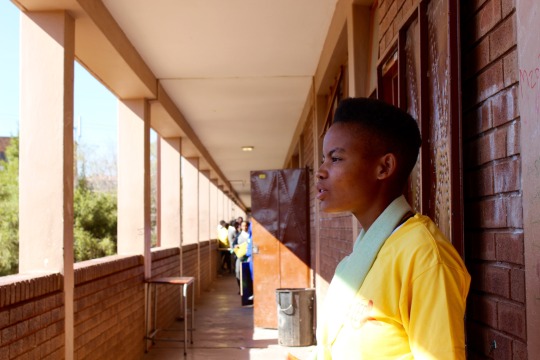
Esther Moila’s parents used to think she would “come to her senses.” After she came out as a lesbian in her teenage years, they held out hope it wouldn’t last. Her parents took action, forcing her to grow her hair long and buying her nice dresses — a sharp contrast from her usual T-shirt and athletic pants. They even attempted to arrange her marriage to a man from the Congo.
Moila’s parents adopted her from Kenya when she was 17 years old. She suspects her father, a pastor in the Alexandra township of South Africa’s Gauteng province, adopted her specifically with the intention of converting her.
“I had to live my life pretending to be something that I’m not, for the fact that I’m a pastor’s kid,” Moila, 21, said.
The more Moila resisted her parents’ efforts to change her, the more they berated her for her decisions. They told her that by dating women, she was refusing to serve God. They told her she had to set an example for the rest of the congregation. They told her that her sexuality would attract the wrong kind of friends.
“It has been so difficult for me,” Moila said. “It comes to a point when it breaks me. I think, ‘They don’t love me.’”
Moila’s experience coming out and living as a lesbian in South Africa — dubbed a ‘Rainbow Nation’ by former Archbishop Desmond Tutu after Apartheid came to an end — has been challenging in many ways. South African LGBT people often experience discrimination from their family members, friends and even passersby on the street.
“We get so scared what’s really going to happen to us,” Moila said. “Most people don’t really love seeing lesbians and gays just chilling. They become violent.”
The laws
The end of Apartheid brought democracy to South Africa for the first time, and with it came new laws to ensure the protection of LGBT people. Many considered these laws far ahead of their time.
The Constitution of the Republic of South Africa, adopted in 1996, was the first in the world to prohibit discrimination based on sexual orientation in its Bill of Rights.
Over the course of the next decade, the South African LGBT community won additional legal battles, like overturning sodomy laws and gaining new adoption and health care rights. In 2003, it became legal for South Africans to officially change their gender on government documents. Three years later, South Africa became the first country in Africa to legalize same-sex marriage.
CHART: How do you describe your sexuality?
But LGBT life in South Africa is paradoxical, said Jay Matlou, a master trainer and health officer at the South African LGBT rights organization OUT.
“In South Africa, we’ve got the most amazing, progressive laws that protect LGBT people for being who they are,” Matlou said. “But when you get to the ground, those amazing, progressive laws aren’t necessarily translated.”
At OUT, Matlou works as a counselor for LGBT people. He also leads various campaigns to provide resources to LGBT people and educate South Africans about sexual orientation and gender.
Matlou said LGBT people face two great challenges living in South Africa: physical and verbal violence and poor access to public services.
“When you try to go and access a health care service, we have research that shows that some people get denied services, or some people get treated badly because they’re LGBT,” Matlou said.
“Victimization is a very concerning thing,” he added. “Generally, South Africa is quite a violent society...because of what the country’s been through. We’re quite a young country, in terms of democracy. We’re only about 25 years old.”
Matlou said that while it is challenging to be homosexual or bisexual in South Africa, it can be even harder to come out as transgender.
“Trans issues actually are where gay issues were about 20 years ago,” Matlou said.
Matlou suspects that the gap between South Africa’s progressive LGBT laws and its culture comes primarily from a lack of education. Even with the emergence of an educated and more progressive younger generation, the older generation — raised during Apartheid and largely unaccepting of LGBT people — lives on, and inhibits progress.
With every accepting member of society in South Africa, and with every legal triumph for the LGBT community, there seems to be another act of violence committed against an LGBT person.
“It’s a two-steps-forward, one-step-back kind of thing,” Matlou said.
‘Why can’t you support me?’
Last month, Moila dislocated her shoulder playing soccer. To her dismay, the injury took her out of all practices and games. Her team, the Bluebirds, would have to play without her for a full month.
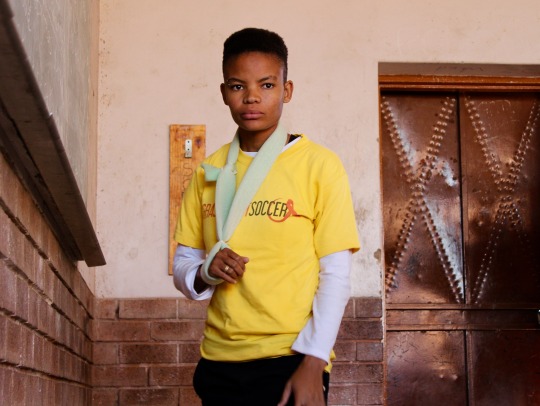
When she got hurt, Moila’s partner, Carolyn, temporarily moved into her apartment to take care of her. She helps her accomplish everyday tasks like cooking and cleaning.
In September, Moila and her partner will celebrate two years together. Their anniversary comes on the heels of a recent proposal — Moila’s partner bought the couple matching gold rings with each other’s names engraved on the inside, symbolizing a lifelong commitment to their partnership.
Their relationship, though lasting, has been far from easy.
“My girlfriend’s mom, she’s homophobic,” Moila said. “Sometimes I tell her, you just need to choose your mom over me. Let me be by myself.”
“But at the end of the day, you realize you love her,” she added. “You just have to push through until the right time comes.”
Walking on the road in her home township of Alexandra, Moila is often stopped by men who demand her phone number or taunt her by saying, “You know you’re a girl, right?”
If she’s not careful in her responses, the verbal abuse can become physical.
“You either ignore it or something happens,” Moila said. “It becomes so painful when we see our brothers, our sisters, being killed, being raped, being violated, just because of who they are.”
“Some people hate you to such an extent, they’ll really show it,” she added. “They’ll throw stones at you when you’re walking. Why? Why do that to me?”
CHART: Is same-sex sexual activity morally wrong?
The worst part, Moila said, is that her parents have never protected her from the abuse.
“People, they talk so badly about me, and you took me in knowing I’m like this,” Moila said. “I feel like, now you’re going to let people crucify me with their words?”
“I want to bring a woman home,” Moila added. “That’s it. Why can’t you support me?”
Sometimes, young lesbian girls from Alexandra will approach Moila and ask her for advice: When should they come out? What do they tell their parents? How will their sexuality impact their lives?
“It’s so difficult when they ask us questions,” Moila said. “Because even us, we’re still facing that. I don’t want you guys to face the same pain I had, because the possibility is that you guys are going to be disowned, you’re going to be thrown out of the house, because of who you are.”
“I don’t know, it’s difficult,” she added. “It’s really difficult.”
Living in secrecy
Recently, Shawn Sohab found himself digging through boxes of old memorabilia in his childhood home. In his search, he found a letter from his mother addressed to his uncle. The letter was written more than 20 years ago, when Sohab was just a child.
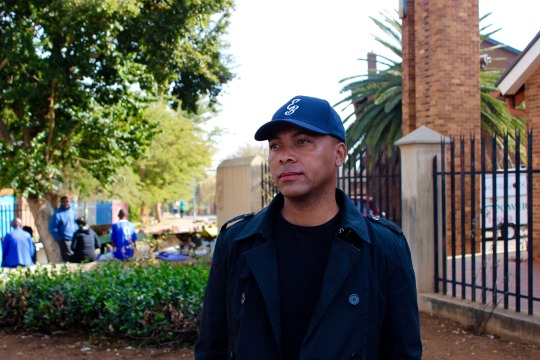
It was mostly small talk — Sohab’s mother wrote that her family was doing well. Each of her five sons was healthy and happy.
But Sohab, she wrote, was “a bit gay.”
The letter took Sohab, now 32, by surprise, because to this day he has never formally come out to his mother. He’s brought partners home to meet his family, but he always described them as close friends or roommates.
“When I read it, I was like, ‘Oh, she knew all along,’” Sohab said.
During his childhood, Sohab said his mother thought he had “bad spirits” inside him. She sought help from their pastor, who performed two exorcisms on Sohab while he was still a child.
“When you try to come out, coming from a religious background, you will be told that gayness is a sin,” Sohab said. “They believe that I’ve got a demon, that that’s not me.”
“When I was growing up, when I came out, I remember I was fighting my feelings because of church,” Sohab said. “I saw a whole lot of people being gay-bashed, people being exorcised, a whole lot of things happening to them when you start saying you’re gay.”
Outside his church, the unfriendly culture for LGBT people persisted. On the streets of his home township of Soweto, Sohab faces constant name-calling. To him, it feels like once people know he’s gay, they stop taking him seriously.
“When you say you’re gay, they put a stigma to you,” Sohab said. “They see you as a half-human. … When they know about your sexuality, they see you as a lesser man.”
Sohab said younger people usually accept his sexuality. He faces more discrimination from older people and people from rural areas. It’s common for people from rural areas — even other countries like Kenya and Zimbabwe — to move to Soweto for work, at which point they have trouble adjusting to the diverse culture of a city.
“When they come here, they come still with that mentality of them not...accepting the minorities of the bigger cities,” Sohab said. “They want to bring that element they grew up with from the rural areas and bring it here.”
There are many LGBT people living in Soweto, Sohab said, but discrimination often forces them to live their lives in secrecy. This makes the Soweto LGBT community look much smaller than it actually is.
Sohab said there are three stereotypes of gay men in Soweto: the “feminine” gay men, who are completely honest about their sexuality and most likely to face violence and street harassment; the “macho” gay men, who are slightly more secretive about their sexuality, and the “after-nines,” who pose as straight men in society but have sex with men after dark.
“There’s a whole lot of men who are sleeping with other men, but because it’s not normal in society, they hide it,” Sohab said. “You’ll find that they are married, they’re having kids, but they’re still sleeping with men.”
“A lot of people, they’re scared of the stigma,” Sohab added. “If you’re a businessman, and they hear that you sleep with men, people are going to start changing and stop supporting that business.”
Sohab identifies as a “macho” gay man. He hasn’t come out to his family, and he prefers to keep his sexuality private except for his closest friends and his romantic partners.
“Most of the time, I even tell my friends, ‘When you introduce me, or when you talk about me, don’t say, ‘my gay friend,’” Sohab said. “I’m not your gay friend. I don’t sleep with you, so don’t use that term. I’m Shawn. My gayness is when I get romantically attracted to somebody. That’s when my gayness comes out.”
“At the end of the day, I’m Shawn. I’m a man. Take me like that.”
A lonely journey
Angelo King was 14 years old when he dropped out of school and started to experiment with drugs. He used cocaine and ecstasy regularly, and he used prostitution to fund his addiction.
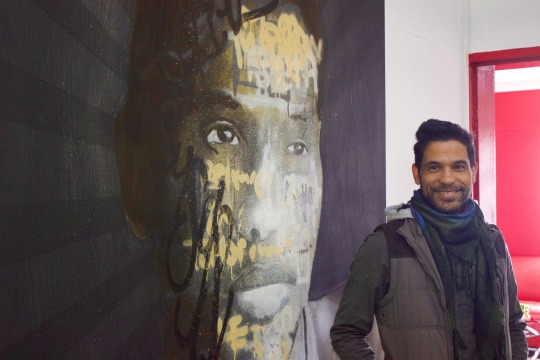
“I think it was a means of escaping the reality that you’re living in,” King said. “At the time, it was the thing I needed to do to survive.”
It’s no coincidence that age 14 — when King first began to experiment with drugs — was the same year he came out to his family as transgender. He told his mother that he intended to live the rest of his life as a woman.
“I didn’t really have a support structure where I could speak to someone about how I was feeling, and because of that I just made poor decisions,” King, 40, said. “The reality is that the homosexual lifestyle can be very lonely. I think as human beings, we all just need someone to be there. It’s not the same for everyone, but my journey was very lonely.”
CHART: Is breaking gender dressing norms “wrong” or “disgusting”?
King hoped he could fill his loneliness using drugs, sex and prostitution. If he had more support from his family and friends, he still wonders if he would have turned to those outlets in the first place.
He reached his breaking point in 2009, when he was 32 years old. His excessive substance use ended him up in the hospital, “half dead,” and the doctors told him they could barely revive him.
“Because of my habits and the bad decisions I’ve made, I almost died,” King said. “I needed to make a decision of what I would do, carrying on as a person.”
King asked himself: “How do I stop using? How do I take my sickness away?”
To maintain his sobriety, King felt he needed support from his friends and family. He returned to the gender he was assigned at birth and abstained from sex entirely. Since 2009, King has lived his life as a man — but it hasn’t been easy.
“The struggle is real,” he said. “It’s there every day, in front of your face, you have to make a decision.”
“It’s one of the biggest challenges in my life, trying to avoid this,” King added. “It presents itself all the time.”
Moving forward
Sohab believes that slowly but surely, the culture surrounding LGBT people in South Africa is changing. When he first came out, he said he lost friends who refused to support him.
“Since I lost those friends, a lot of them are coming back because they can see that I haven’t changed,” he said.
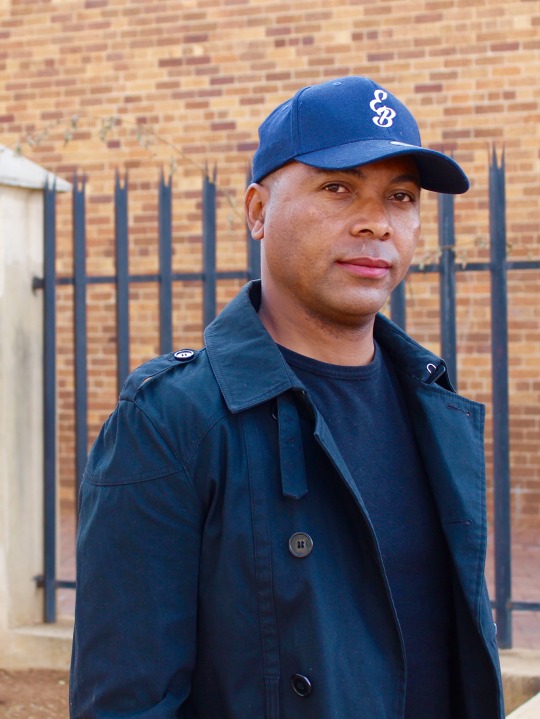
About three months ago, Sohab met a man named Oscar on social media. Oscar is from South Africa’s Free State province, and the two have been in a long-distance relationship for two months. Oscar often visits Sohab in Soweto, and the two spend long weekends together.
Sohab still hasn’t come out to his family — or told them about Oscar — but he feels comfortable with himself and his new relationship. Sohab hopes his comfort is reflective of growing acceptance of LGBT people in South Africa.
“For this new generation, we are now having a whole lot of gay people emerging, especially with this young generation,” Sohab added. “You’ll find that a lot of people are living their lives very freely here.”
“We have those that are supportive,” Moila said. “Mostly it’s elderly people that don’t really accept it. People our age, young people, they engage a lot.”
Moila said she feels most comfortable with her sexuality around the men on her soccer team. There, she’s found a group of guy friends who are “really supportive.”
“You feel like, ‘Oh God, at least for once, there are people who really understand me,’” she said.
For King, a new support system has emerged in his life since he entered his sobriety.
“My mom is happy with the choices that I’m making now,” King said. “I think we’re closer than we’ve ever been.”
In the back of his mind, King said he knows this support exists because he no longer identifies as a woman. Still, it’s a comfort to him that his family members, friends and colleagues now accept him.
Although Moila’s family still doesn’t accept her sexuality, she’s excited to continue her life with her partner.
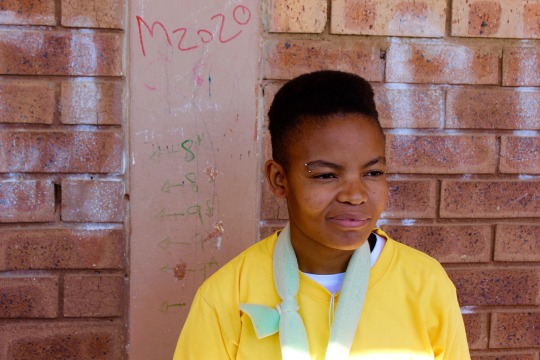
“At the end of the day, I fell in love,” Moila said. “If you really know what you want, and what’s your main goal, you’re just going to have that one person, where if I’m dying, we die together. At the end of the day, we’re going to build our future. We’re going to build our nest of love and be together. That’s it.”
“I’m dreaming big,” she said. “Even if there are no people there to see that.”
Writing and photos by Michaela Winberg.
#michaela#2017#south africa#lbgt#pride#temple university#winberg#social#michaela winberg#written work#news
0 notes
Photo

CONGRATULATIONS, CECE!
You have been accepted to play the role of MILES KENILSWORTH with the faceclaim of BILL SKARSGARD. Please create your account and send it to the main in the next 24 hours. If anybody at all told me that a paragraph sample based solely on a Starbucks order would win me over completely, I would have found it the joke of the night, but your capacity to place weight into the slightest details made my jaw drop. It is clear to me that you are an extraordinary writer and I feel honored to have received an application from you. Although there were two application for Miles, that I found equally suggestive and well-written, I believe it is you I wrote Miles for and that the role fits you like a glove. Words cannot express how much you impressed me — or perhaps they would have been able to, if written by your talented hand — but consider me hooked. I can already see that roleplaying against you is going to be an experience to remember!
OUT OF CHARACTER INFORMATION
Name and pronouns: Cece // she&her
Age: Twenty-two (22)
Time-zone: Eastern Standard Timezone (EST)
Activity level: The only limiting factors present currently would include my university studies in costume designing, interning at a theatrical company, and my participation in another roleplay group. With those regards, I would rate myself a 7.5 on a scale of 10.
Triggers: I do not have any triggers.
IN CHARACTER INFORMATION
TW: Mentions of depression, a parent figure leaving, emotional abuse, self-destructive behaviors, and death due to military participation will be discussed.
Desired character:
I am poetically driven.
It was an autumn day when I sat outside the campus dorms with my legs crossed over the patch of kicked grass. A bitter coldness reddened my cheeks as I fiddled over with the leather covering the notebook in hand. Pages flipped with the wind’s gentle breeze, and my unnatural, ebony hair sprang across against the red brick wall that supported my back. A mass of students strolled by carrying their belongings, stuffing hands into winter pockets, and they chatted about the upcoming film they planned on reviewing. My dark orbs only watched as they stepped over the cracks on pavements, and I noticed how lips would remain curved even when nothing enjoyable was being said. There was no joke. There was no flirting. It was just spoken vowels and consonants.
That’s when everything clicked for me.
Simple actions can inspire emotions. Little do we think about the impacts our daily words have on others. During my time in theater, working behind the scenes, I’ve realized that every word spoken on stage has a meaning. A play has the typical duration of one hundred twenty minutes. Time cannot be wasted, for there is a story to be told within a time limit. In life, I perceive the same to be occurring, for there is a story to be told within a time limit that no one is aware of. Any day could be our last.
Before this section turns into some ramble about how we, the people, interpret time, I will begin to explain how my perception of poetic devices allowed me to fall in love with Miles Kenilsworth. It has come to my attention in a recent ask from an anonymous taker that each name has been derived with a purpose. In Mile’s surname, worth is a word that can be drawn out. For a character who doubts his worth within the family, it is ironic to think the word can even be present constantly in his life. He does not even realize it. Perhaps through plots, one day Miles will take notice of the worth he has always possessed. His first name, Miles, alone serves a purpose in contradiction. My intention does not include calculating his net value in just a week of plotting. It’s going to be a long process—miles to be driven before we reach our destination of characterization. His name is ironic.
Poetry is ironic.
Gender and pronouns of the character:
Cis Male // his&him
Changes:
It would be an honor to use Bill Istvan Günther Skarsgård as a faceclaim for Miles. His face is very befitting for the role.
There are no changes to be made.
Traits:
SENSITIVE, TIMID, INTELLIGENT // Miles has always been considered the most sensitive amongst the family. His father would send cold stares when he was about to break into his timid natures that illustrated weakness in front of family associates. When he attended the private academy for his final years of studies, he would isolate himself, for there was the insecurity of the other boys shoving him to the side due to his weakness and easy breaking point. One could easily find the well-dressed man sitting at the quad with no company reading a book that no one could tell you about. Much of his acquired knowledge came from the print of various novels.
SELF-DESTRUCTIVE // I do want to mention that one important quality that I would like to explore for characterization would be his depression. His condition has not been diagnosed, nor has he been able to stimulate any concern on his mental health to such extremes. He does go to see a psychologist, but he mainly goes to see her to talk about the stress of his family and how he perceives that his power is being limited. It will be later with more sessions when he will realize that the constant despair and pressure he has been through for numerous years will correlate to a diagnosis of depression. His depression relates to the self-destructive attributes, for he does spark most of the pressures. He picks every little detail within every situation, and there is always a way to degrade his value. He can break down into nasty tantrums, and that would be a moment I would like to explore for a plot.
Extras:
(001) Diana has always been the kindest. During Sunday brunches—held on the third Sunday of every month—the two would escape into the corridor of the forgotten path for it took one to the room of thinking, a room with little to no inspiration leaving the mind to formulate its own. Diana was Miles’ younger sister. She was two years younger, and she was as gentle as he was. Often, the family would point the two out for being weak links belonging to the surname, and the pair would have to sit stiff at the table with no comments to be made, for that would be considered rude, and, then again, they were too weak to ever make a comment against their family. Hazel hues would travel across as a radiating smile danced across her blush cheeks and scarlet lips. She was innocent, naive, and the sister every brother would swear to protect no matter what. Holding her hand, Miles would listen to every word, for she was soft spoken, and her heart raced out every taunting emotion. “I’ll never let anyone hurt you,” he would caress, a hand running through her straightened hair. She was the sibling who he related with the most. Diana, him, and three older brothers. They all cared for Diana, but he was the one to be her guardian angel. Leaving her behind alone in the household, all brothers having attended or attending Oxford, he was saddened to do so. He did not want to leave her in a house where no one saw potential in her. He makes sure to call her every day, though.
(002) During his younger years, Miles learned to play the violin thanks to a private tutor he personally sought out. He would tell his father that he was part of the chess club after school, but the truth was that he would ride his bike across the country to a small cottage where an older woman would teach him the art of the violin. It’s in the cottage where he grew into his skin as a wide eyed boy who was intrigued by the great history of the classical arts and philosophy. The older woman, as well, had a son. He was a year older than Miles, and he would always lurk in the shadow as if watching in envy at the interaction between the Kenilsworth and his mother. Bitter vocabulary would be thrown at the male when the woman was not around, and Miles would only sit taking the hits with no reaction. Weak. The older boy would later be known as his first lover. No one ever forgets their first love, especially not Miles who was a hopeless romantic due to his connection with the arts and poetic perspective. In his dorm, there is a picture of the older man sitting on his desk. The lad is tailored in military garments, and it was the last image sent to him before he received news of his passing during war. Whenever anyone asks who the man is, Miles can only shrug and suggest the response that he was just a former friend.
(003) Due to his content admiration of the arts and the realm of free thinking, he guises his heavy fascination with the degree of Psychology, Philosophy, and Linguistics in order to appease not only himself but his family. The Kenilsworth are pleased that Miles concluded to study three branches of thinking, especially psychology, for they see great potential with such a degree. Glad to satisfy their demands, he also fulfills his own desires hoping to throw them all off for just a while longer.
QUICK FACTS:
a) Full name: Miles Turner Kenilsworth
b) Birth date: January 4th, 1997
c) Romantic and Sexual Orientation: Homoromantic and Homosexual
d) He only has one older brother still attending Oxford; his name is Samuel. The other two brothers are now professional workers; their names are Garrett and Benedict.
e) Their mother left the family shortly after the birth of Diana to wed another man after announcing that she was having an affair with him for two years. This explains one reason as to why the father is not truly fond of Diana nor Miles, for he speculates that they are not of his blood, but of the other man. That, though, is not true. They are both biologically Kenilsworth.
PARA SAMPLE
A bewildered crescent dwindled over the surface of the moon, pools of the forgotten stars further lost within the depth of the galaxy. In the darkness, a shadow looms over lanky positions sloped over the terrain of the unpaved roads. Anthropocentric hands print the dust of a destiny which calls for man to be the extreme leader of every facet of life. The world continues day by day to record the rich history of humankind: When have one ever paid a cent to read the daily paper for a story on a raccoon being glory? It’s always man manifesting the eminent executions shaping each passing epoch.
Man is power.
Hazel hues doze onto the mahogany table centered in the enclosed room. Beige walls, a painting of a man lingering on thoughts, flowers all calling to the plastic aesthetic, and there’s a crimson fabric draping over the half-opened window. The room is one many fear. A sense of familiarity, a sense of organization, a sense of common sense; they were all notional qualifications in the theory of Miles Kenilsworth. The room was daunting to any client who stepped over the boundary of admitting there is a wrongful digit in their series of codes. Pressing control+alt+delete was not rebooting the system, and blue screens flickered before his eye. Soon, he became tired of the loading, and he was in desperate need of an update to the software.
A woman sits adjacent with a tinge of anomalous overlapping her coal orbs. A seven second observation was all it took for Miles to fill the pages of her story. A young, naive immigrant with feet that could paddle the ocean blue for hours where the center of the world became her home. Ocean currents tilted her petite physique into a bending figure to play with, but a smile still sailed across with the breeze. Storm currents. Lightning strikes never made her flicker, and the bursting, roaring funnels of clouds never pushed her under the pressure—squeezing her lungs into collapse. She kept swimming, unaware of the mystic brutality underneath. She was naive unlike Miles who has shaken hands with Poseidon.
“What’s on your mind, Miles?” It was a question that traumatized the mind, for truth ventured over into a quick minute advertisement. No subliminal message went unseen. Truth: Nothing was on his mind. Curse the child for ever being preoccupied with the silly doodles of the perfect life. Curse the child for ever being polite to authoritative parents who only tugged on his polo collar. Curse the child for never listening when they told him that life is a set of expectations to oblige. Curse the child for tiring out his core, the fuel out of maximum; curse the child for falling off the tracks that he no longer had a thought to process. What would be the point?
Averting his focus upward, a chill shuffled to take a seat beside the twenty year old. Brushing fingertips, the pale male stiffened as his coffee stained lips drenched into a flat line. His foot tapped. His mind was now racing on what to say. Any other would ask the question, and he would riddle a faulty statement, but, with the therapist, he told the truth. If he could admit to himself that he needed guidance, he might as well accept the guidance. That was logical.
“The barista delivered me a French Vanilla Latte when I ordered a Triple, Venti, Half Sweet, Non-Fat, Caramel Macchiato.”
Little did the therapist note on her notebook that the response was more than just a filler to avoid the question provided. He did answer the question: Even the barista ignores my power.
0 notes